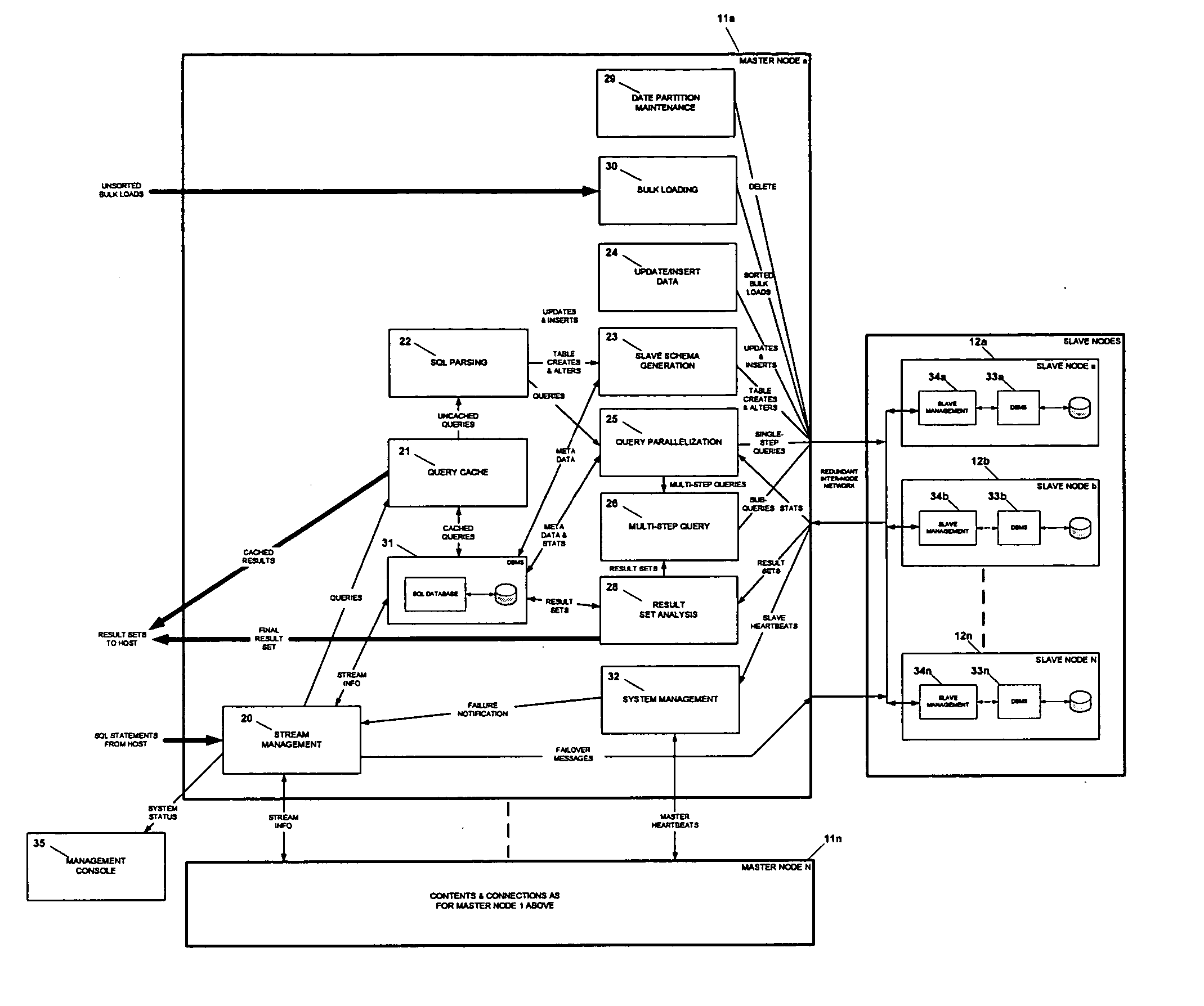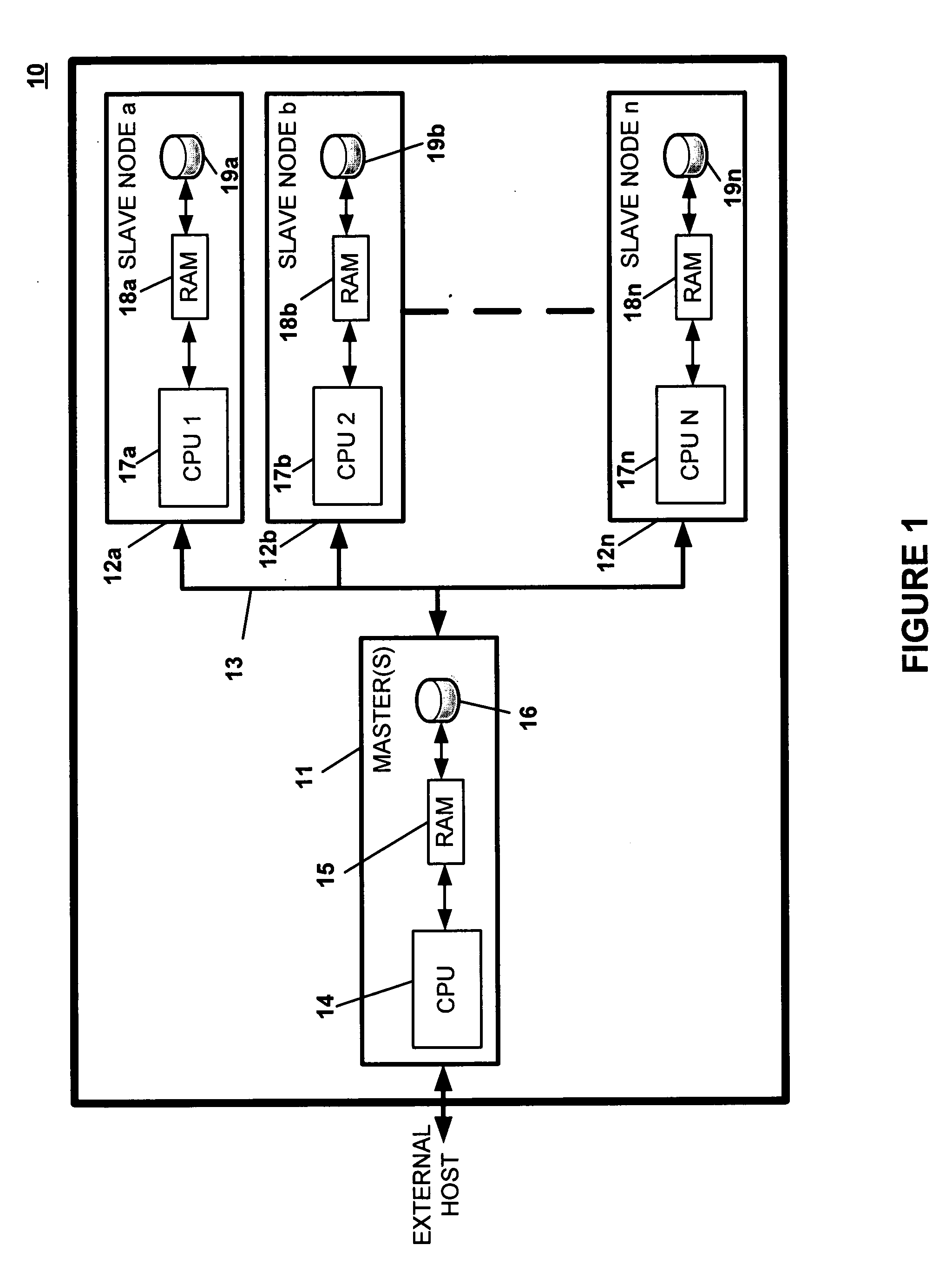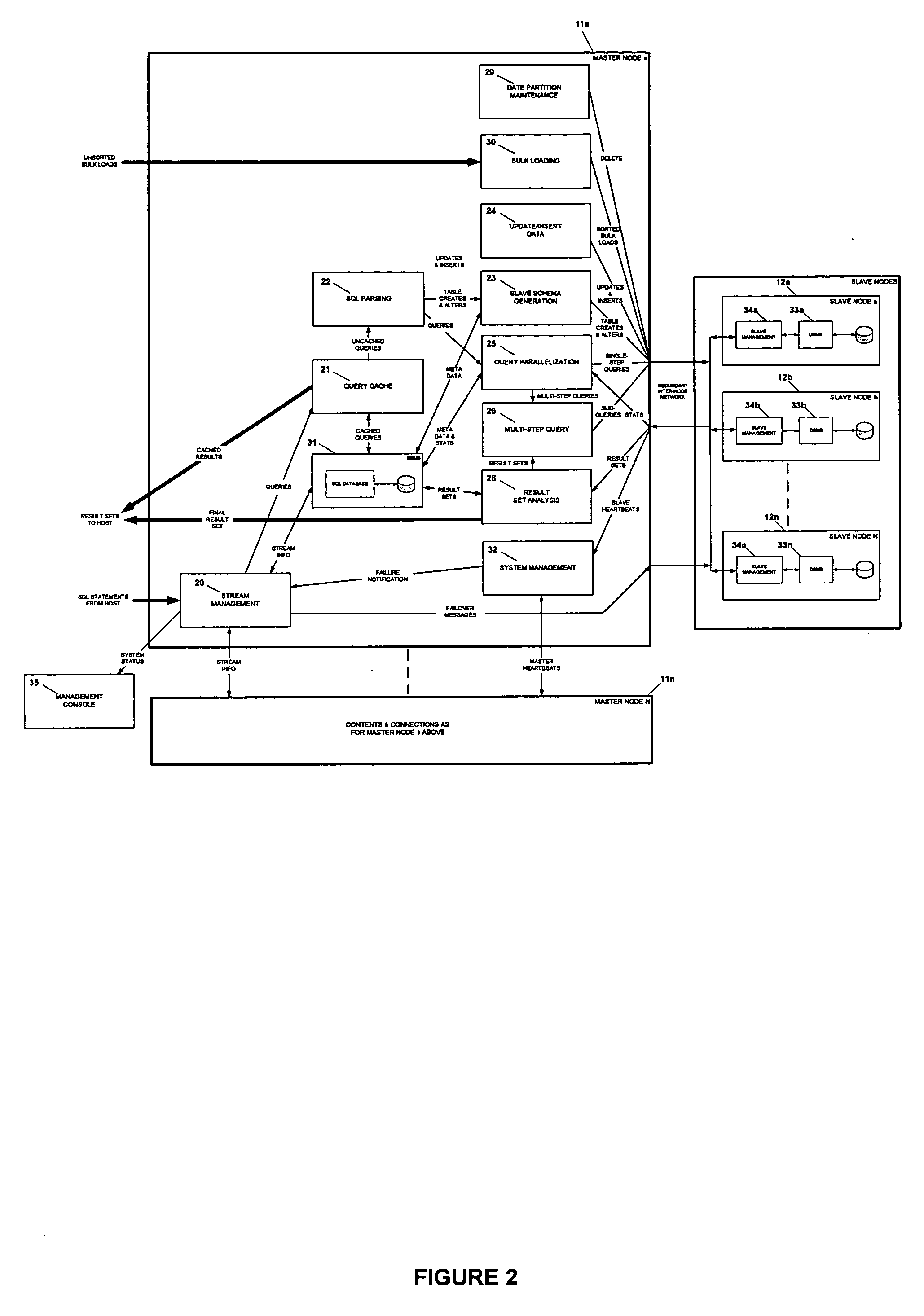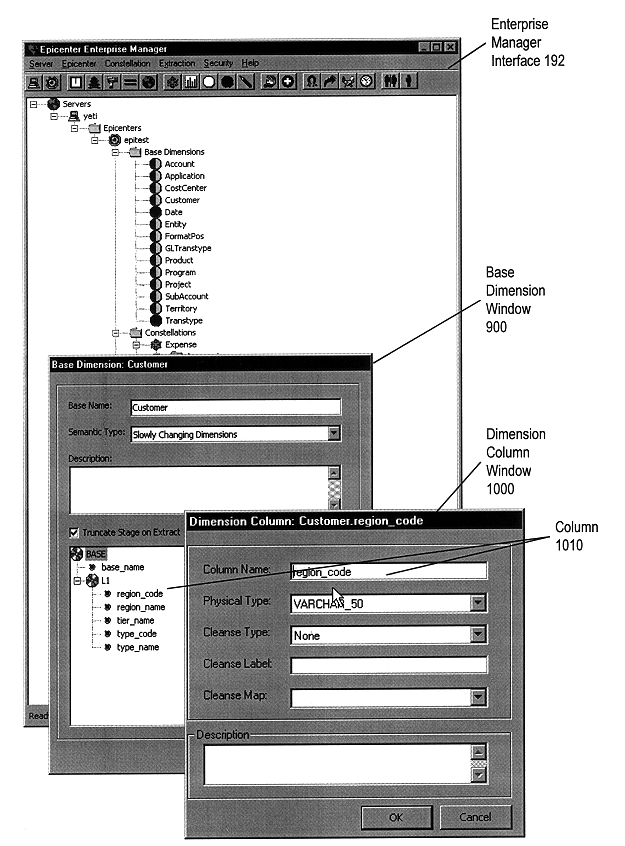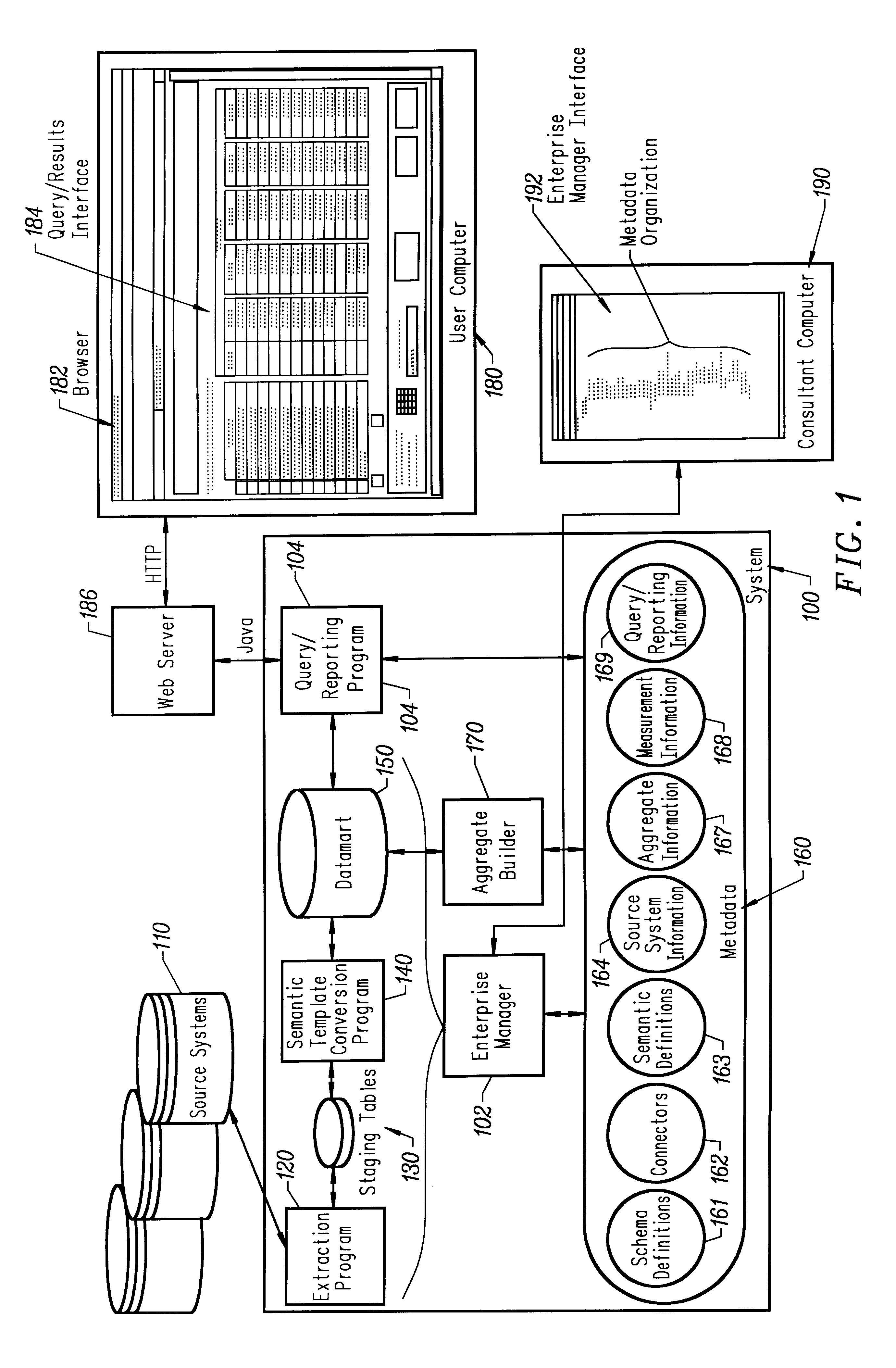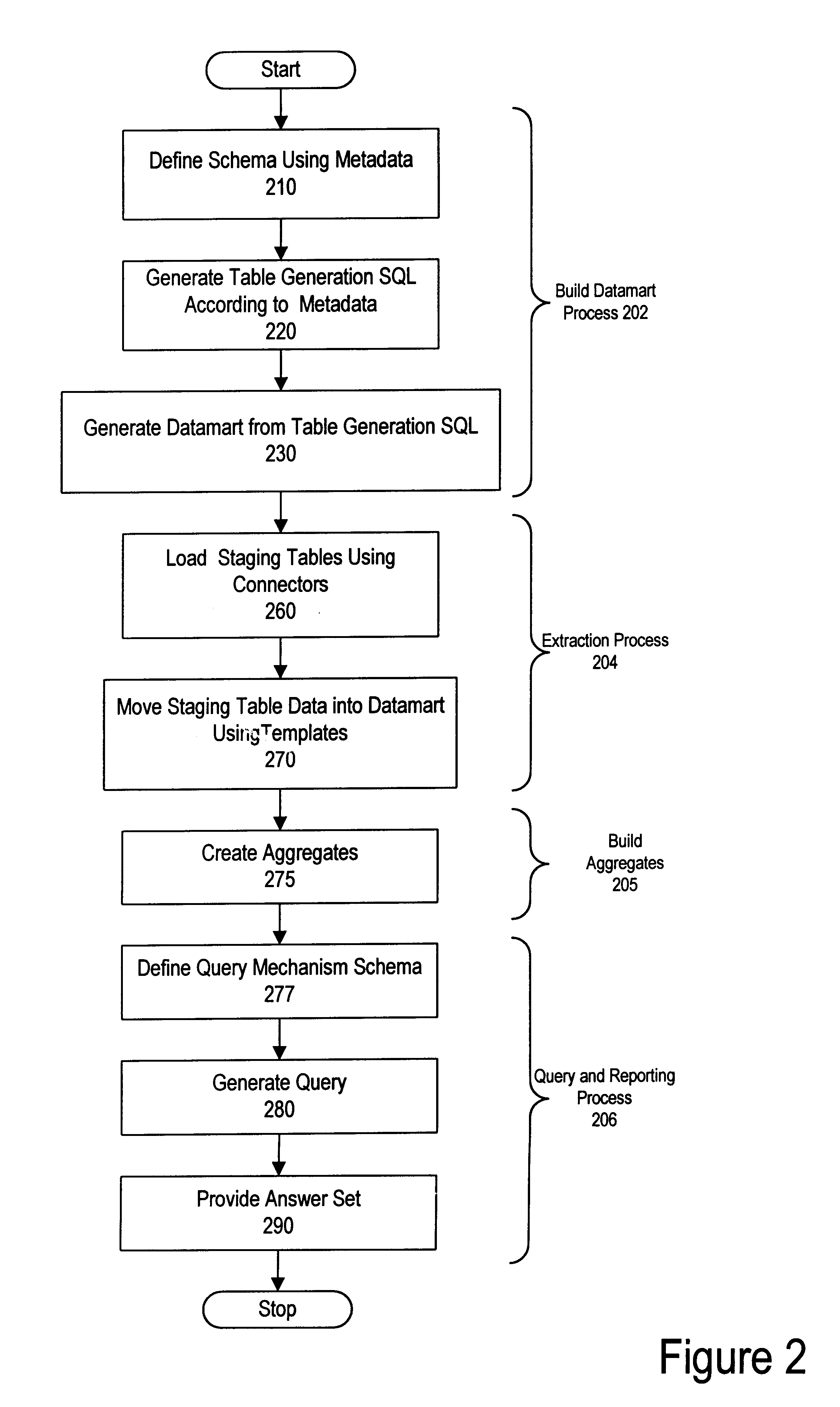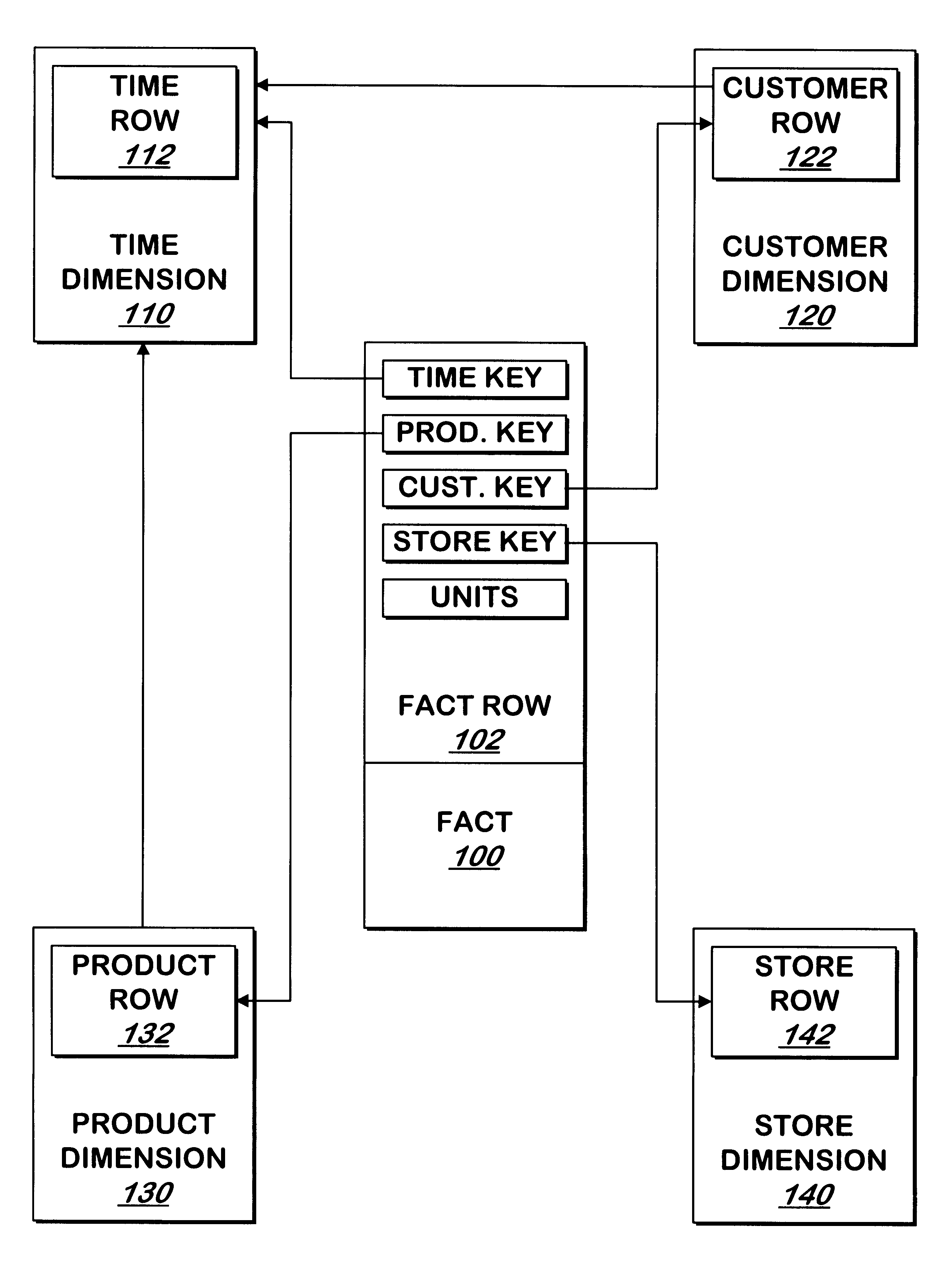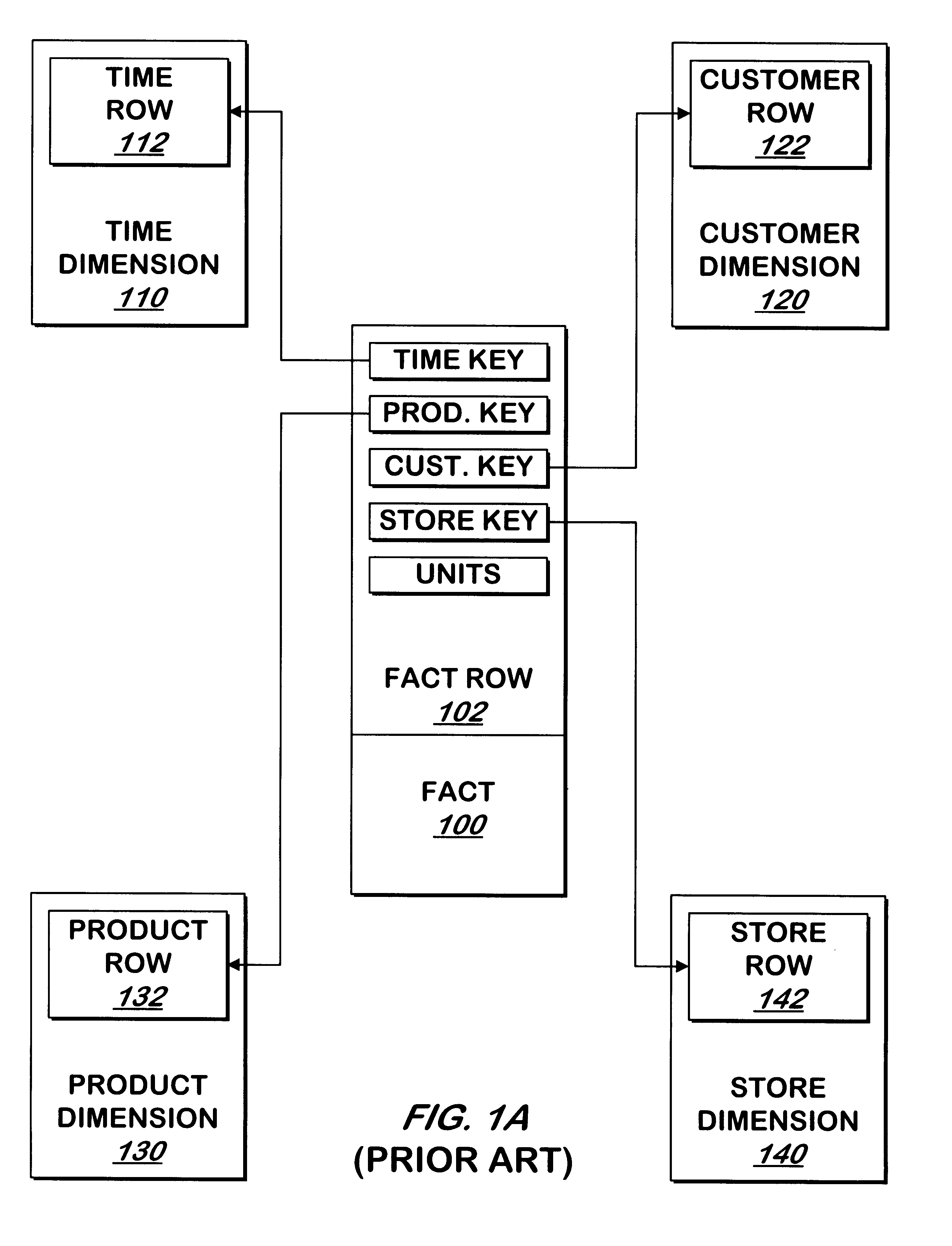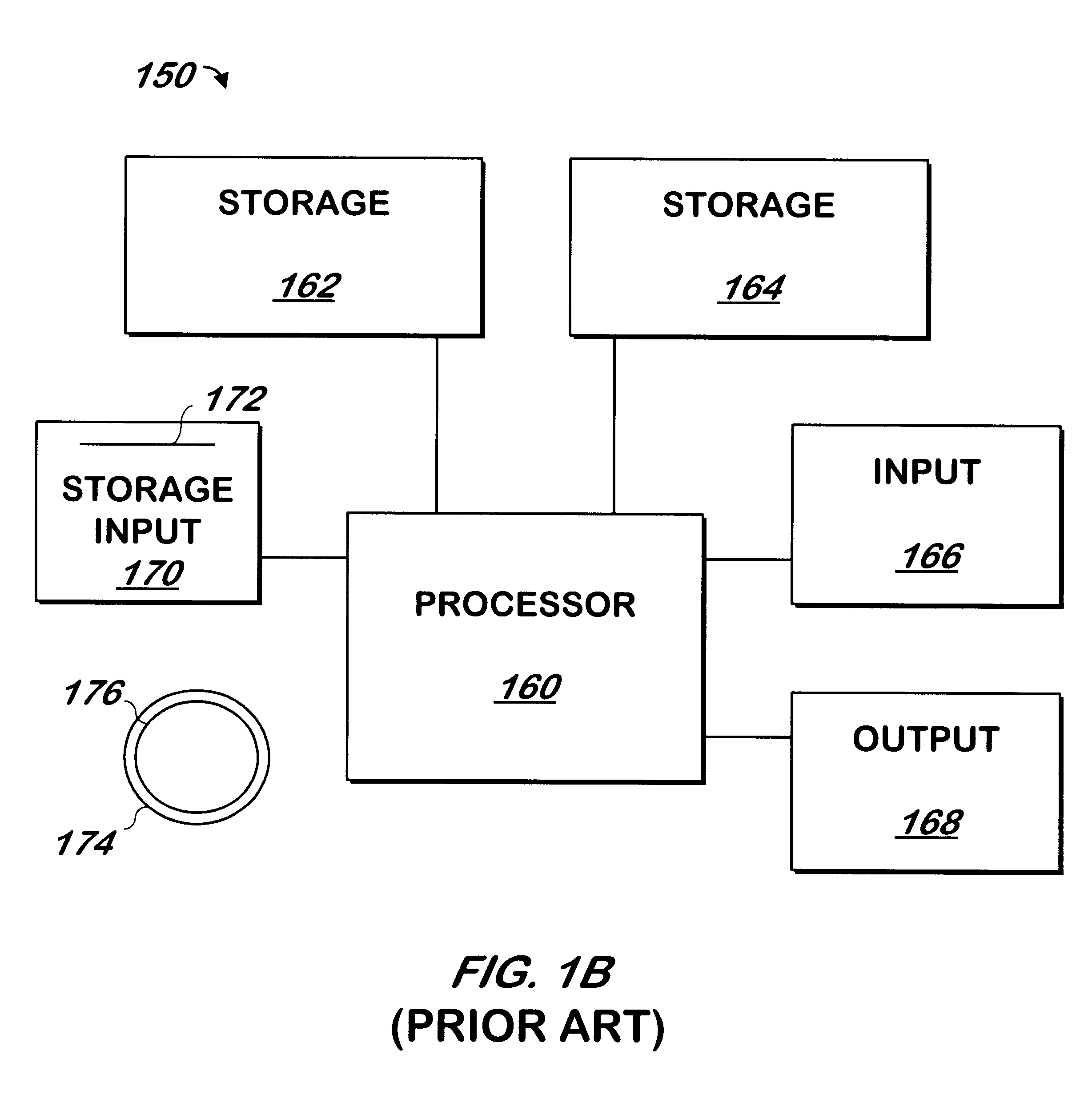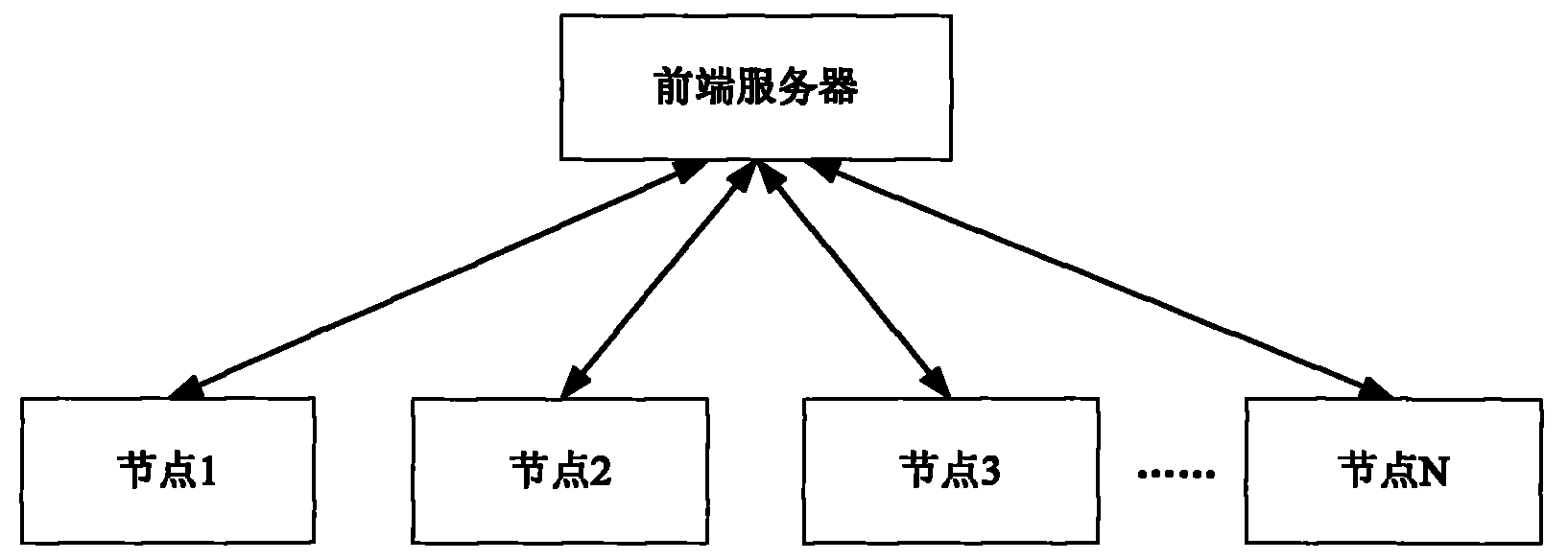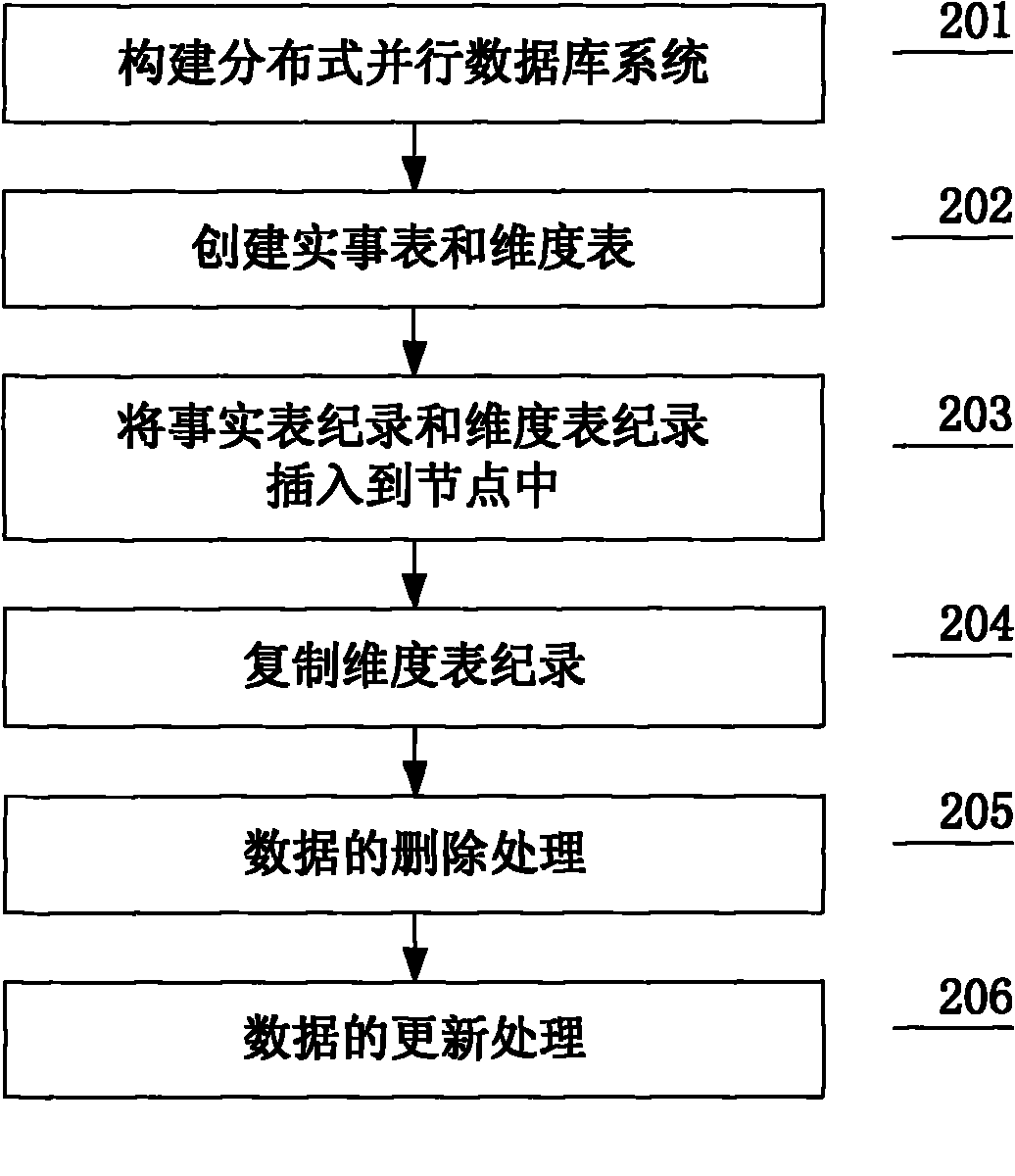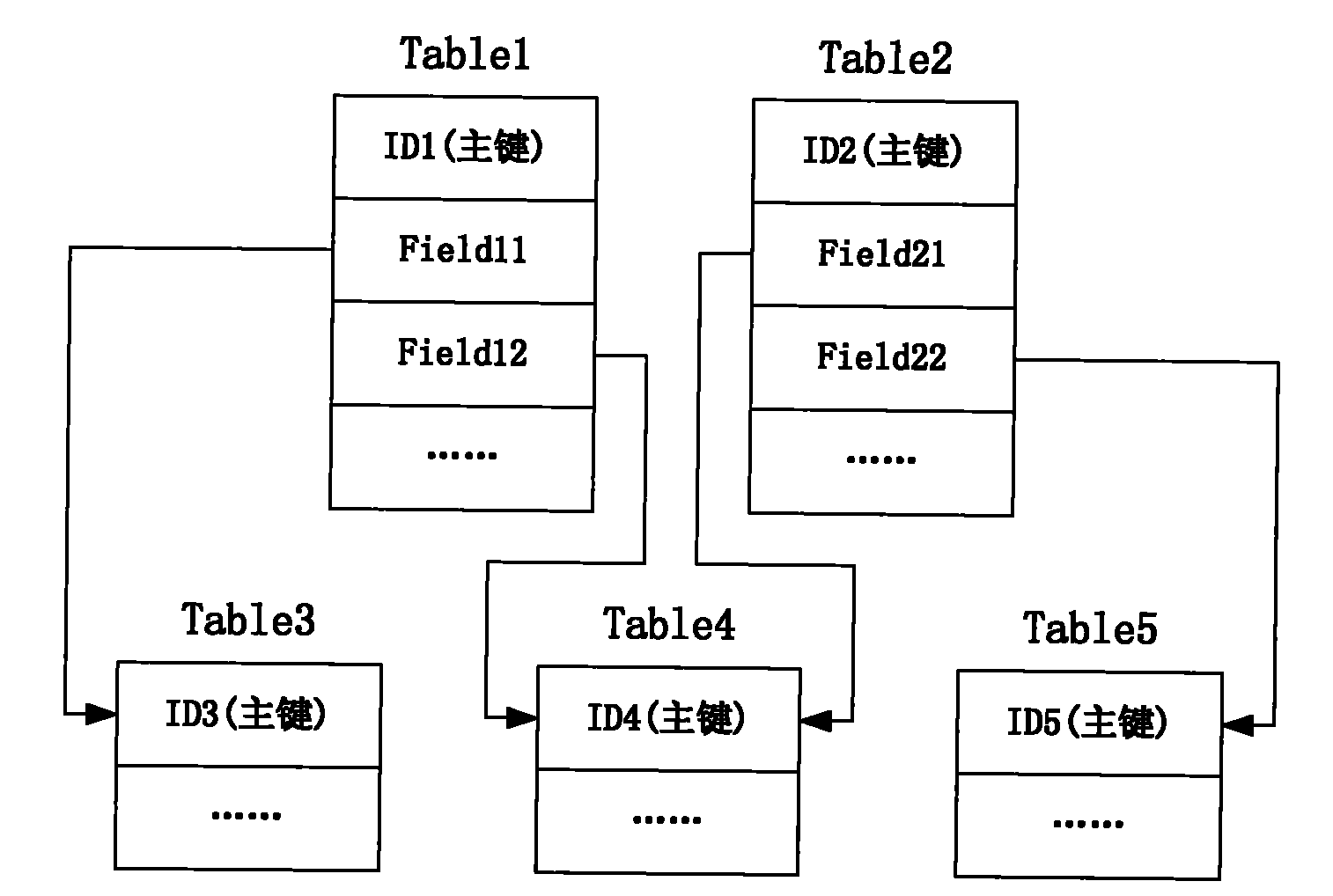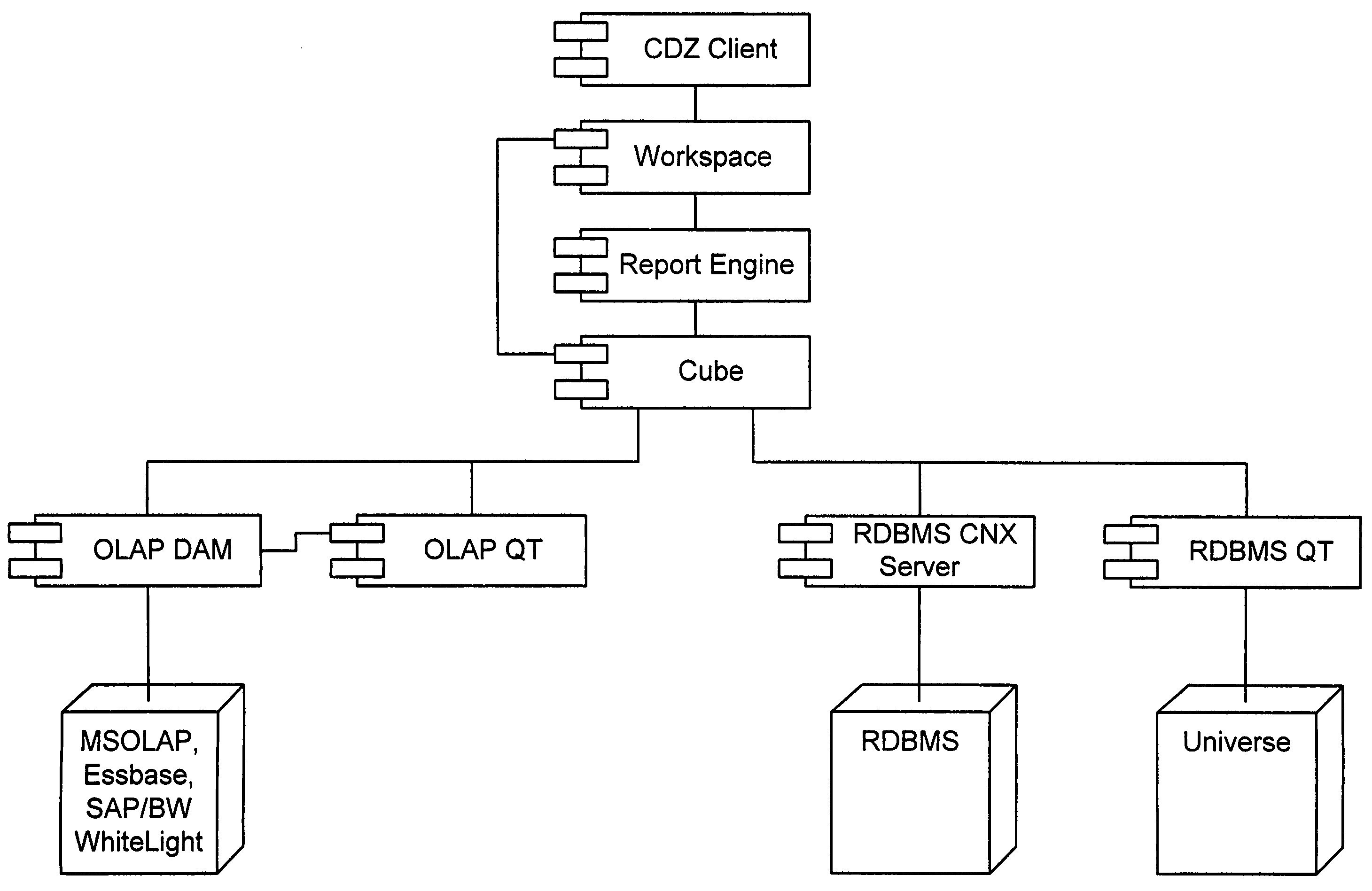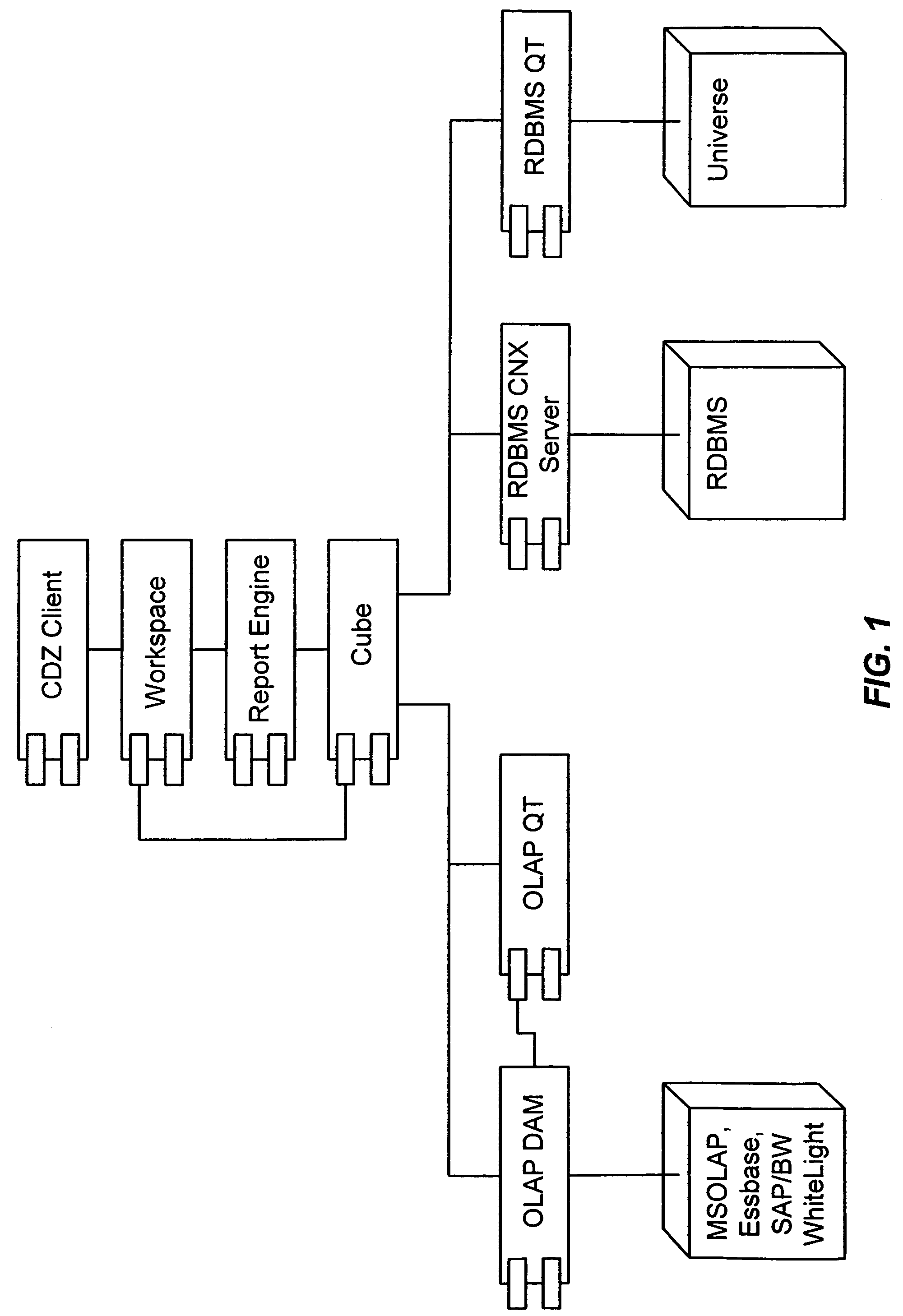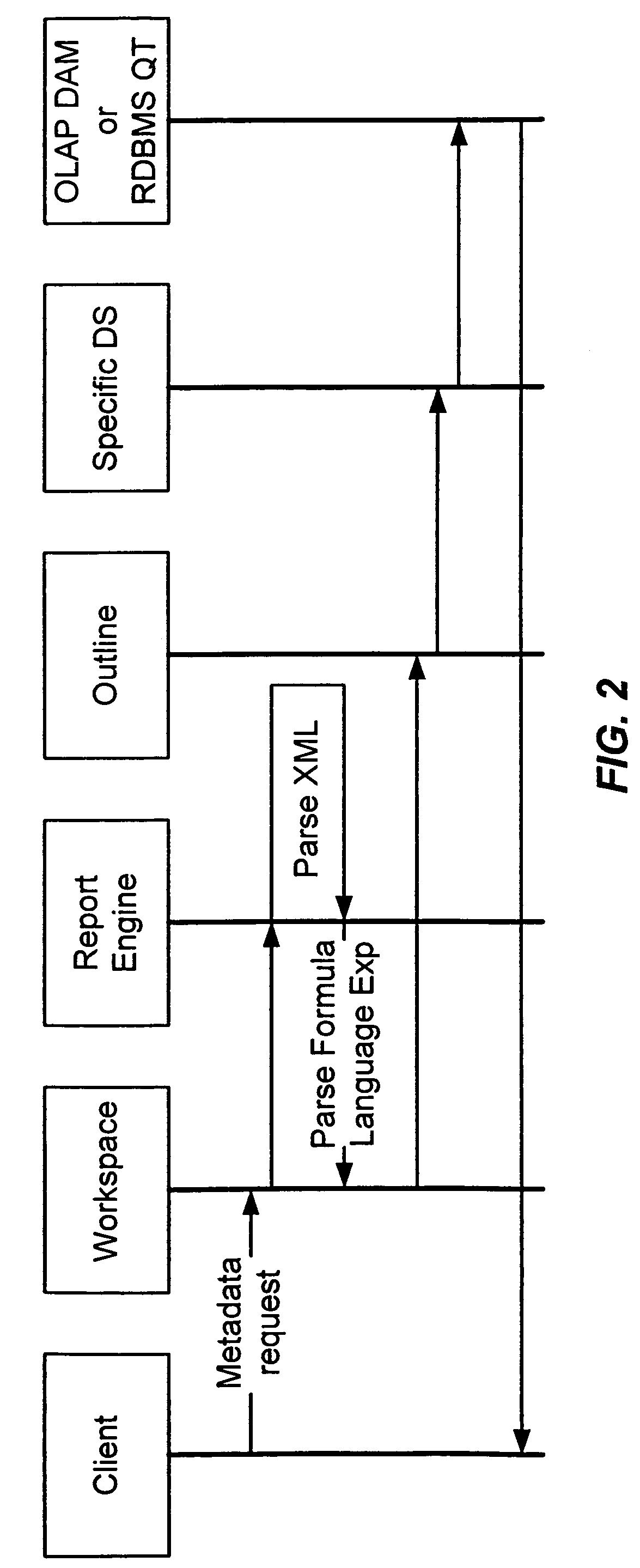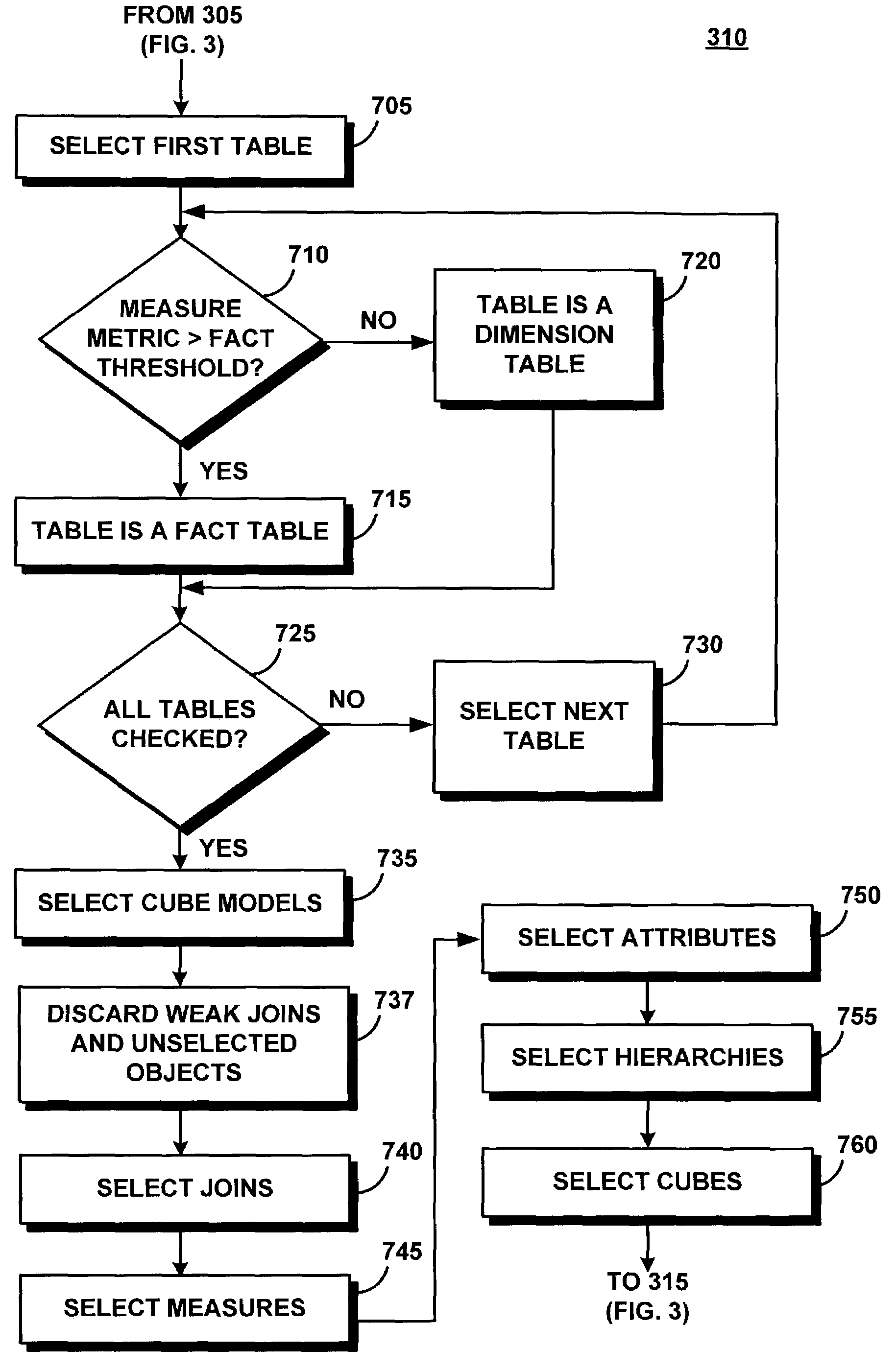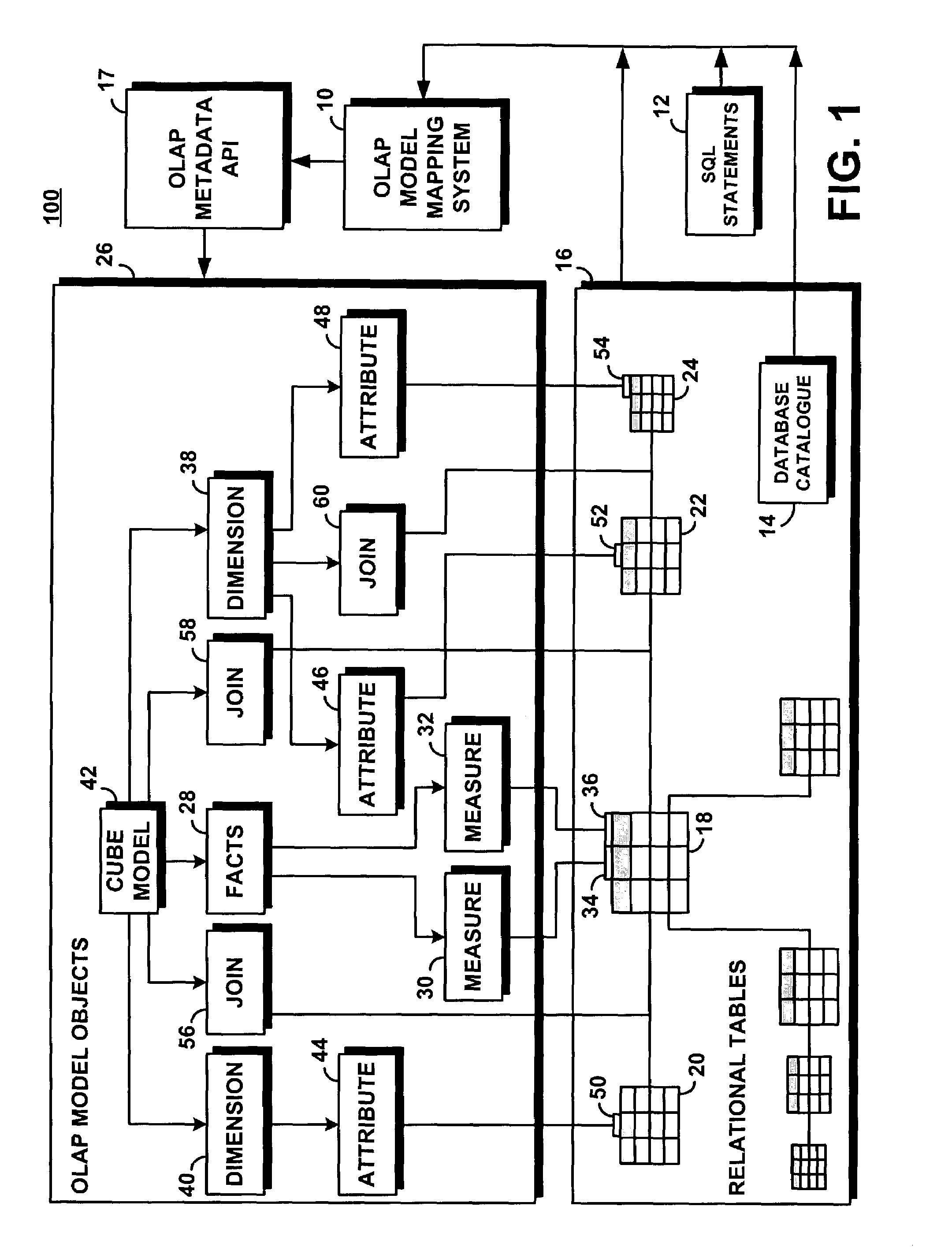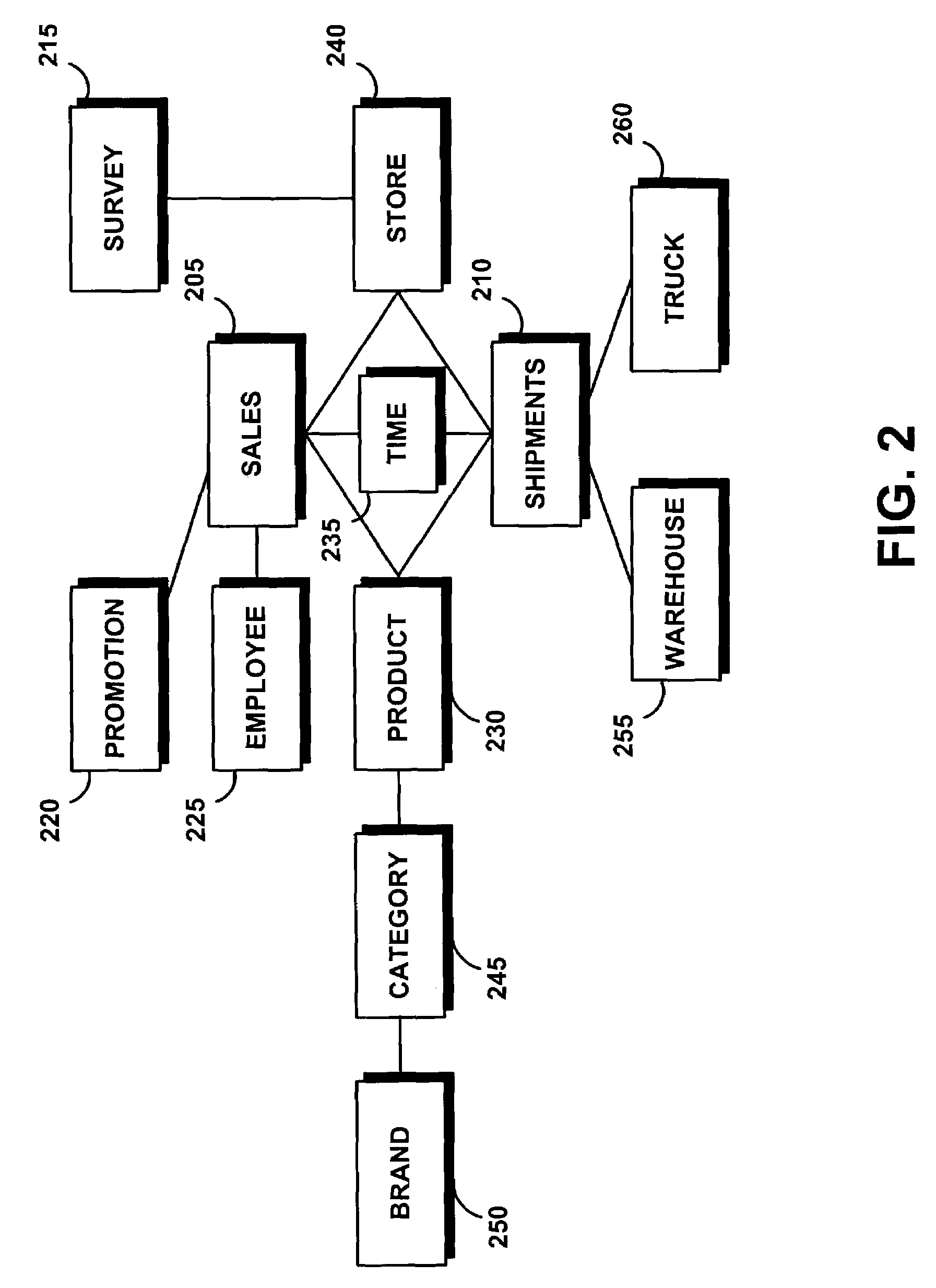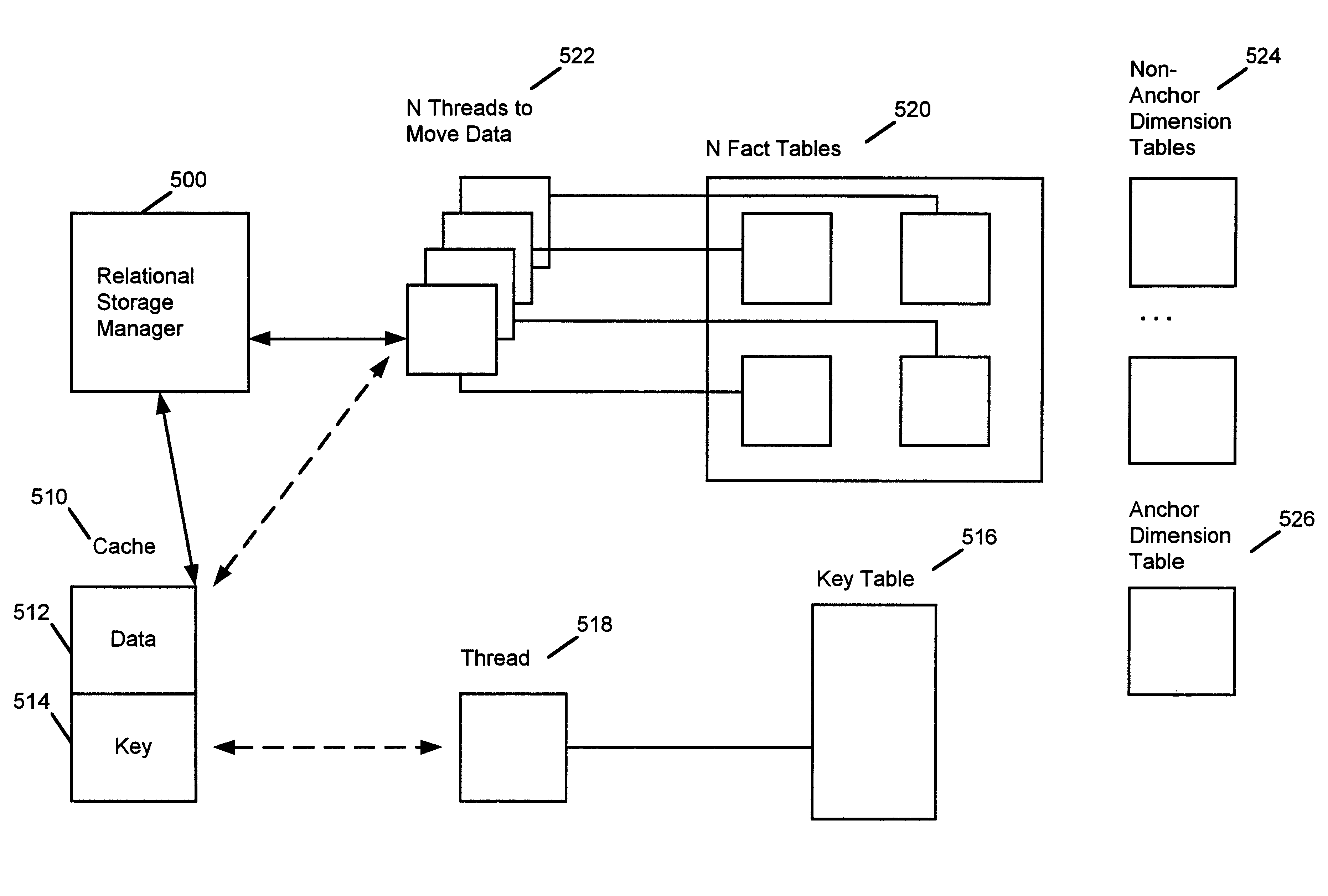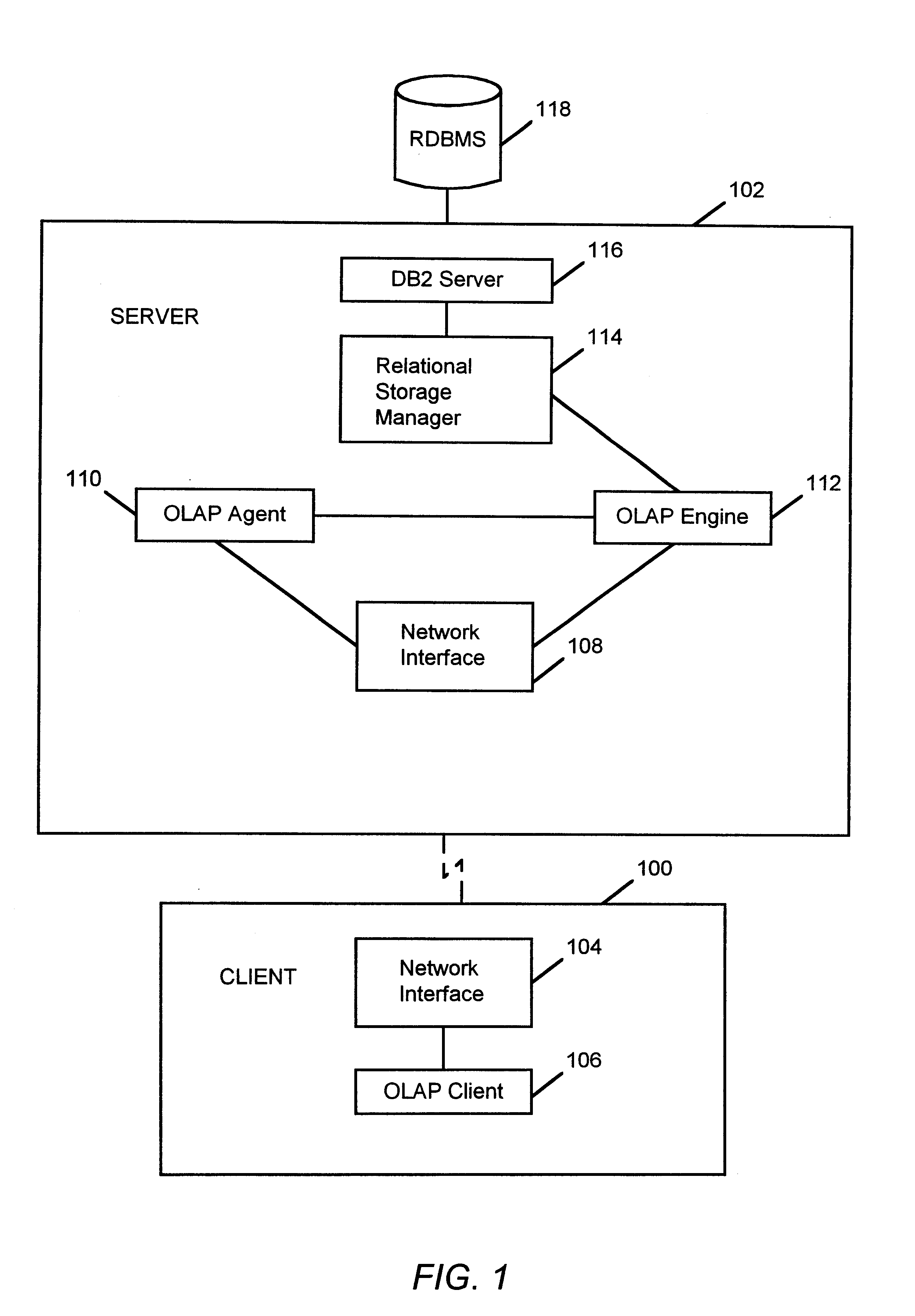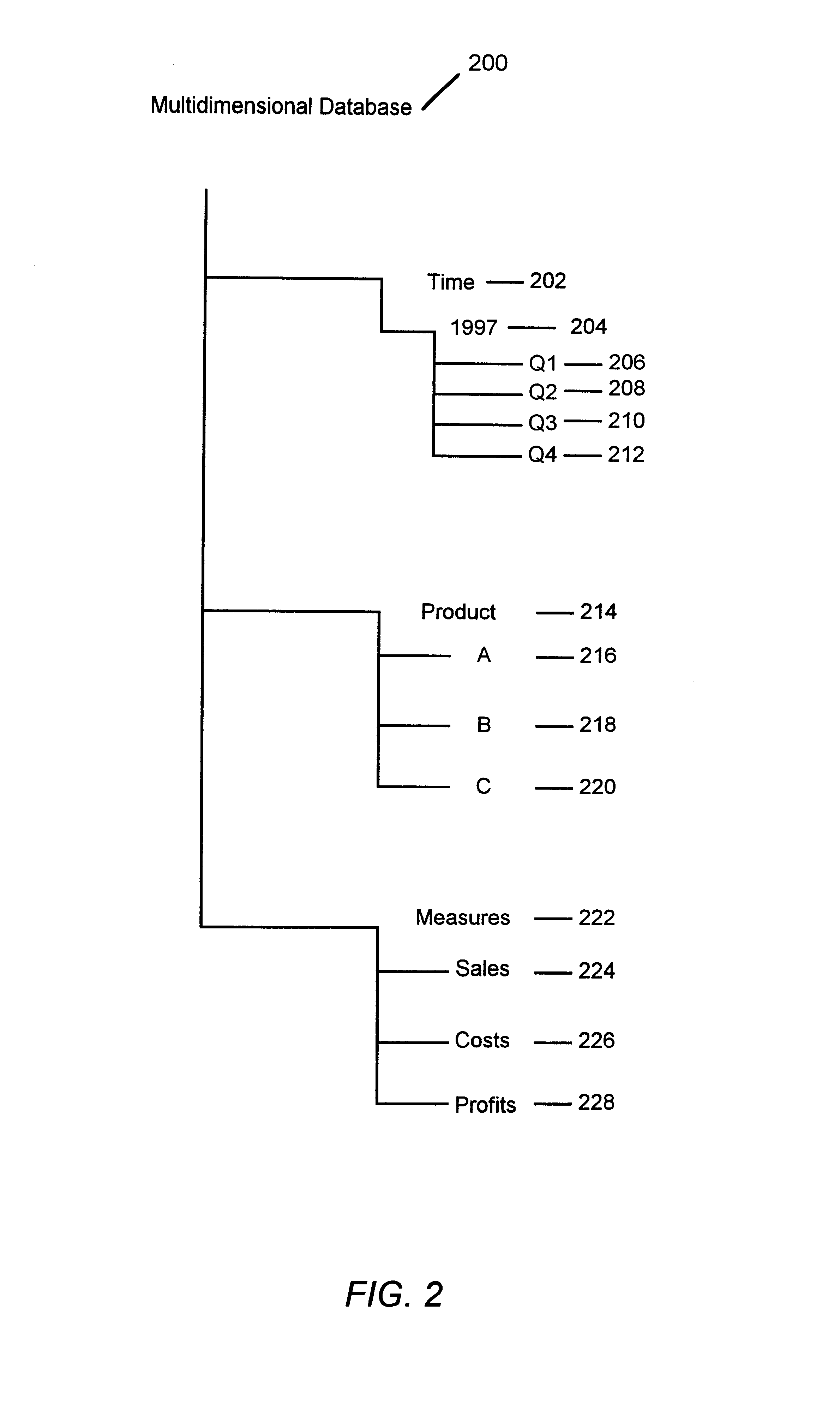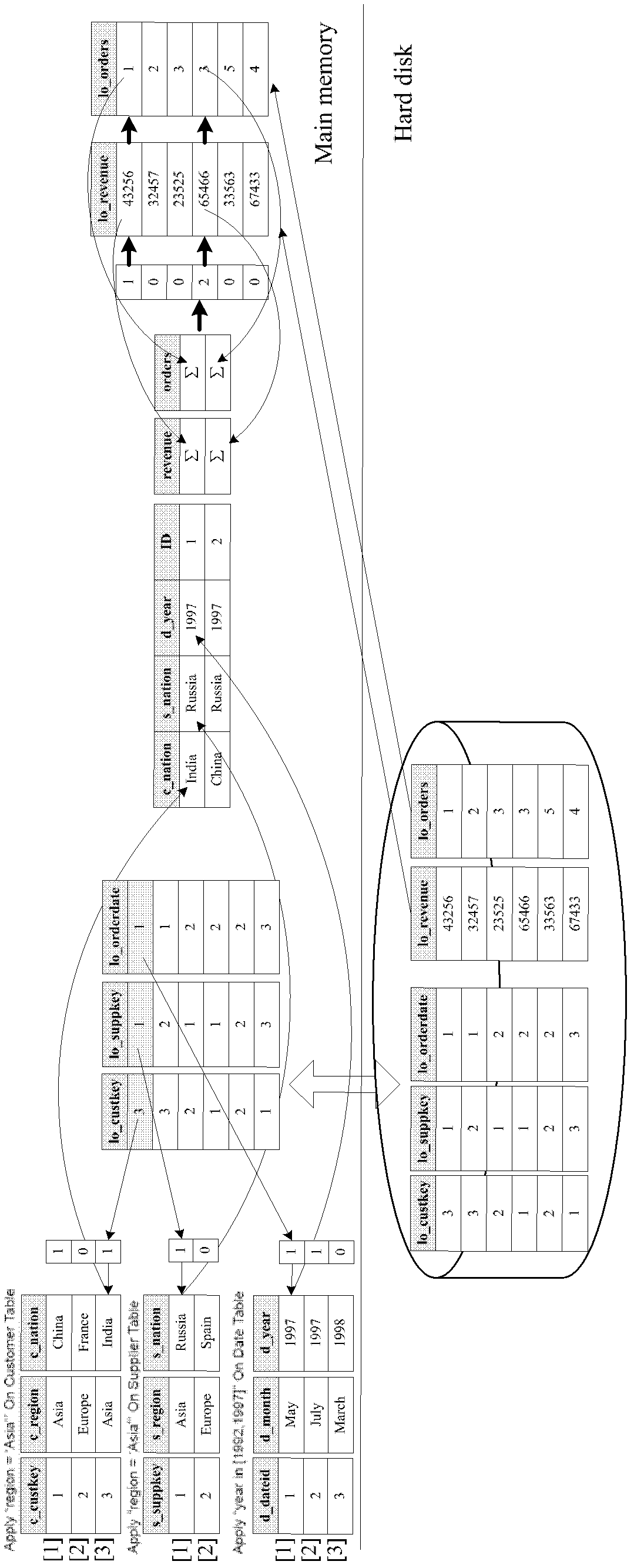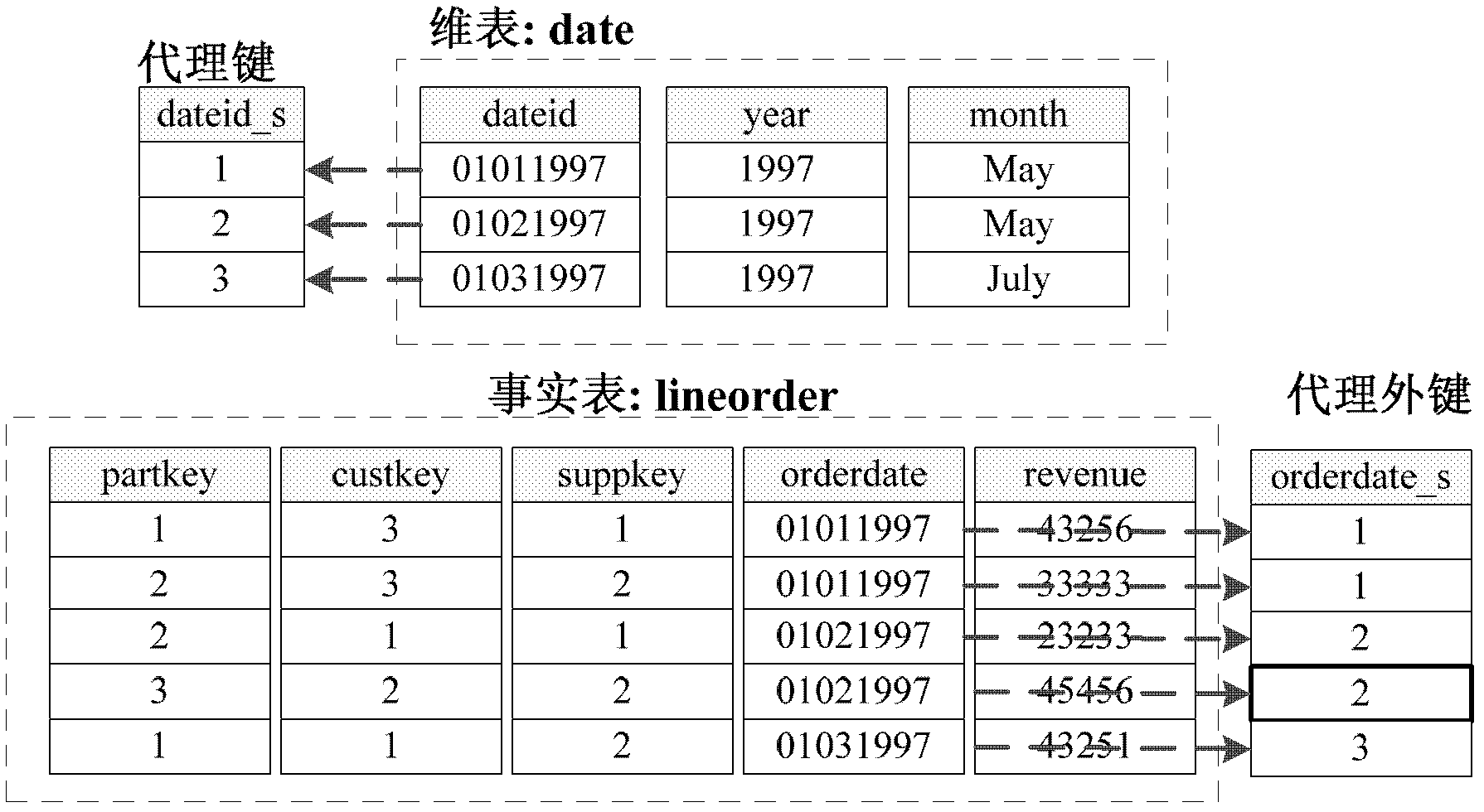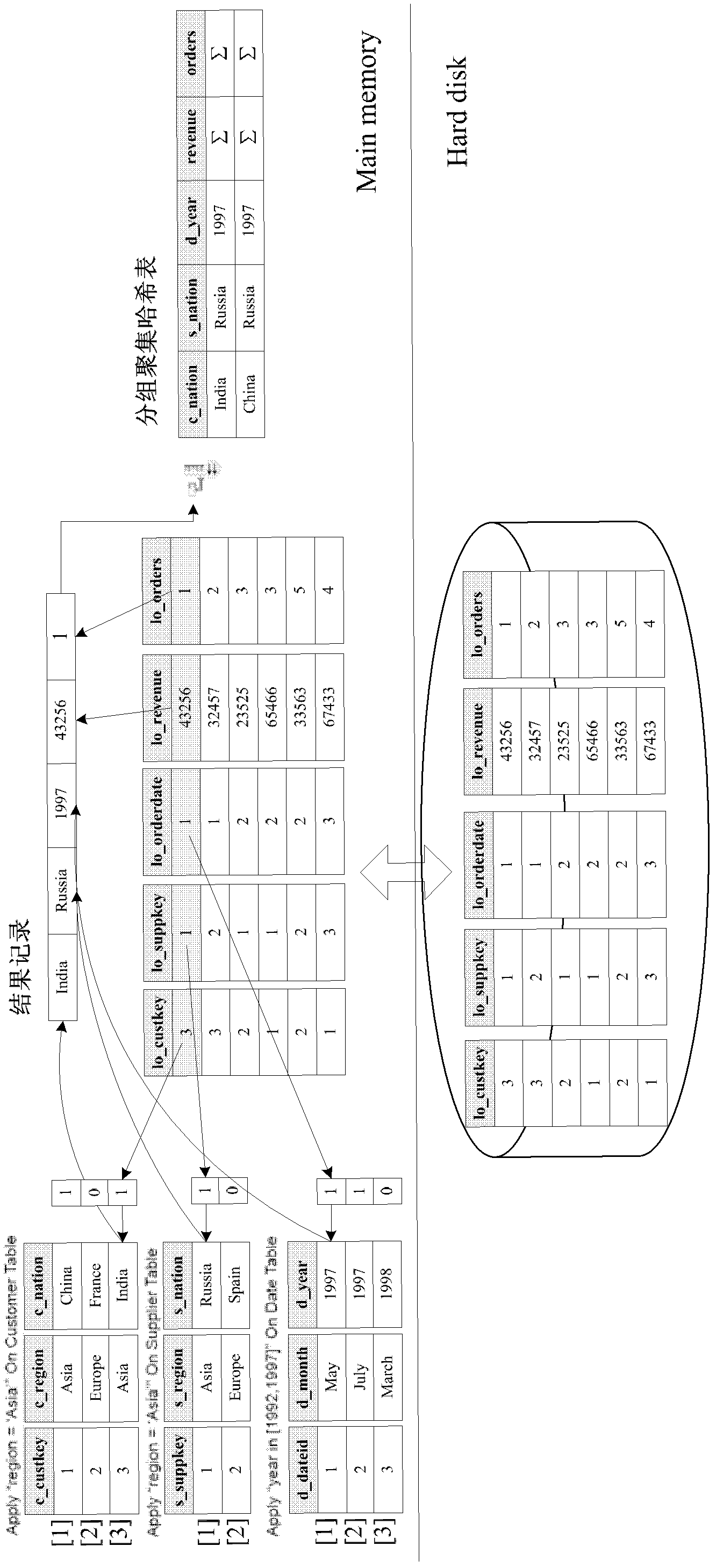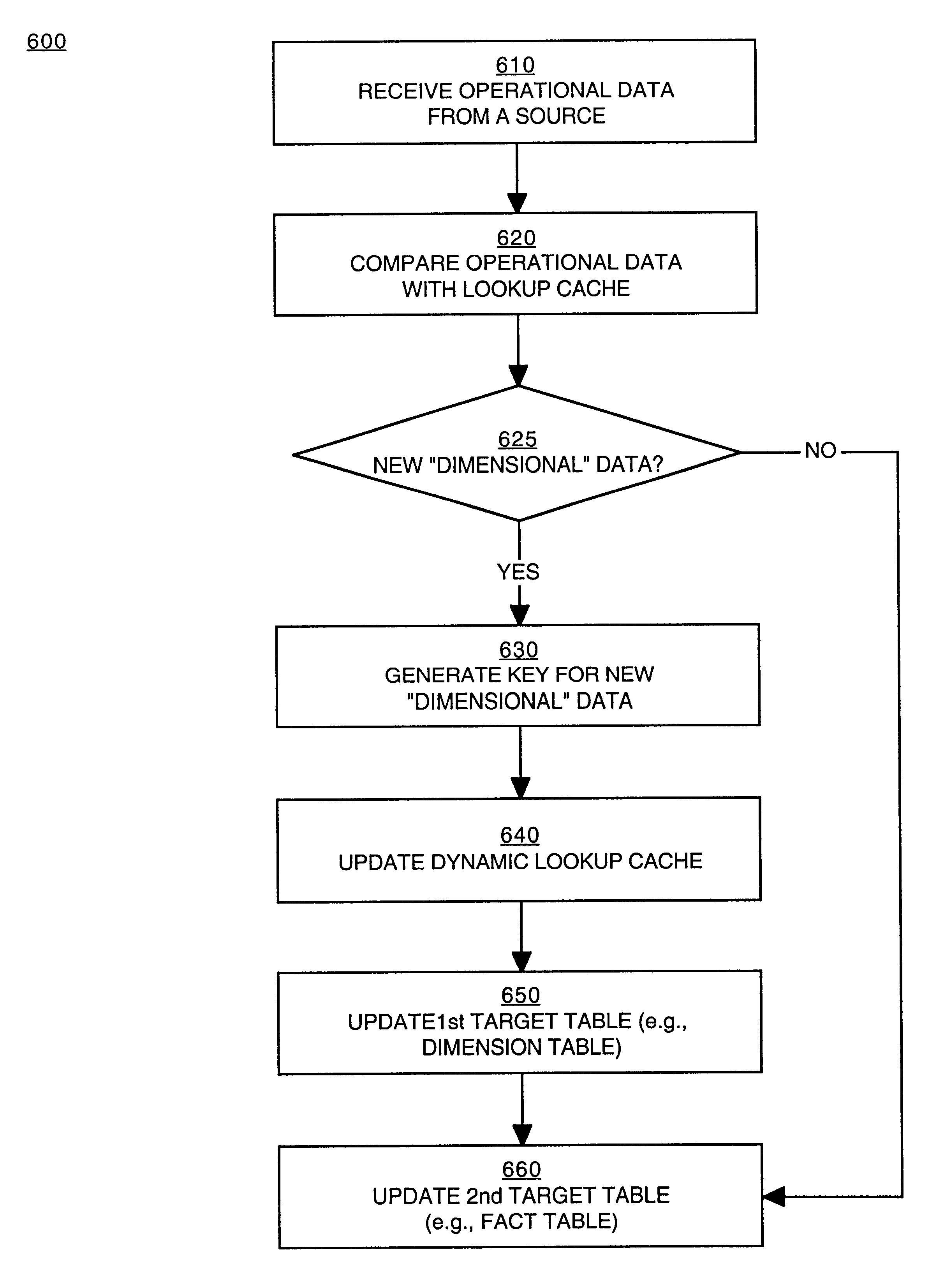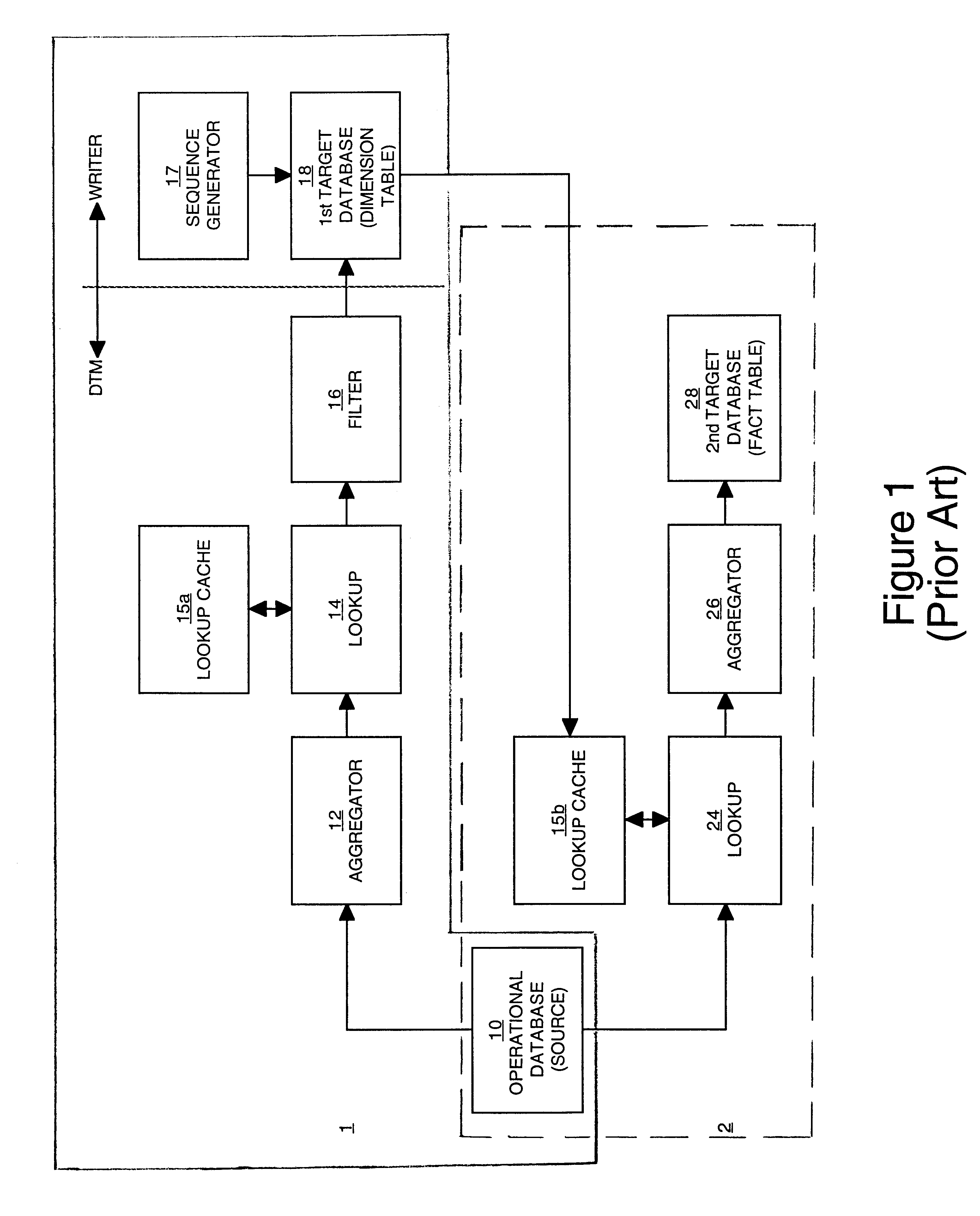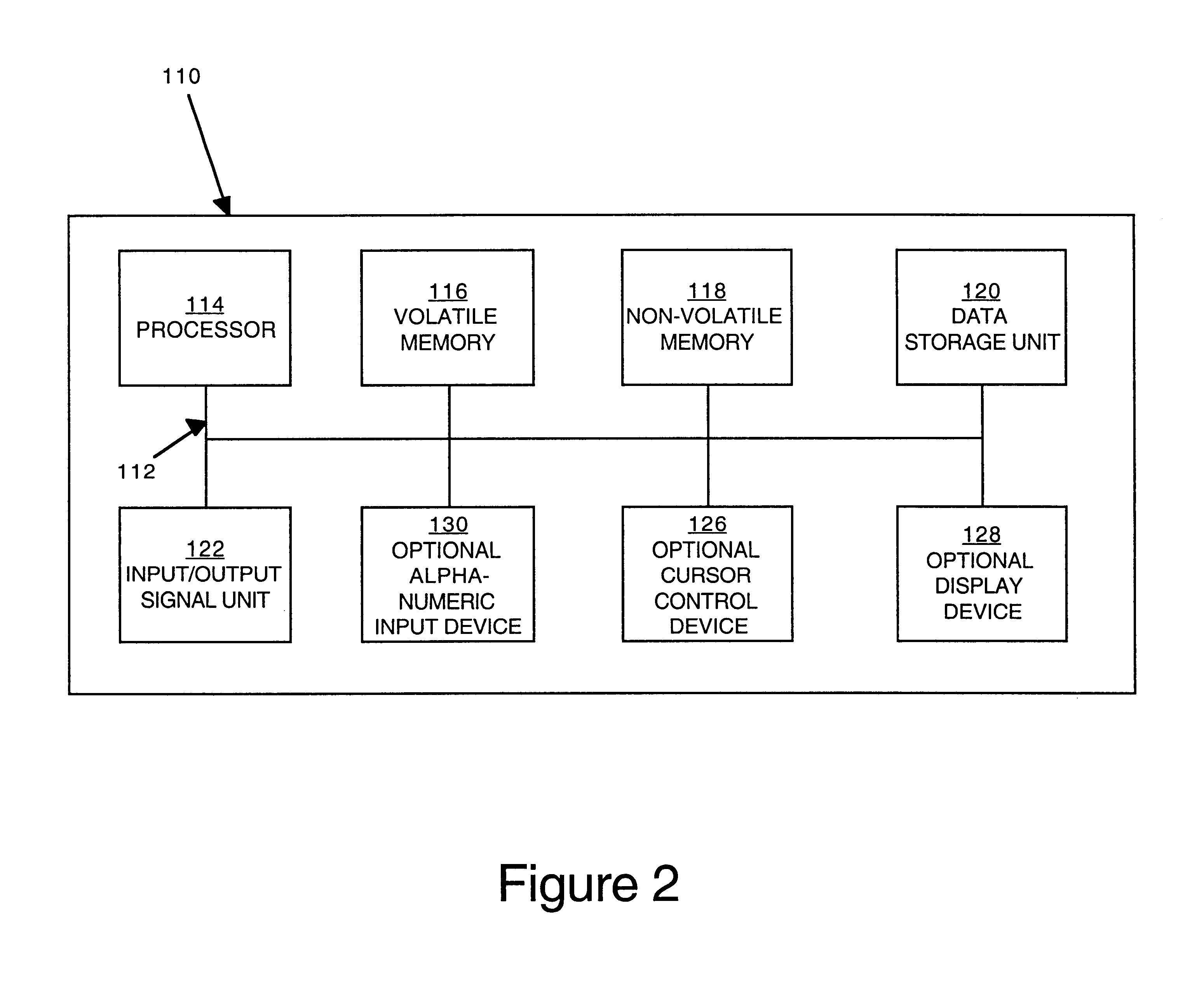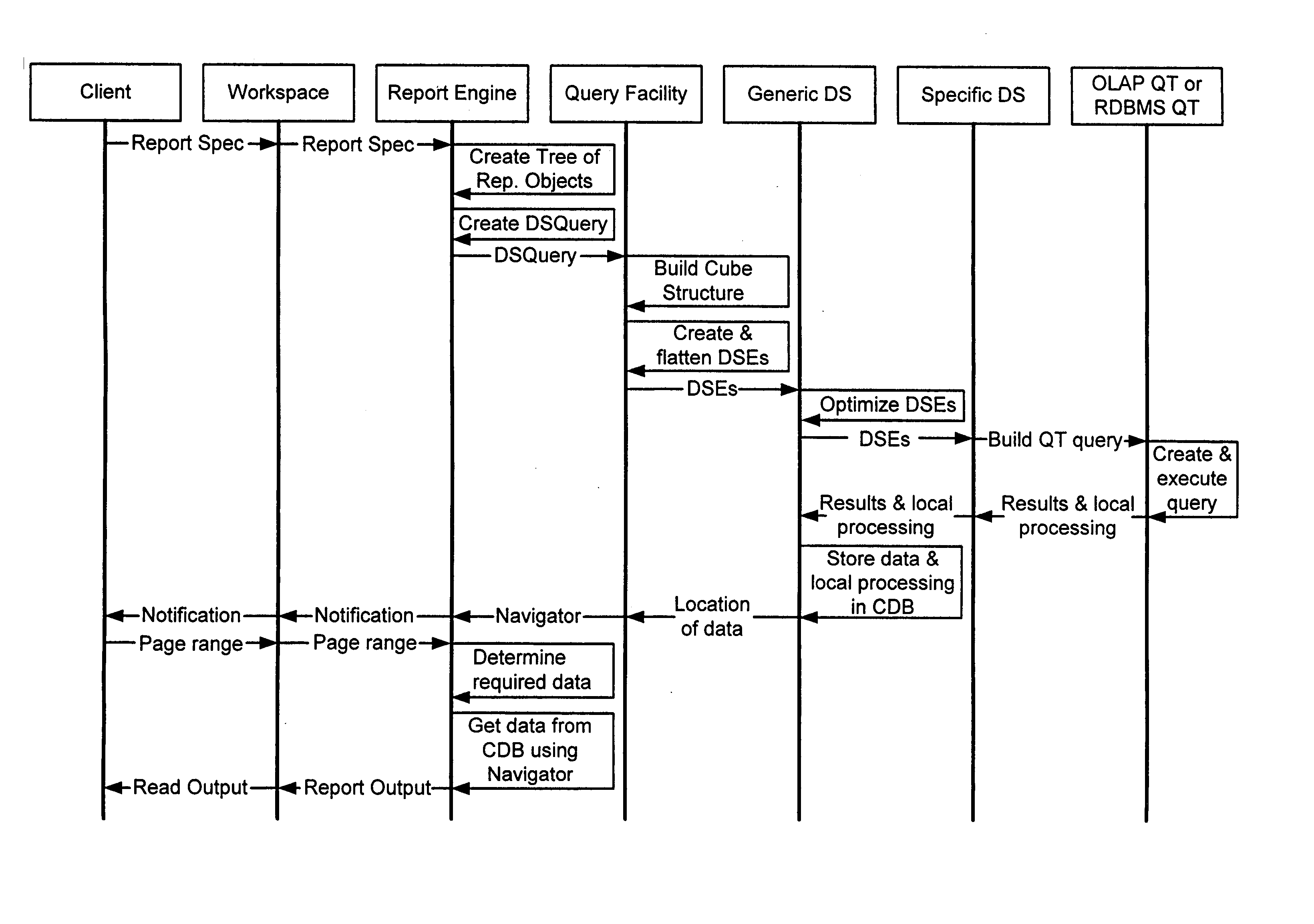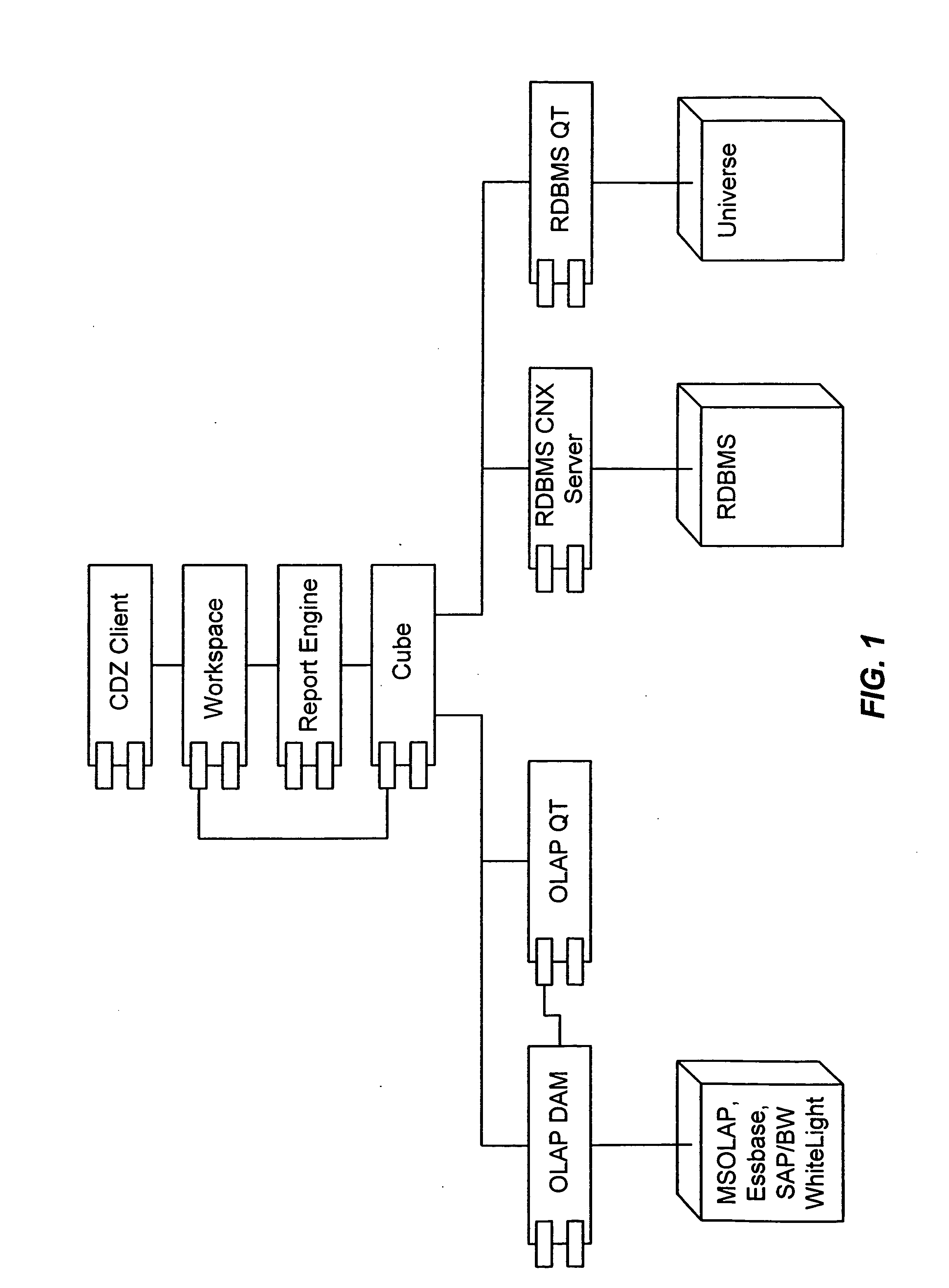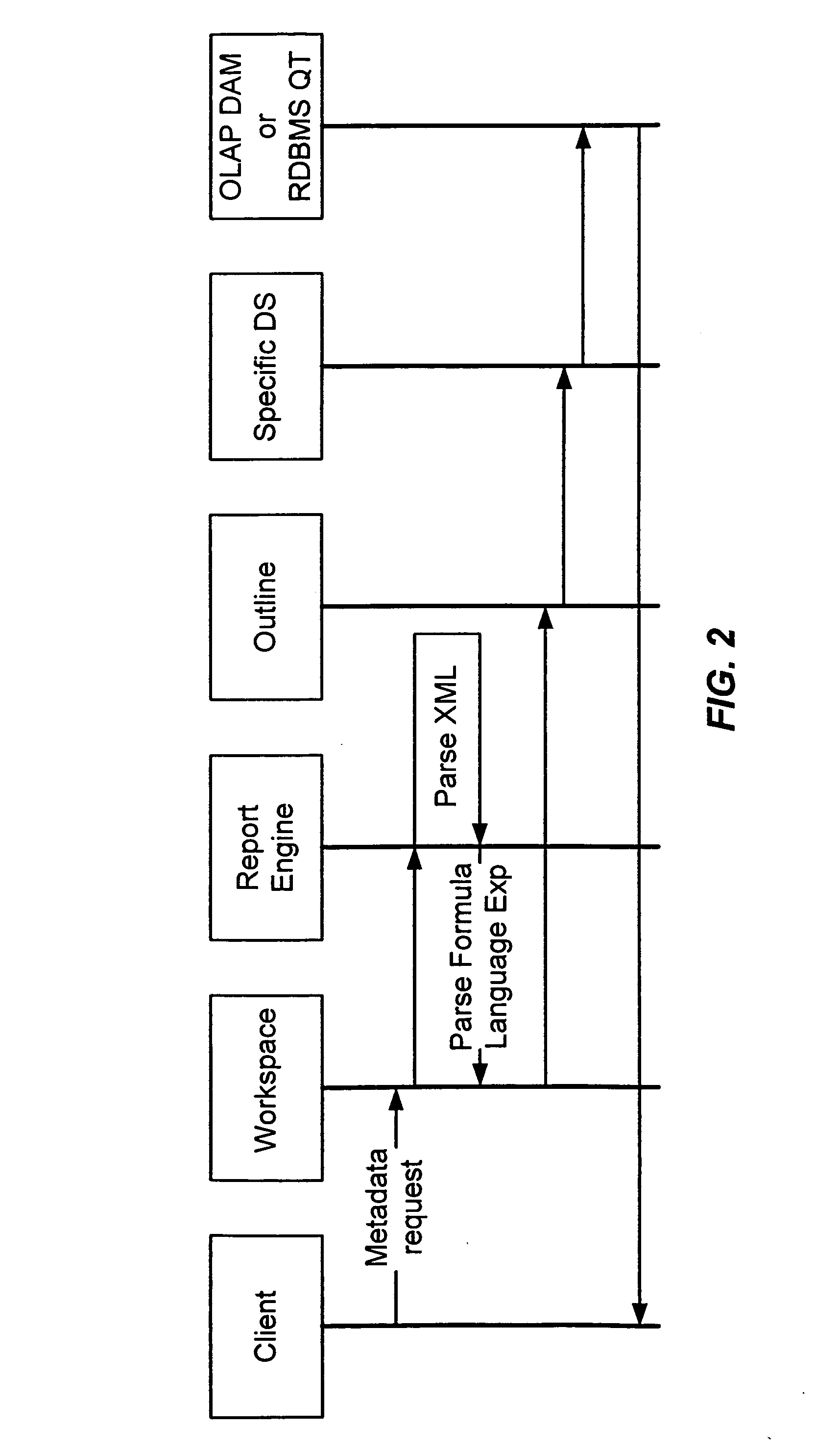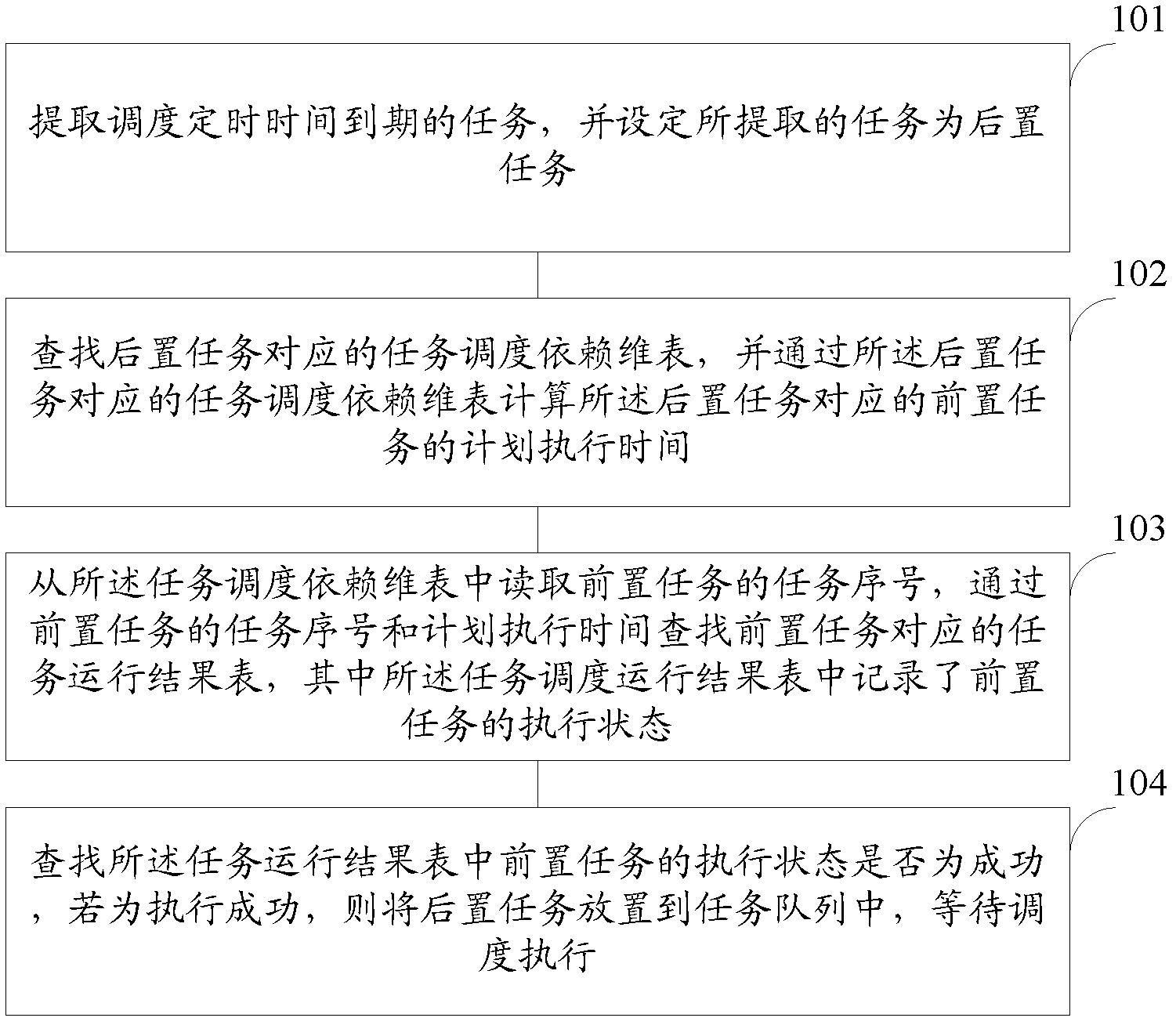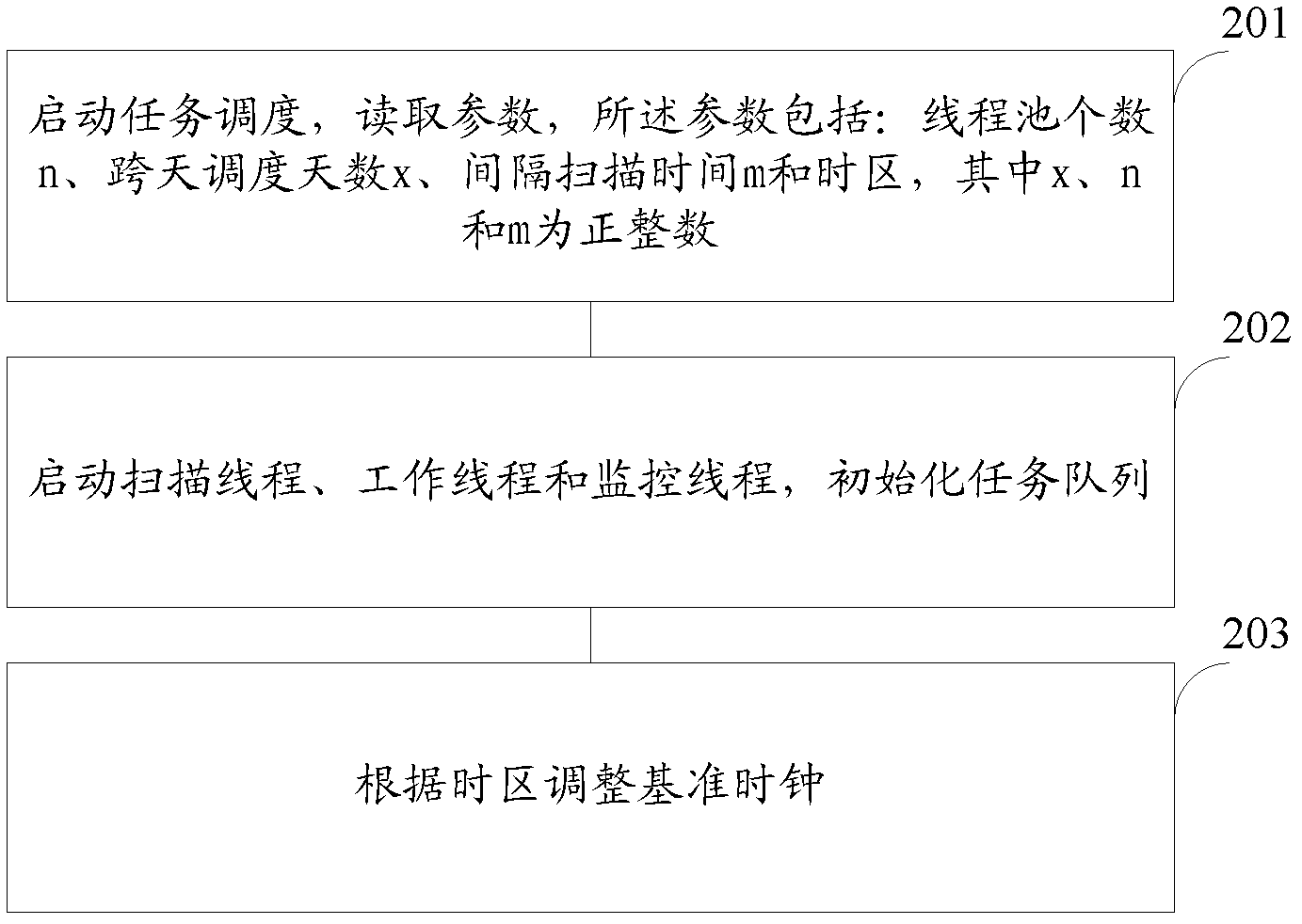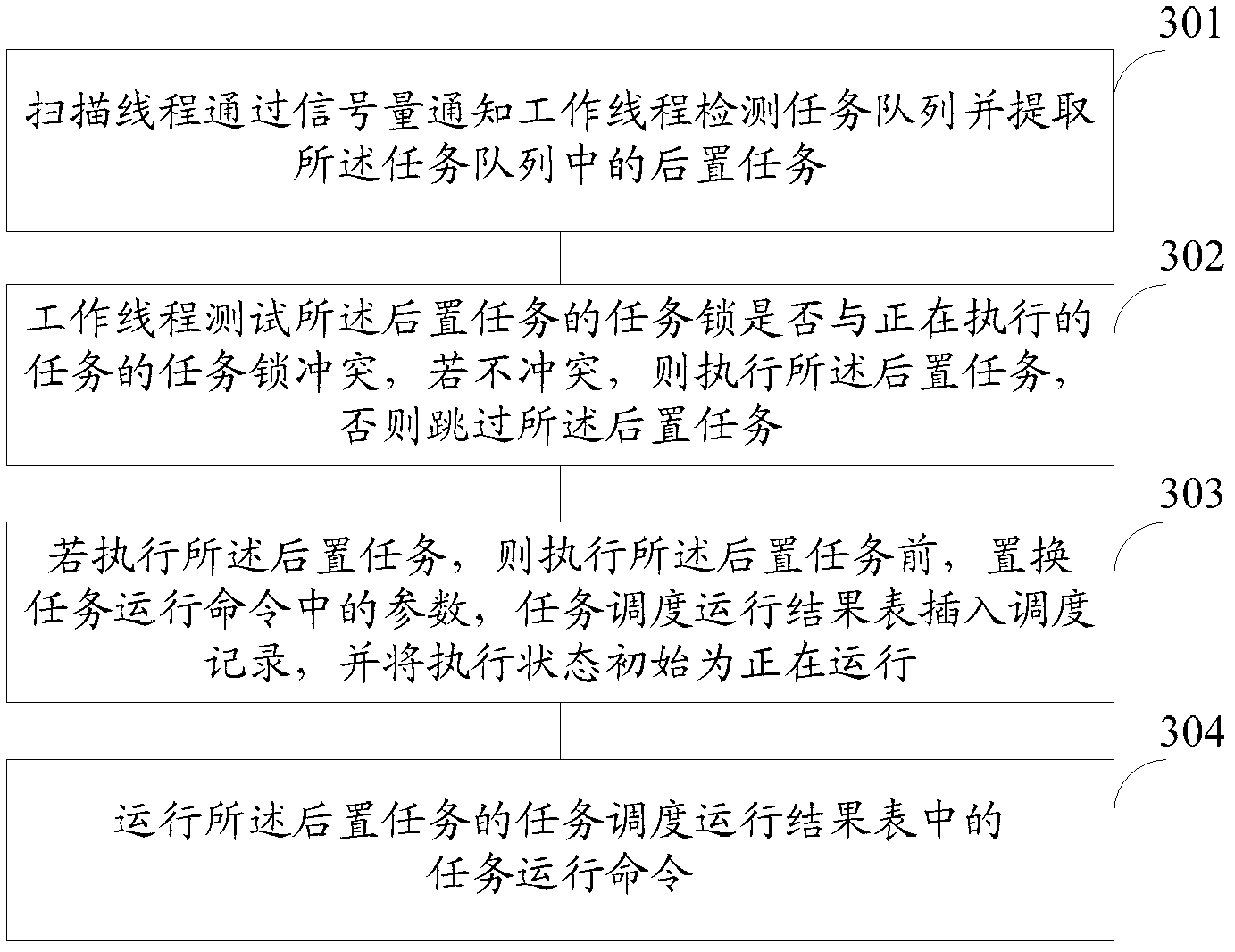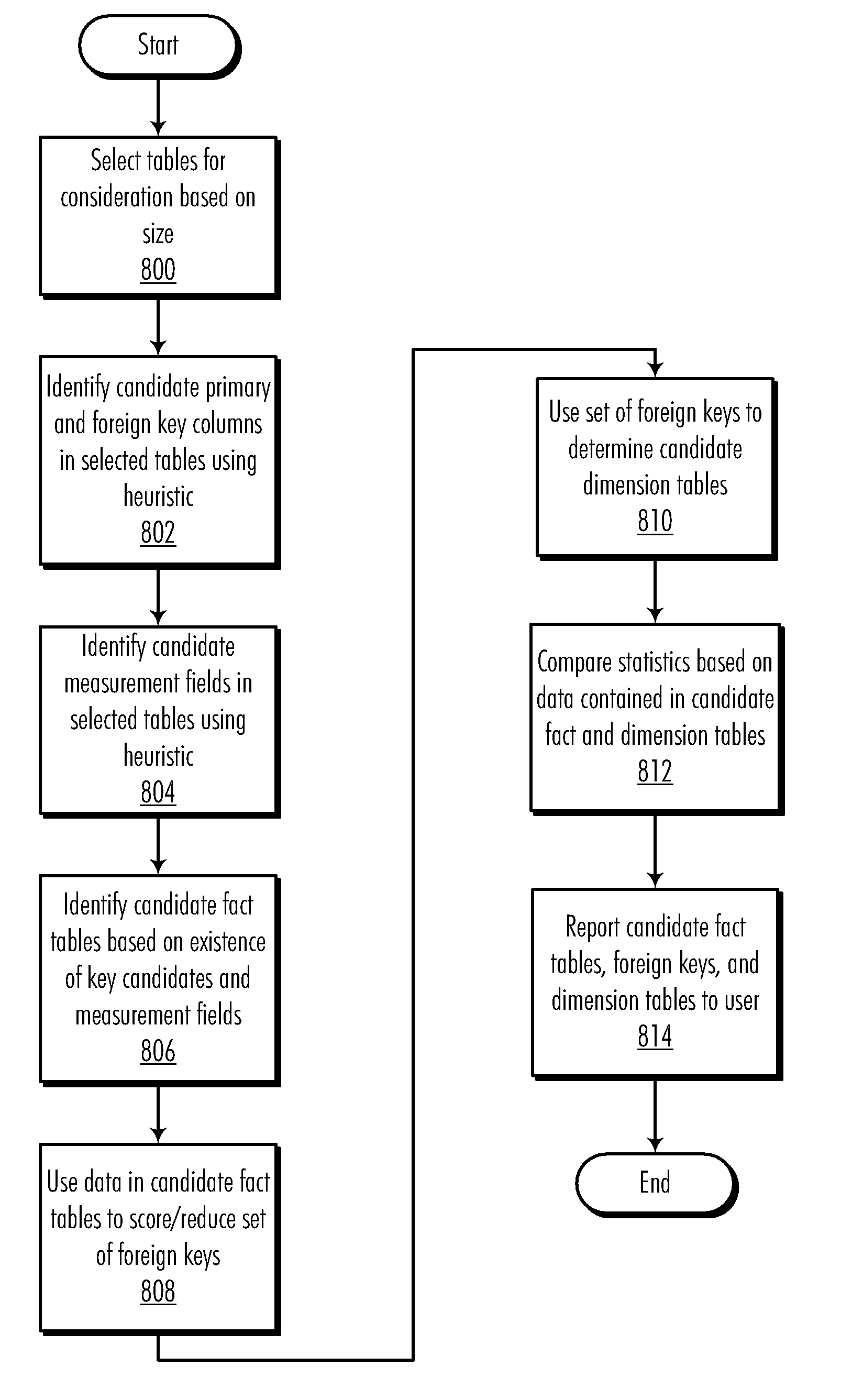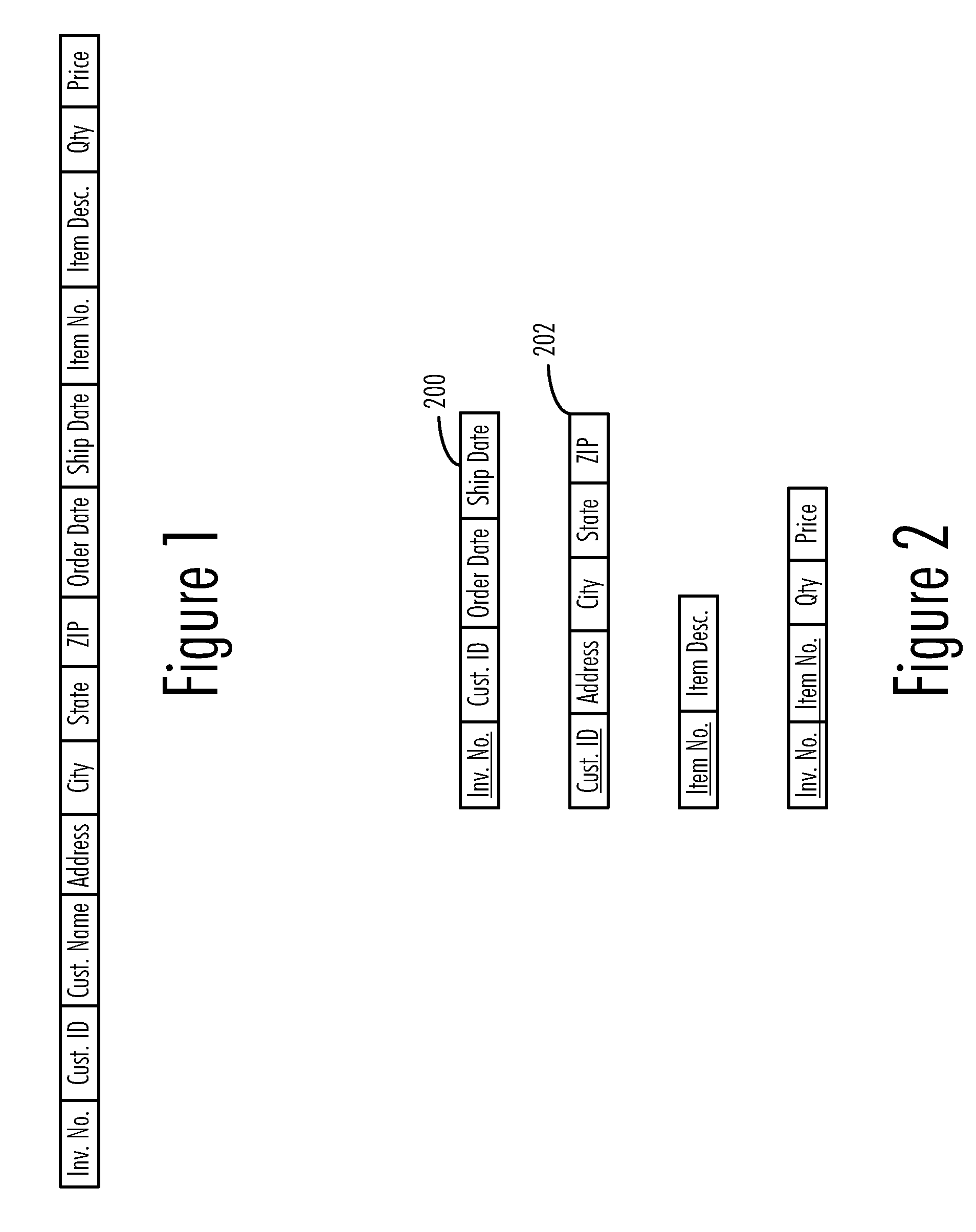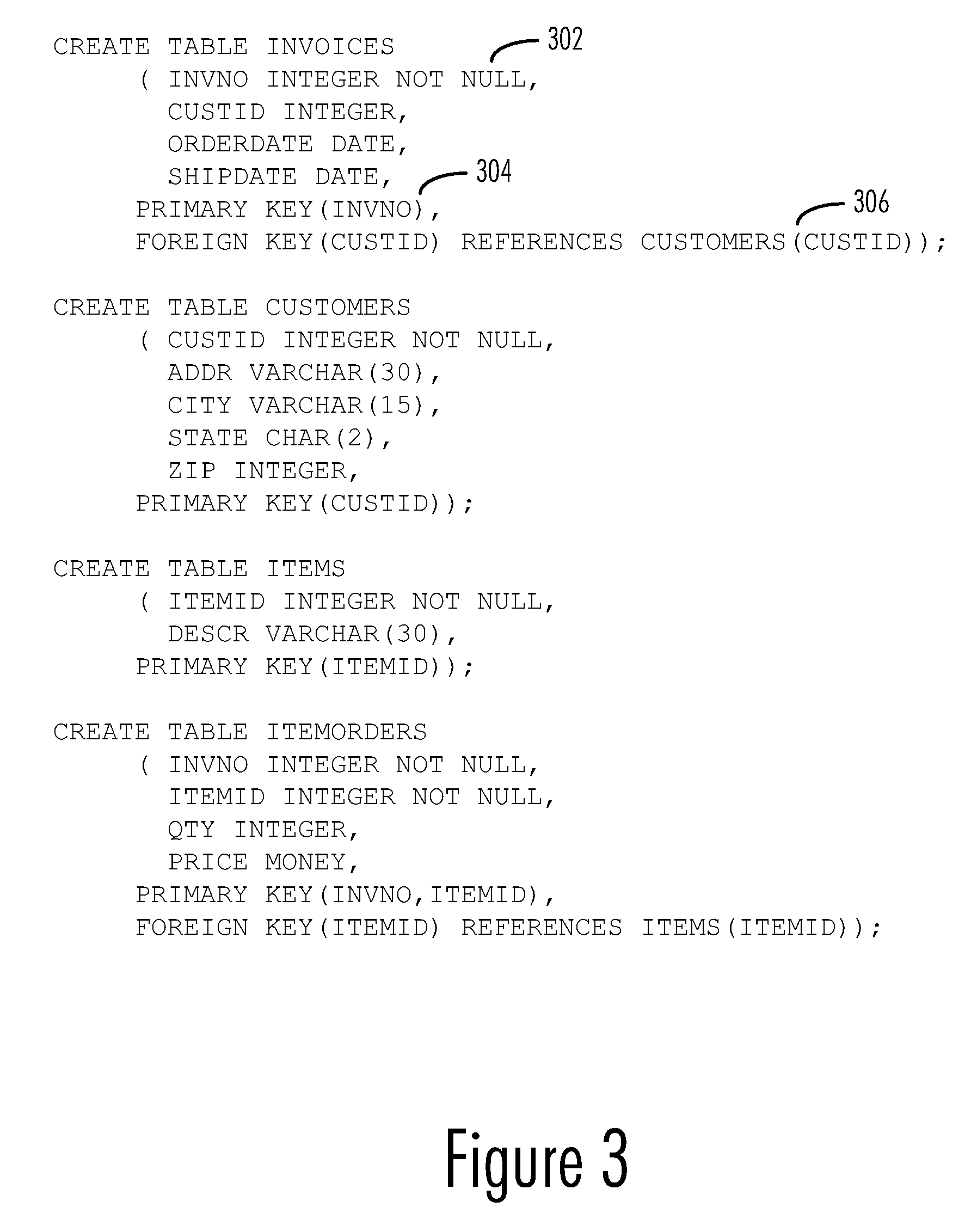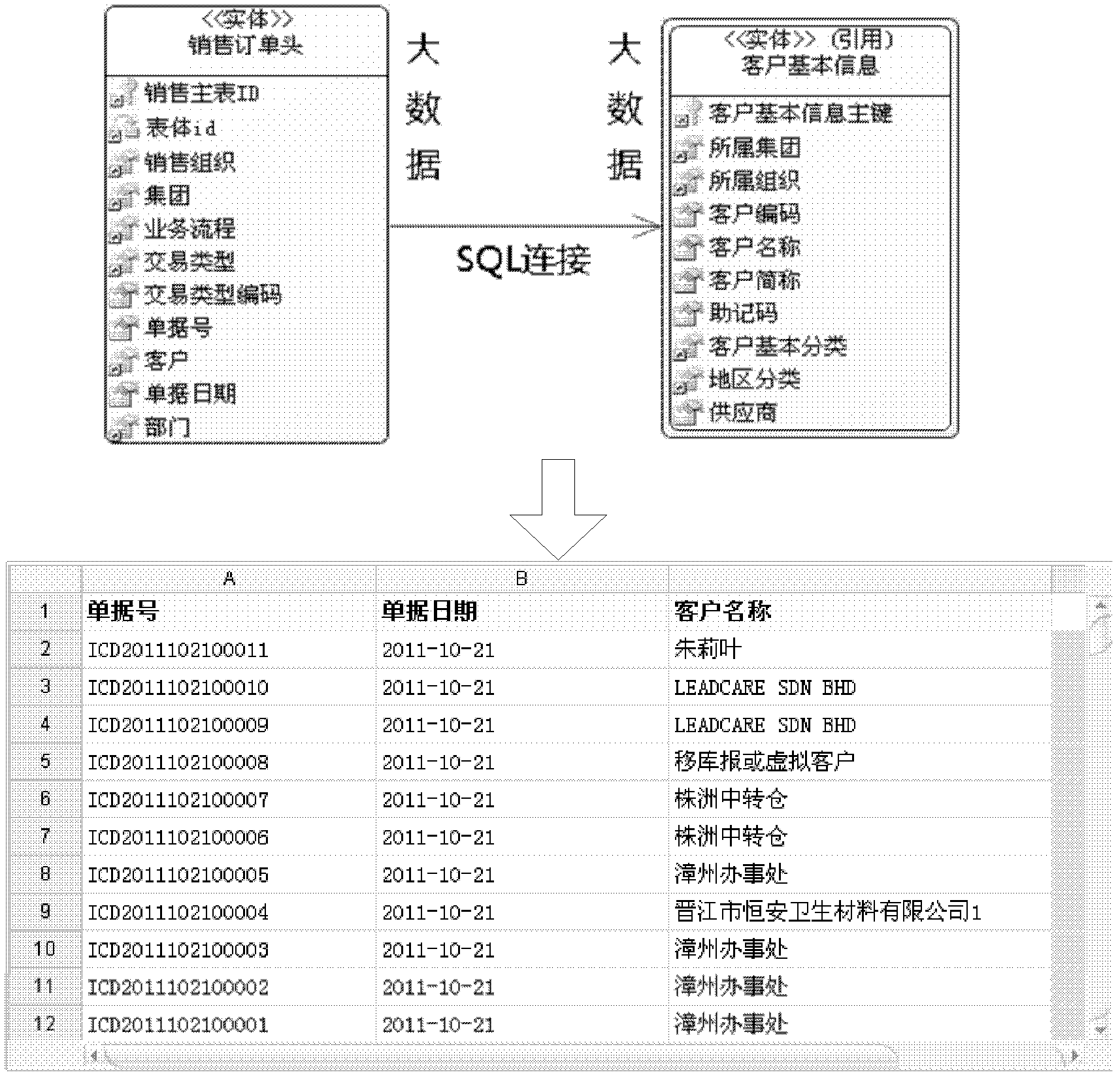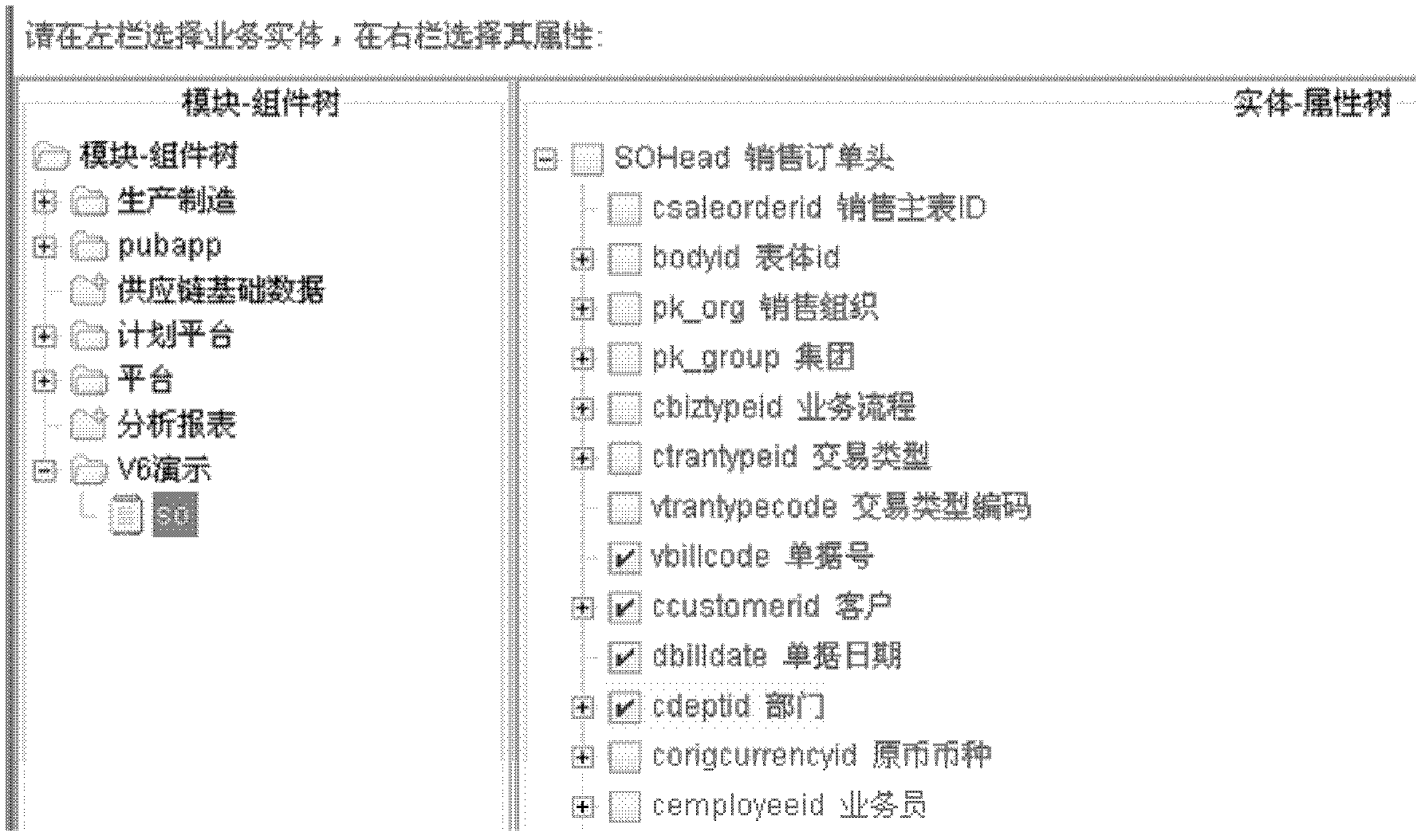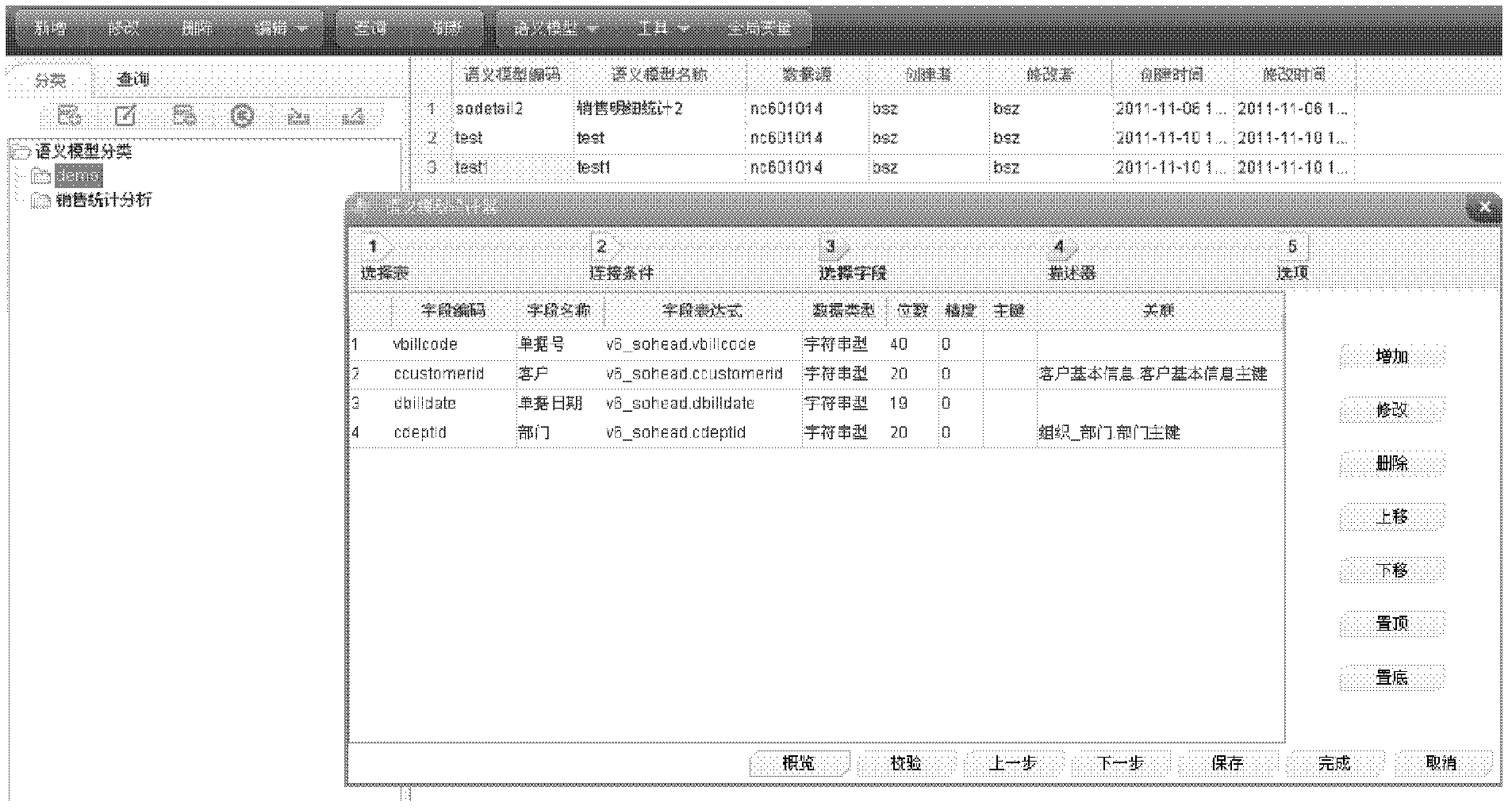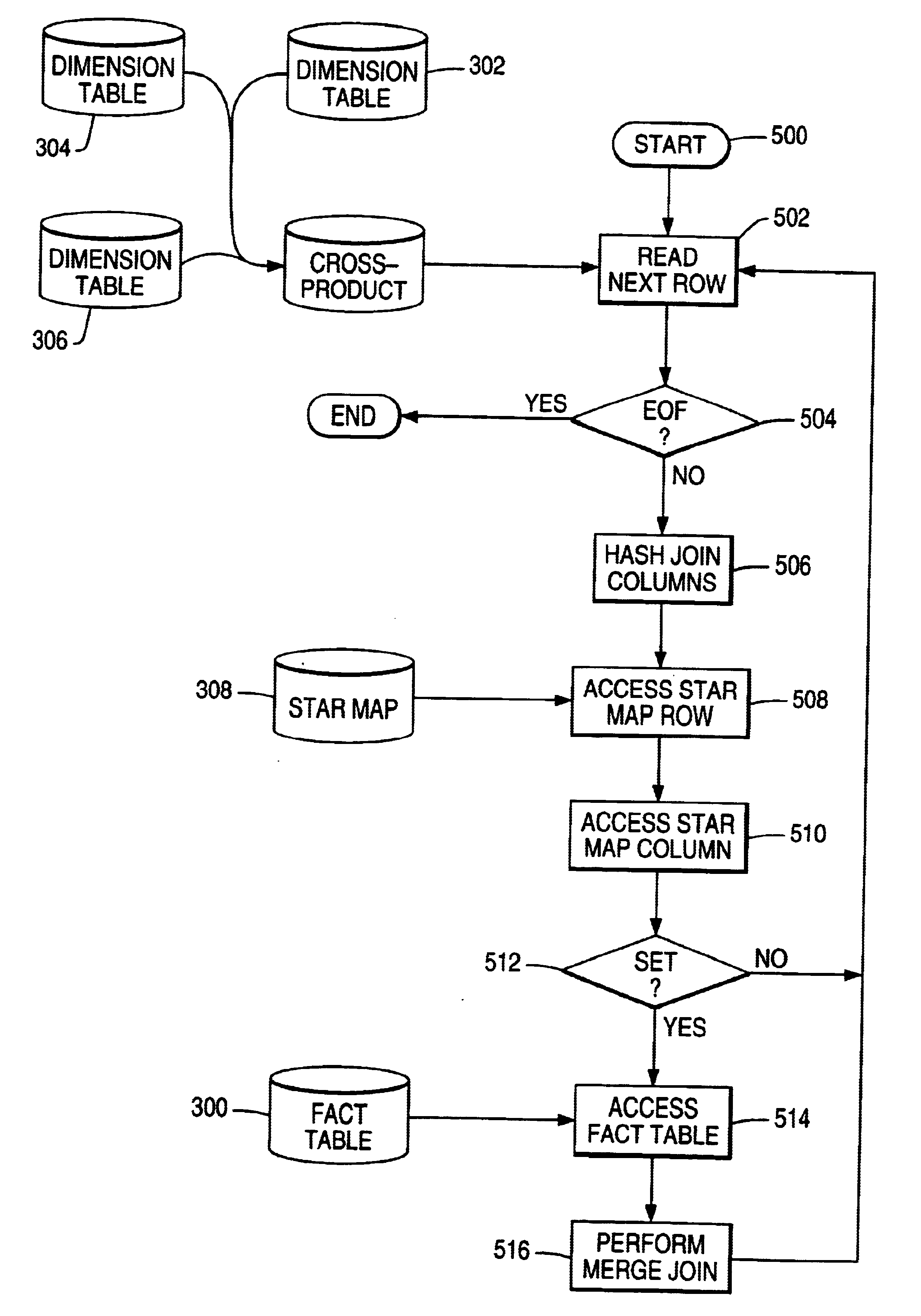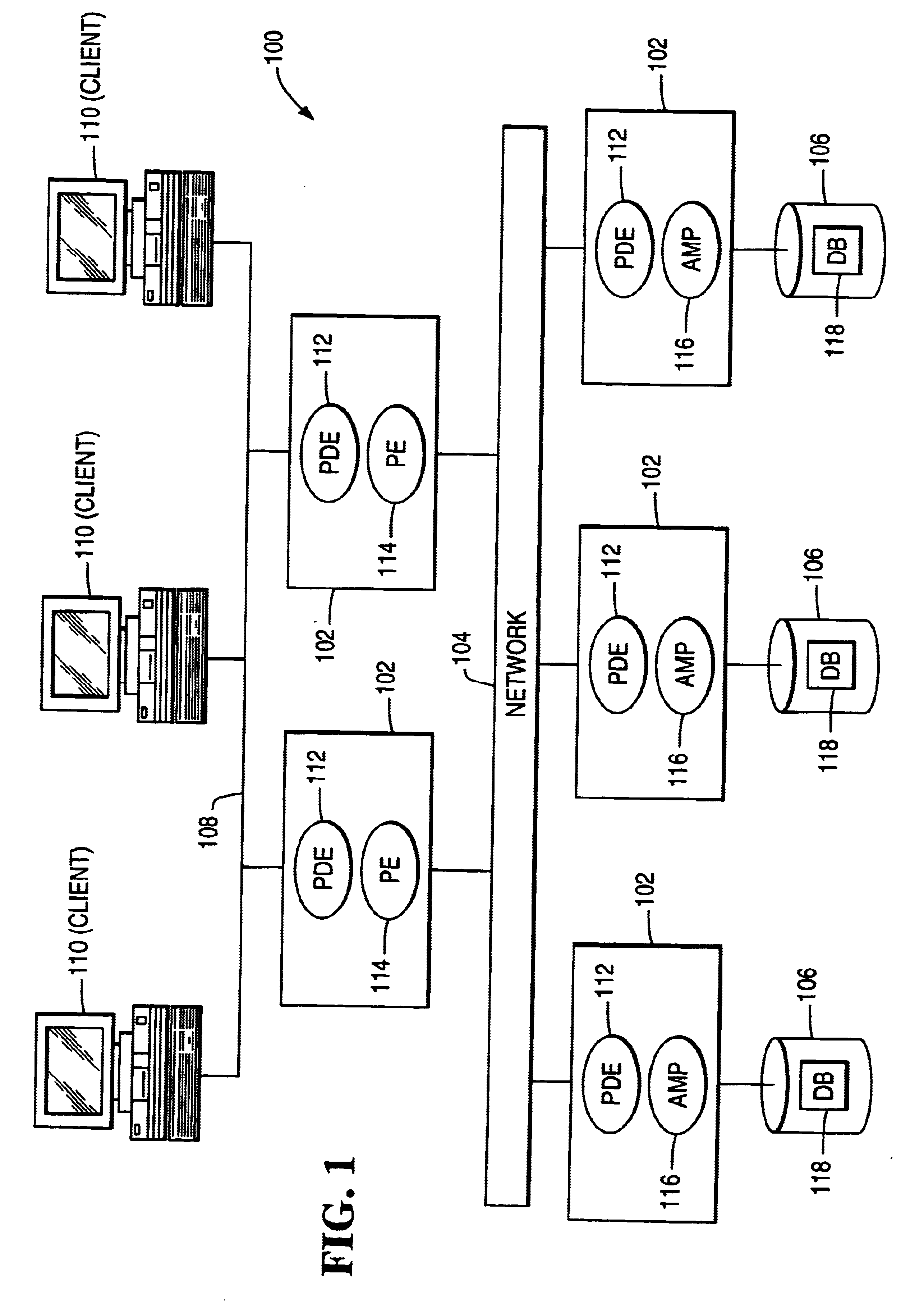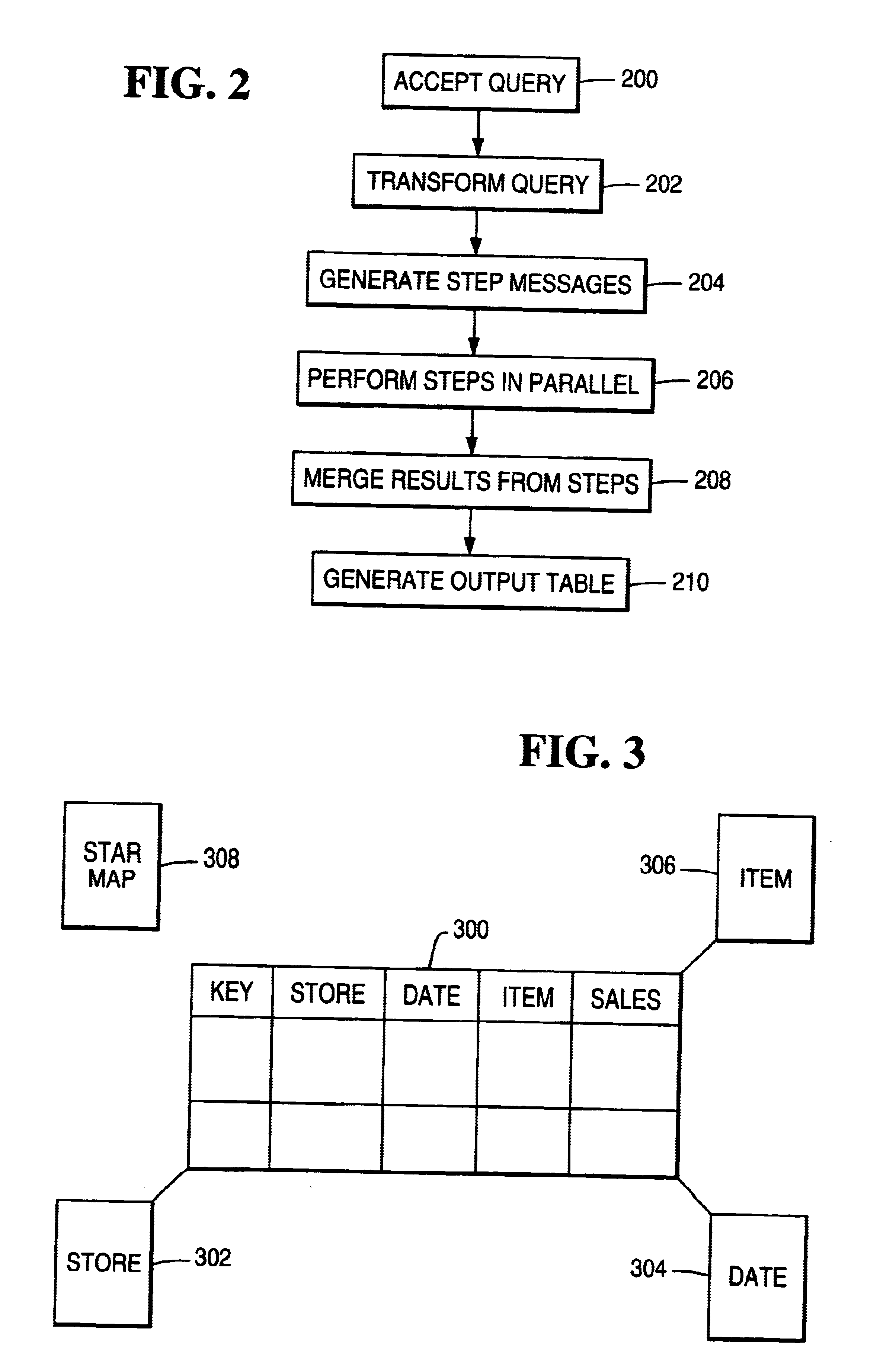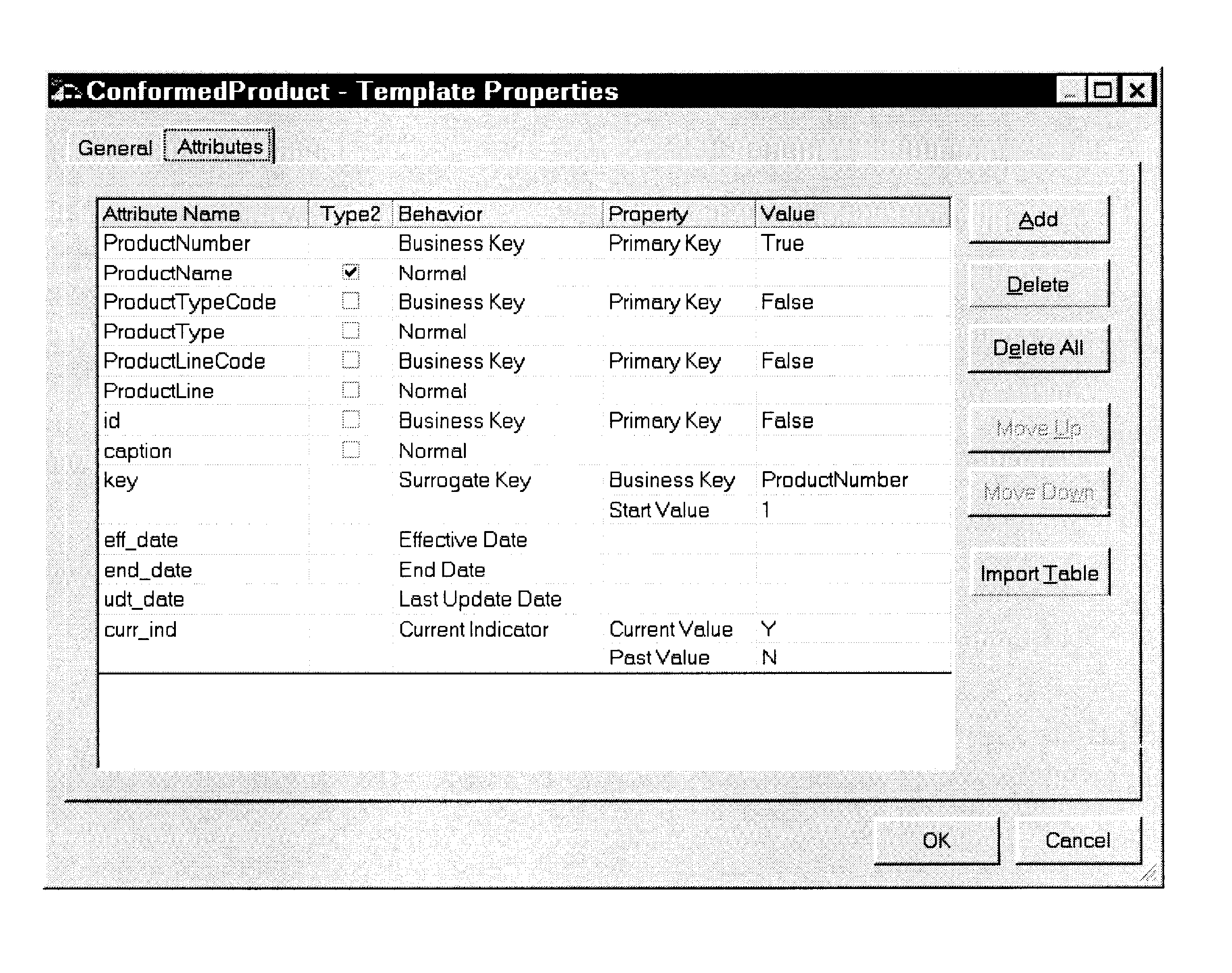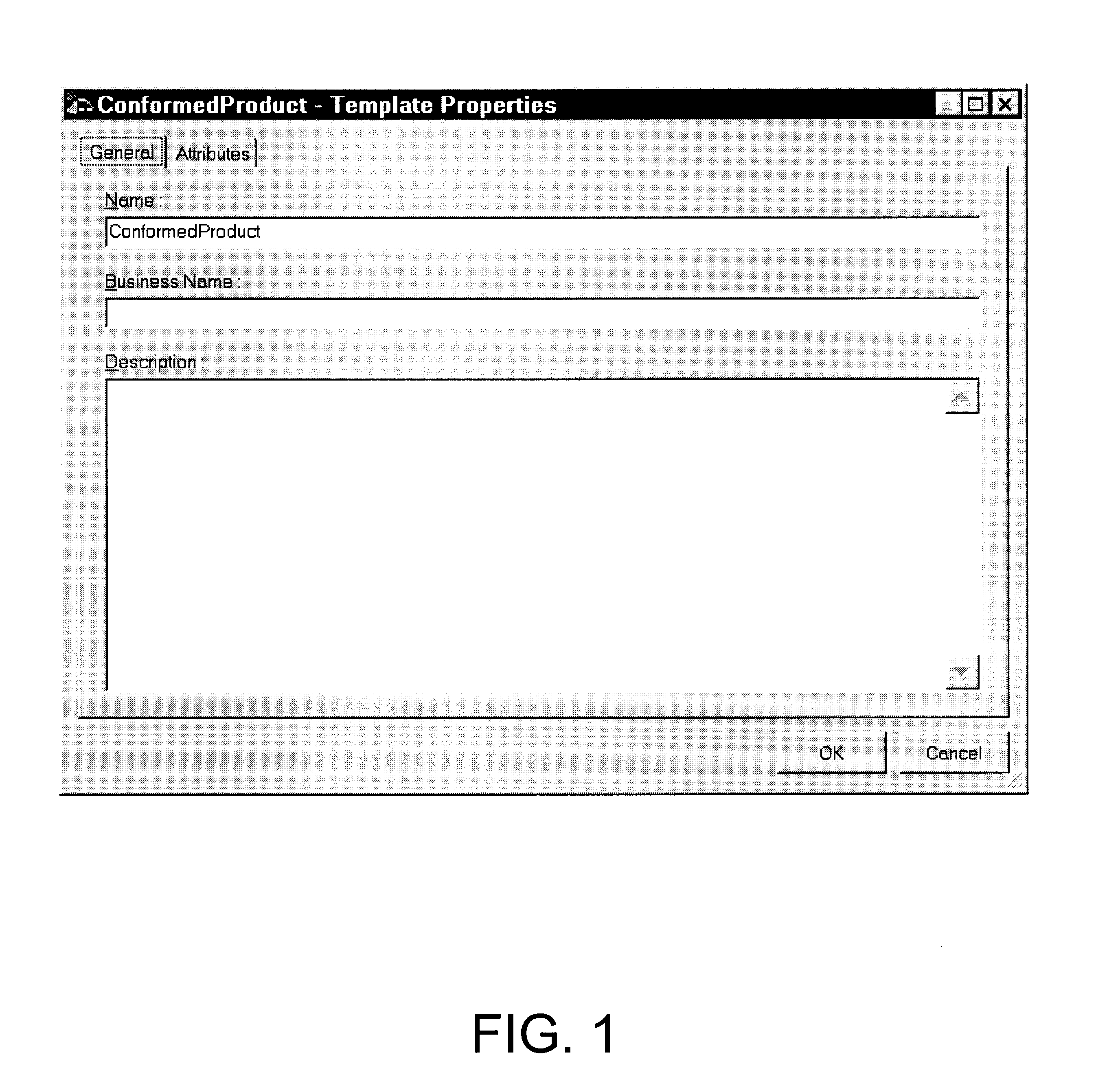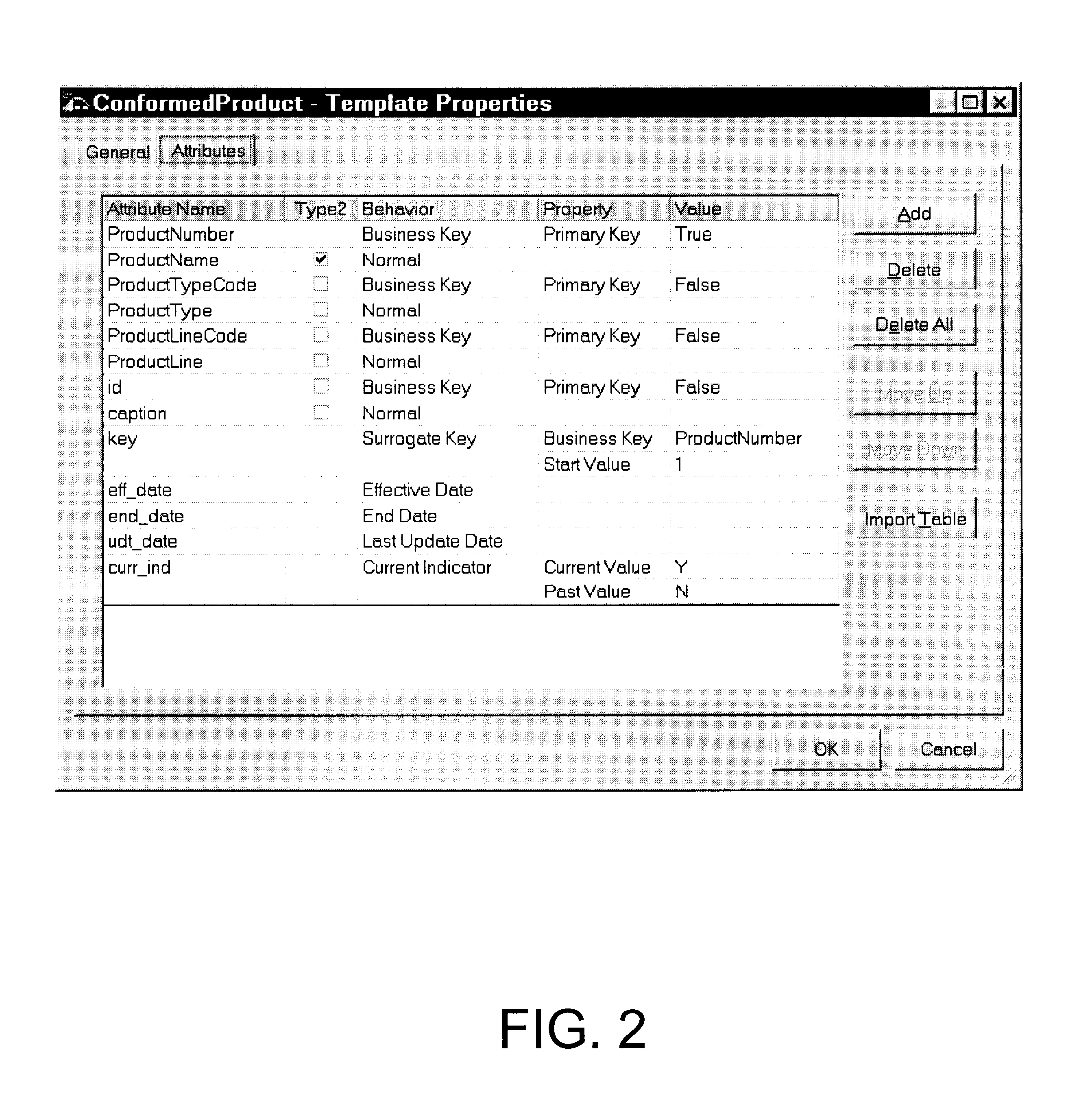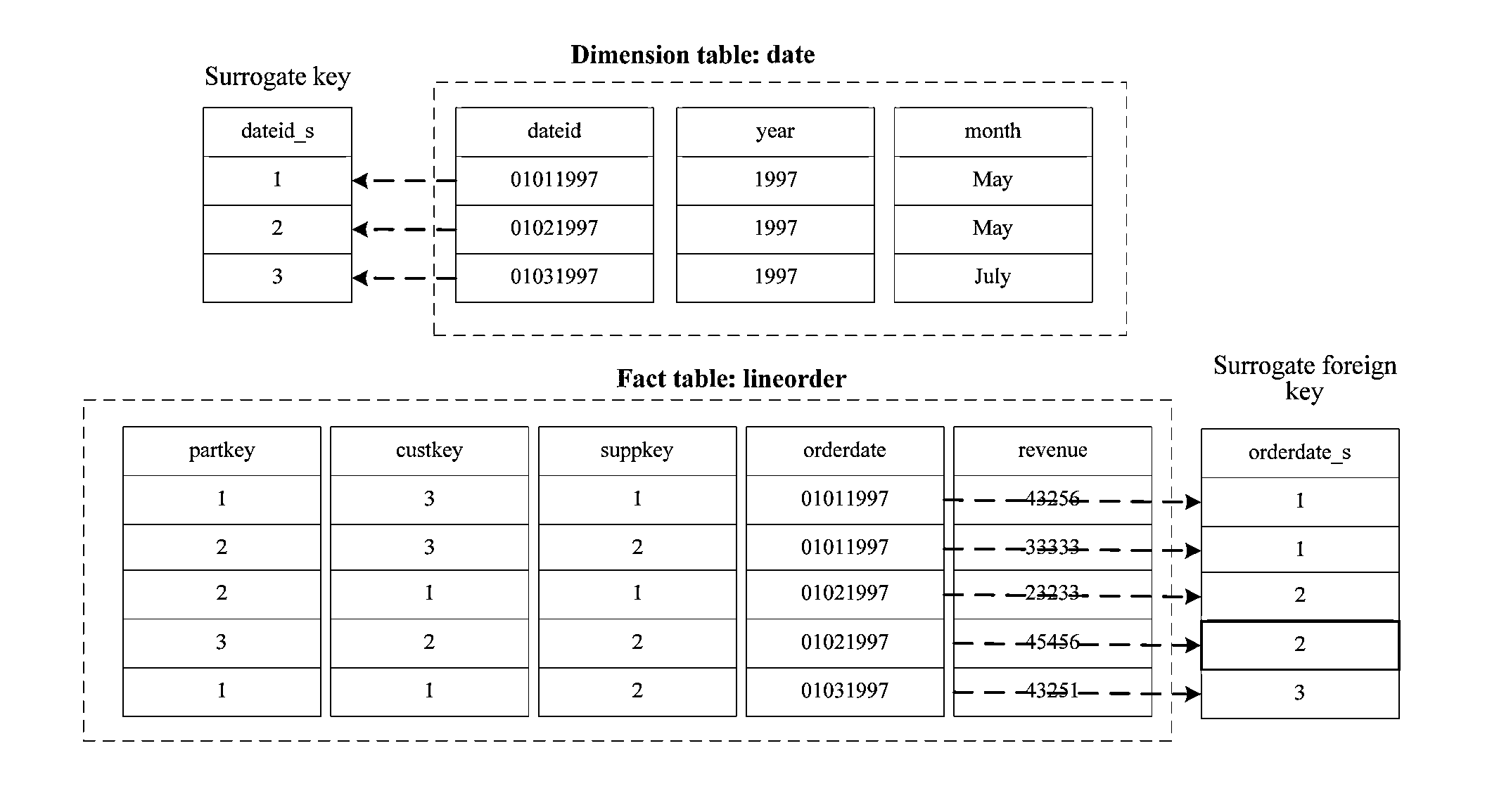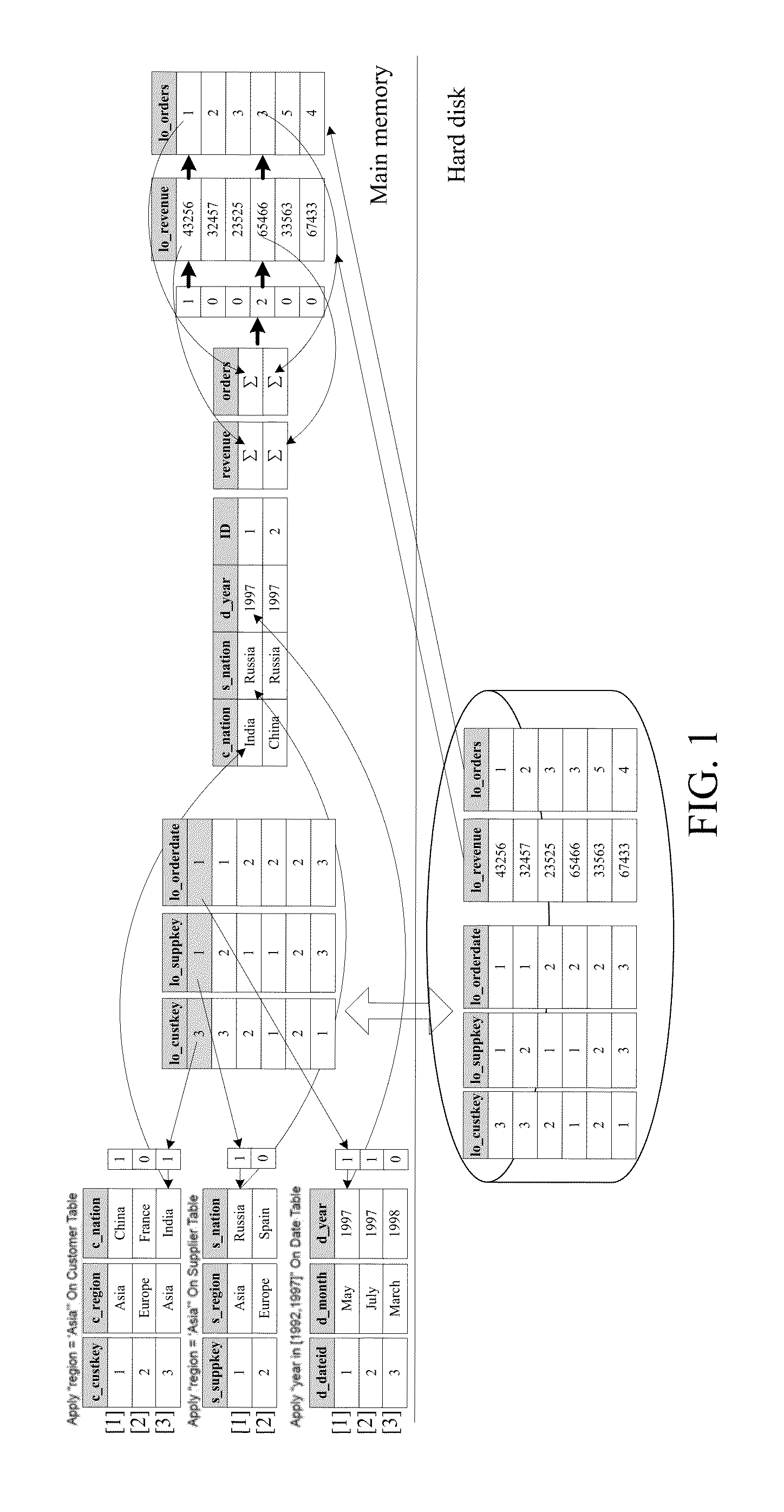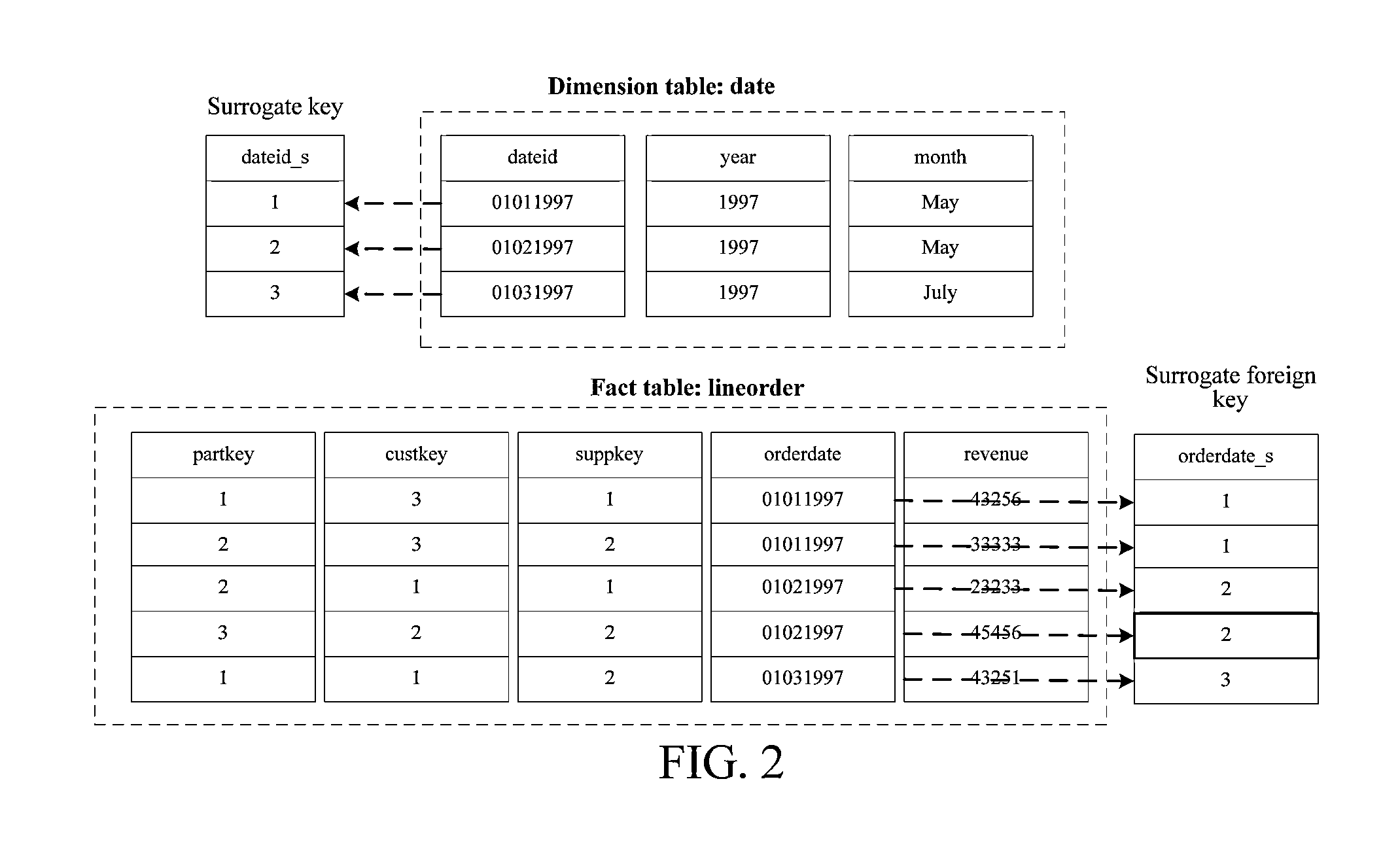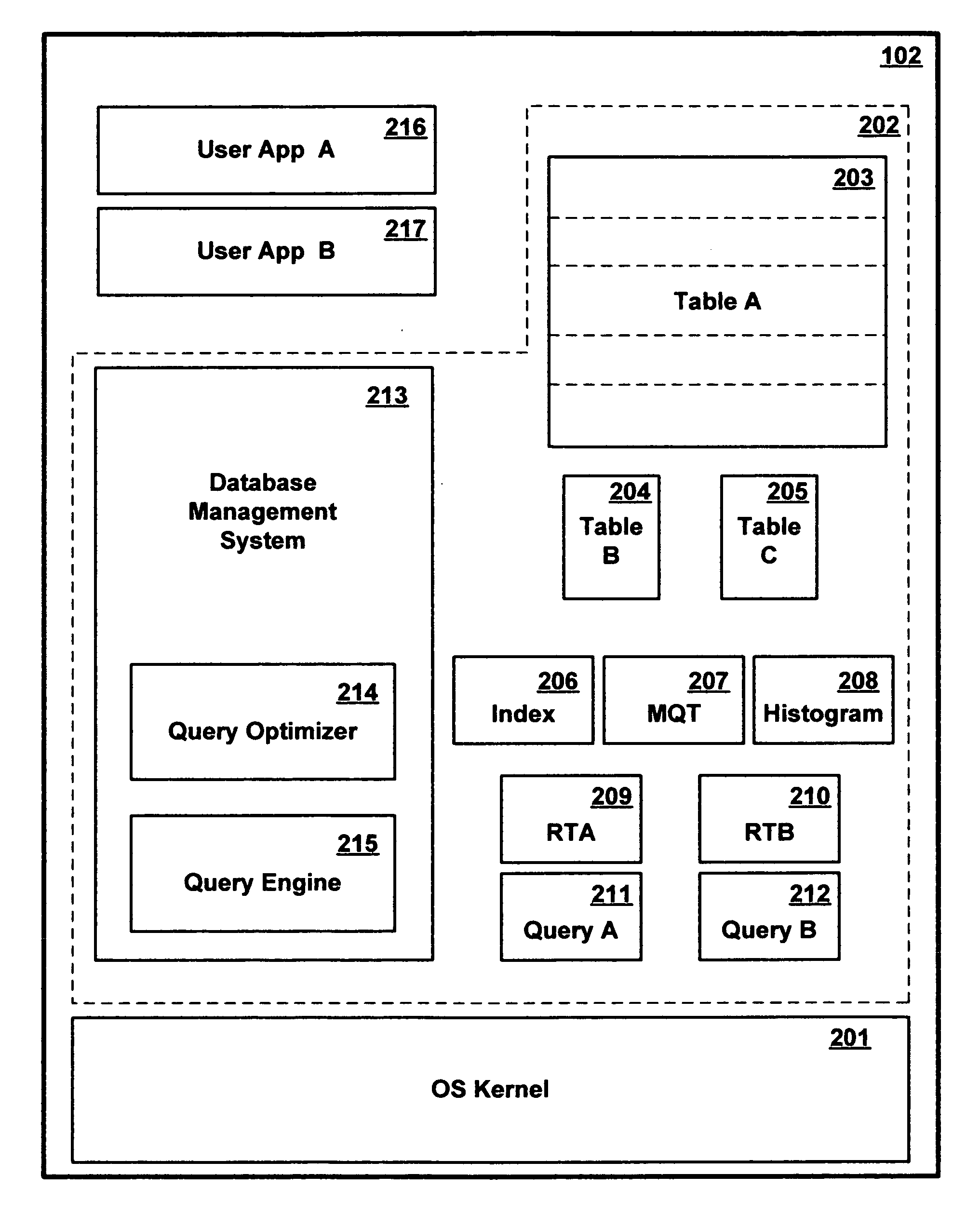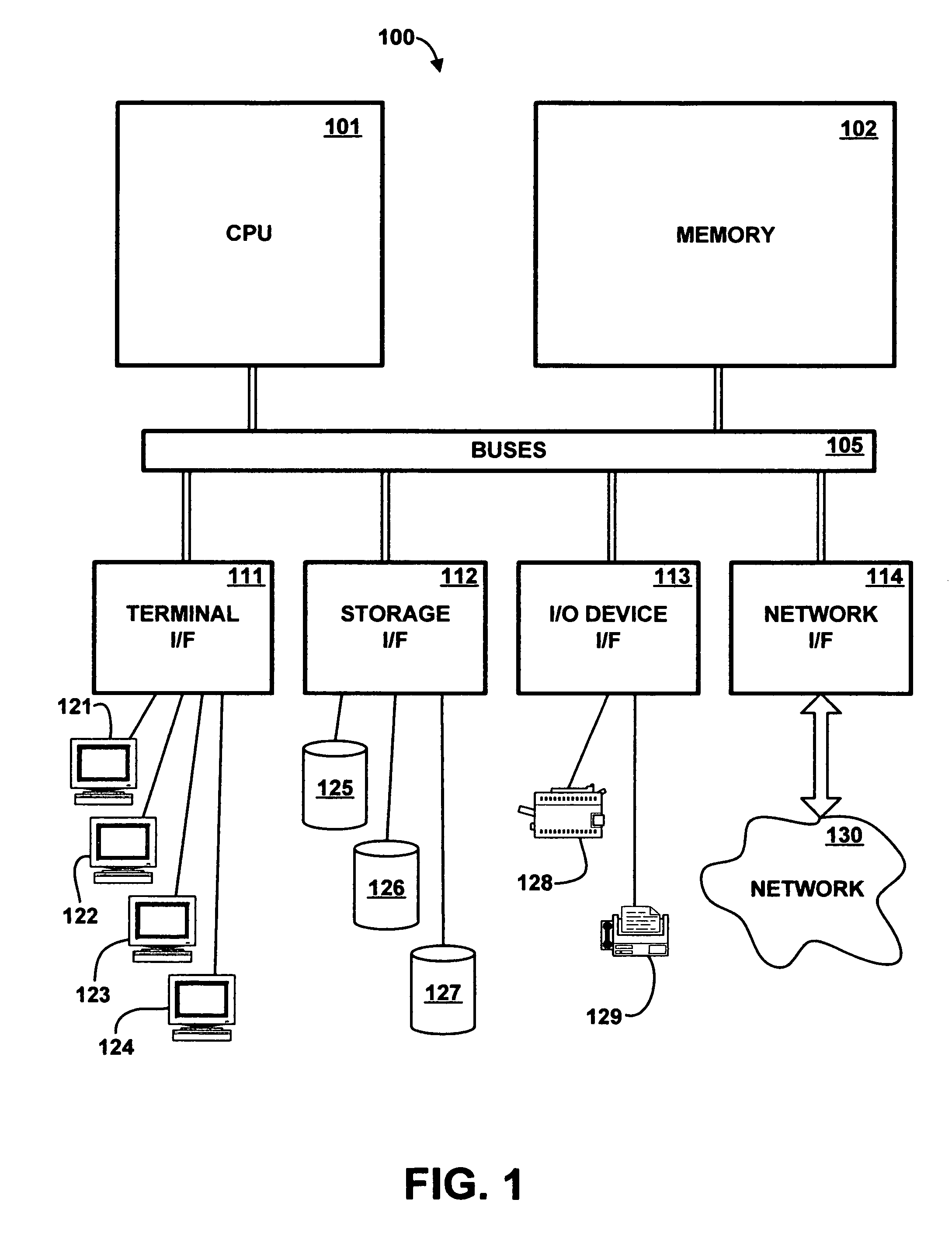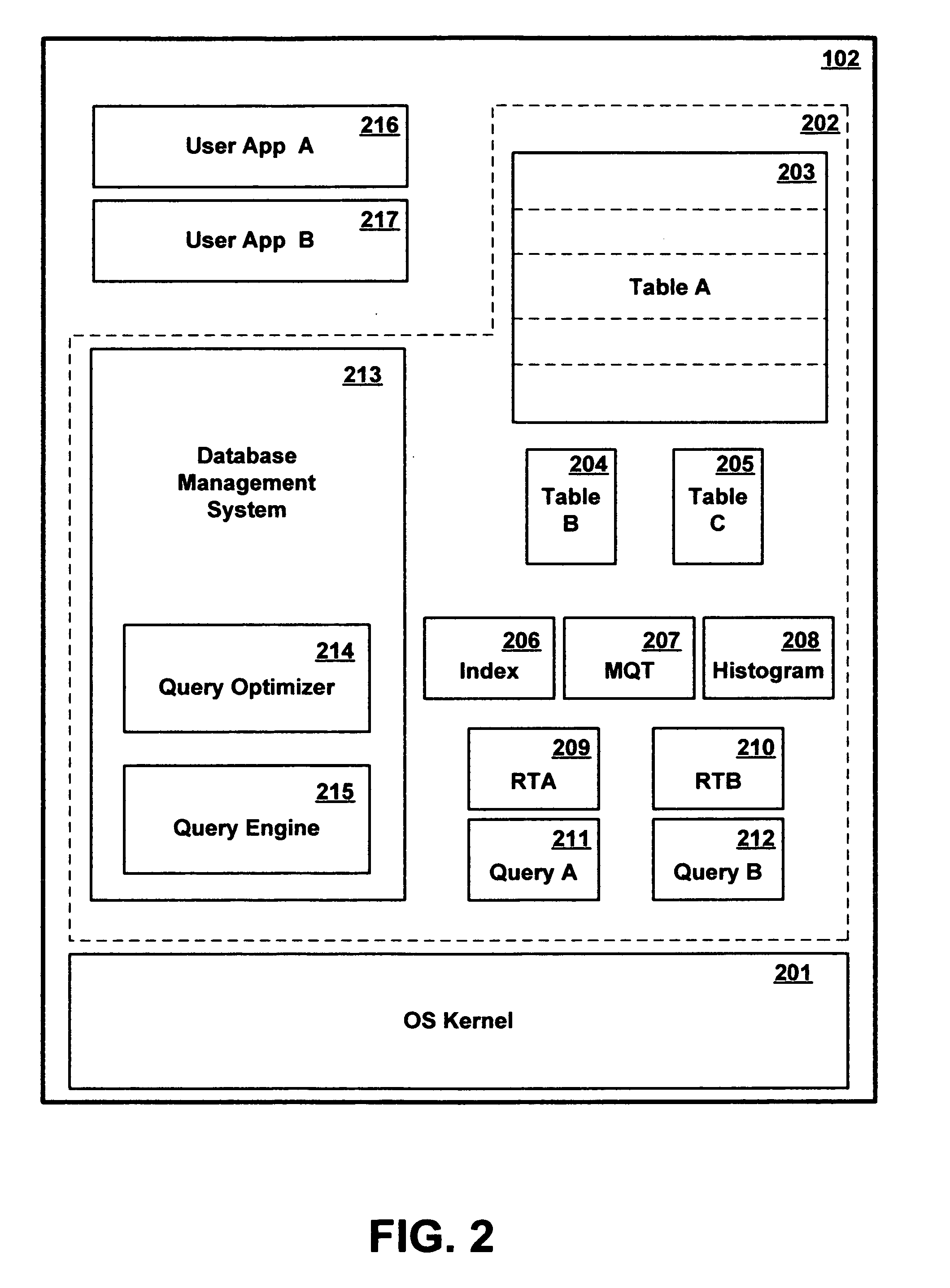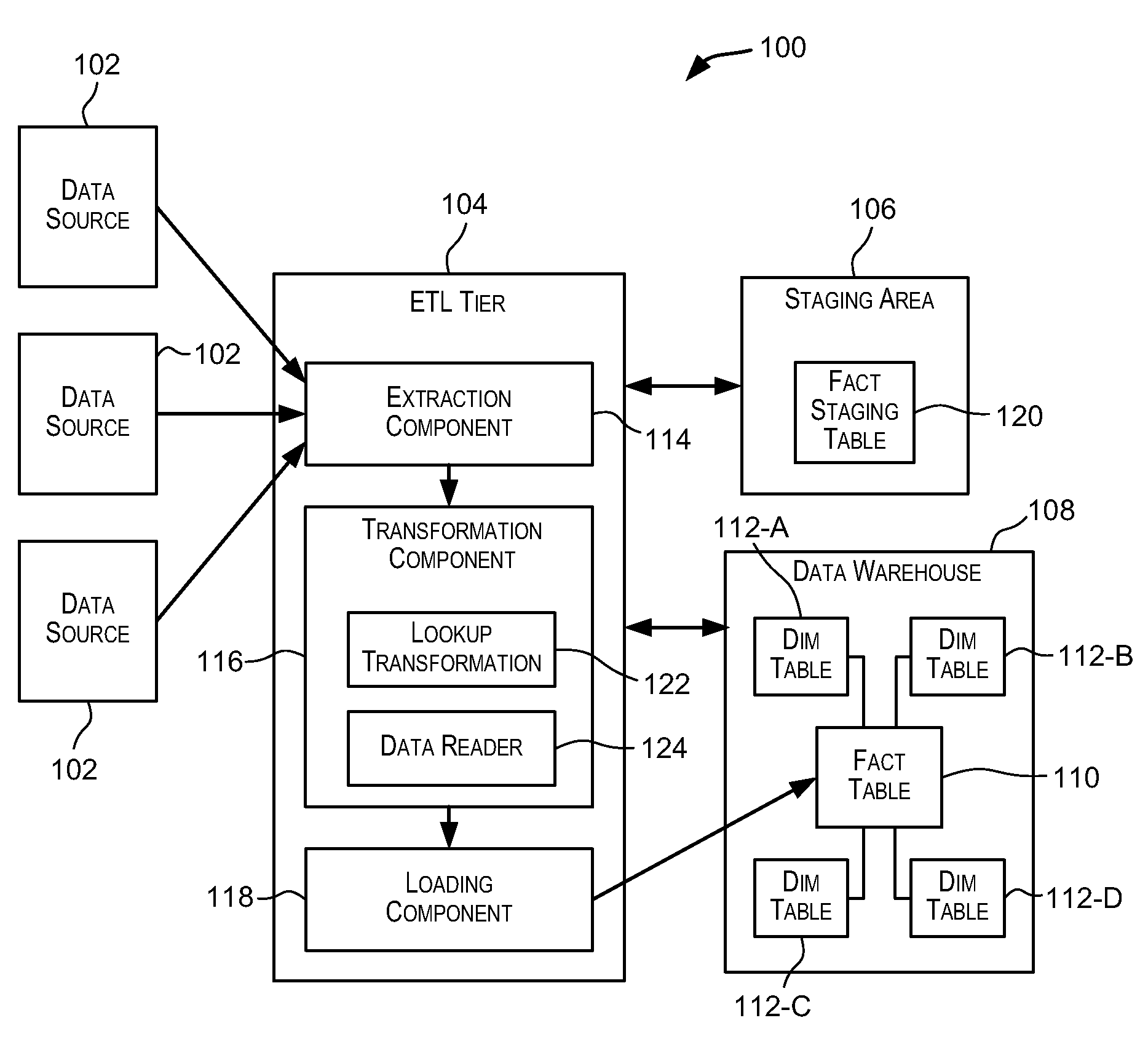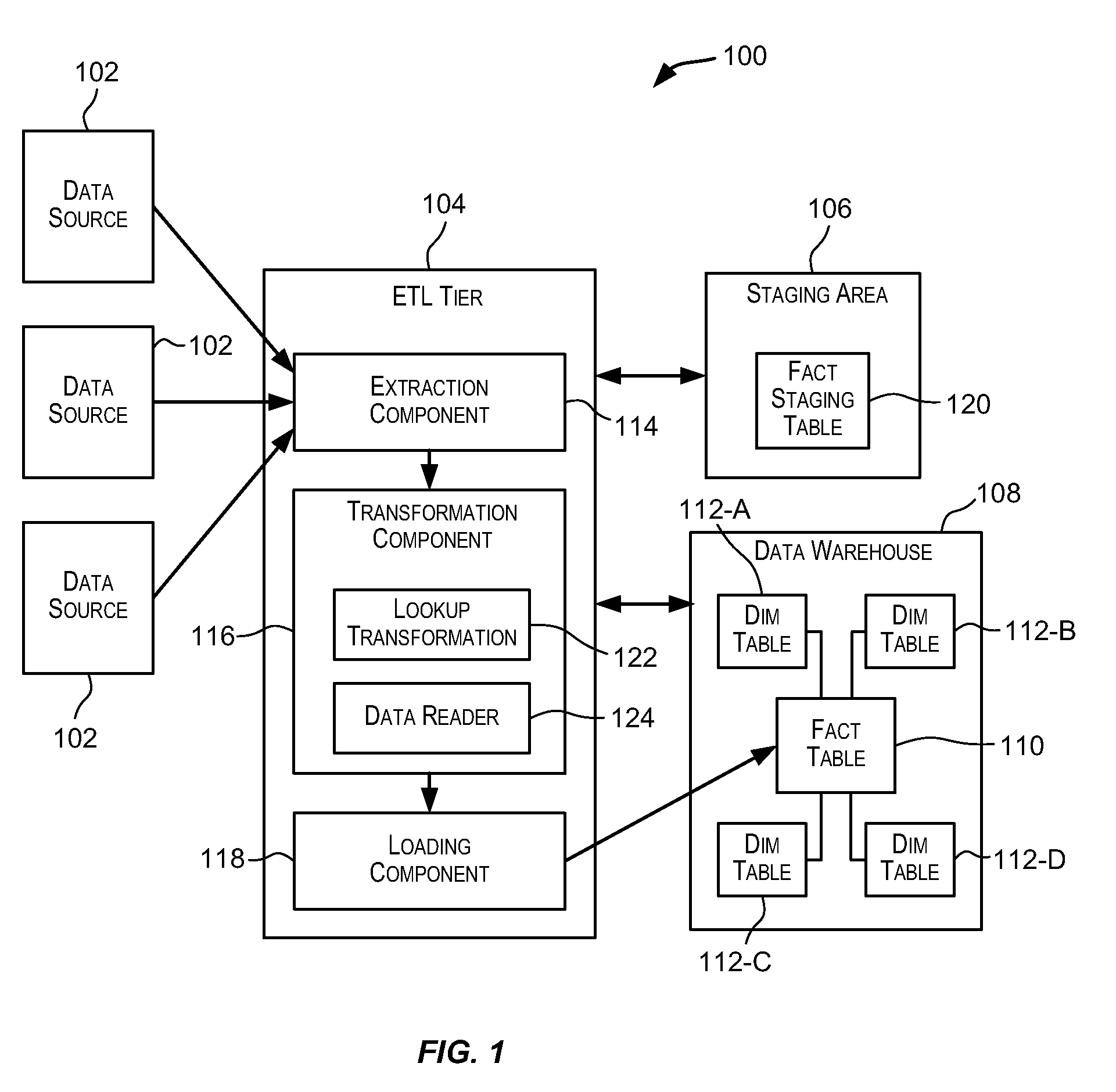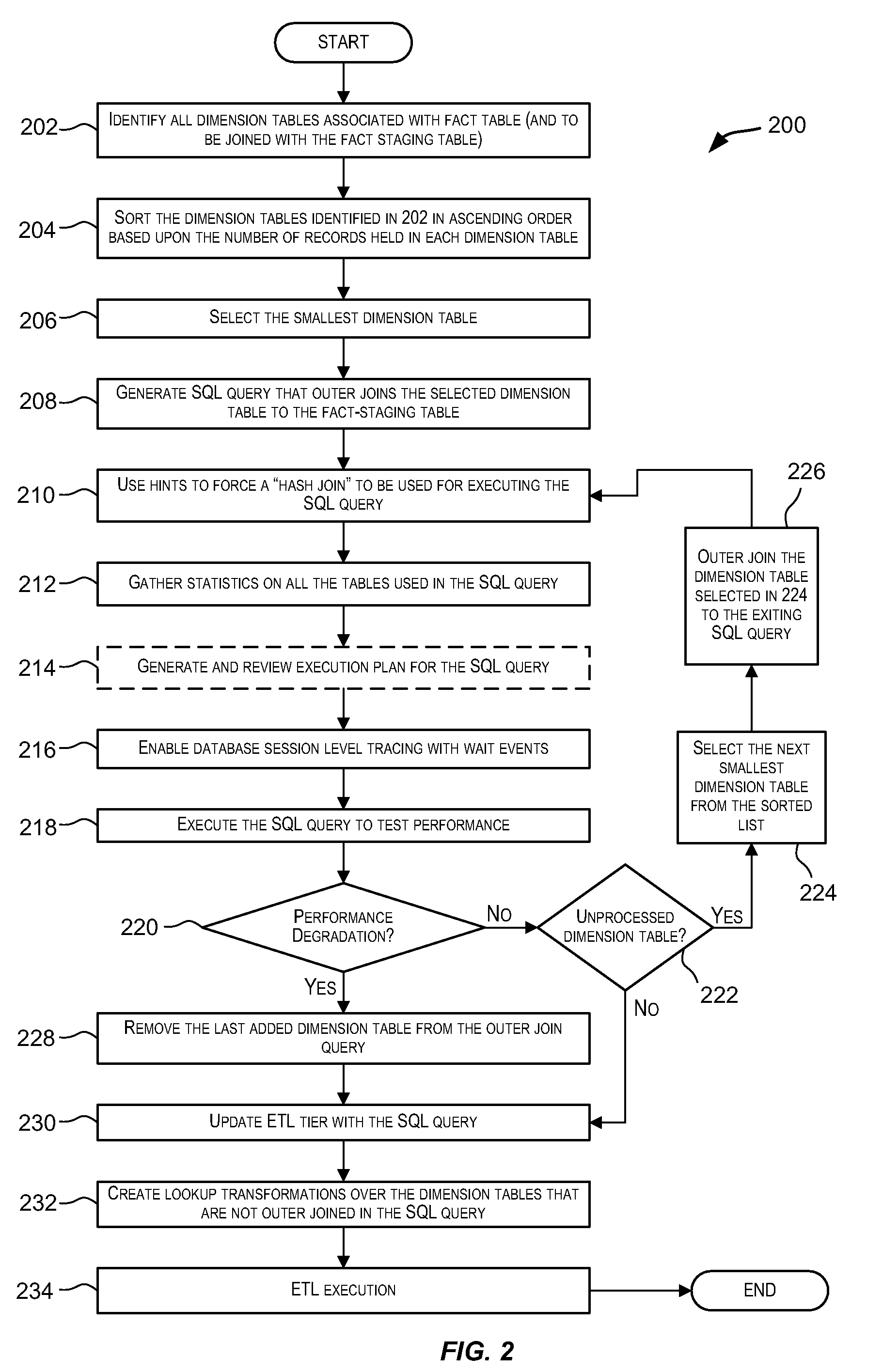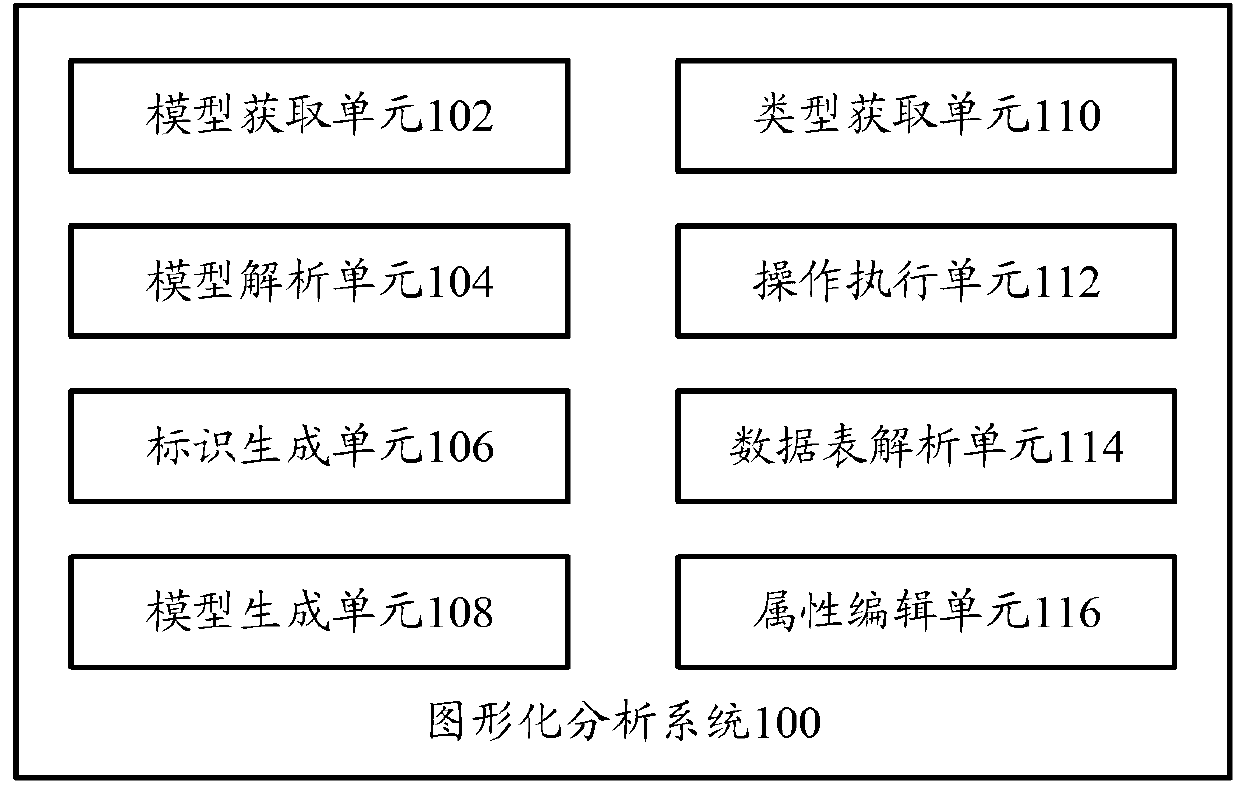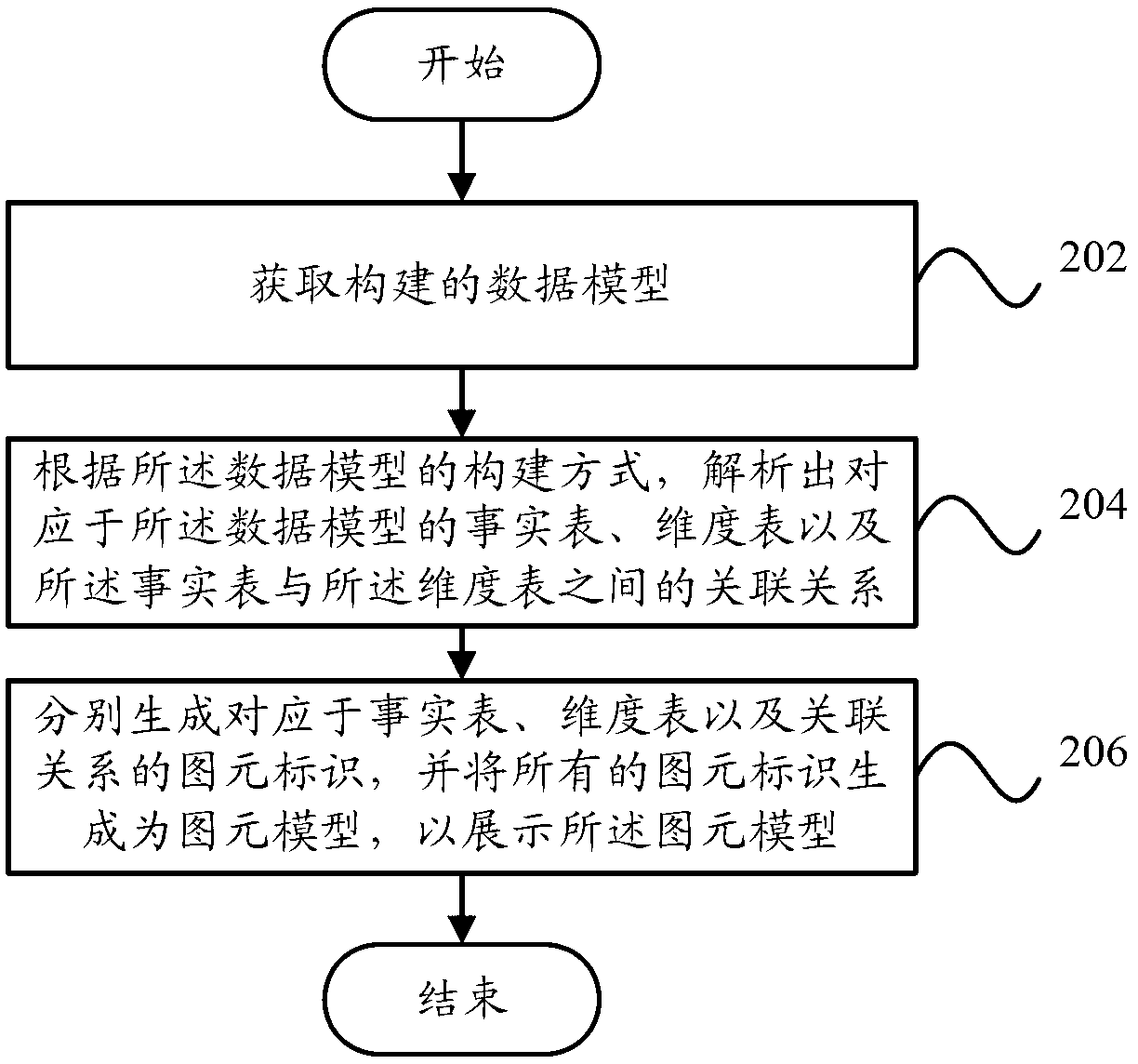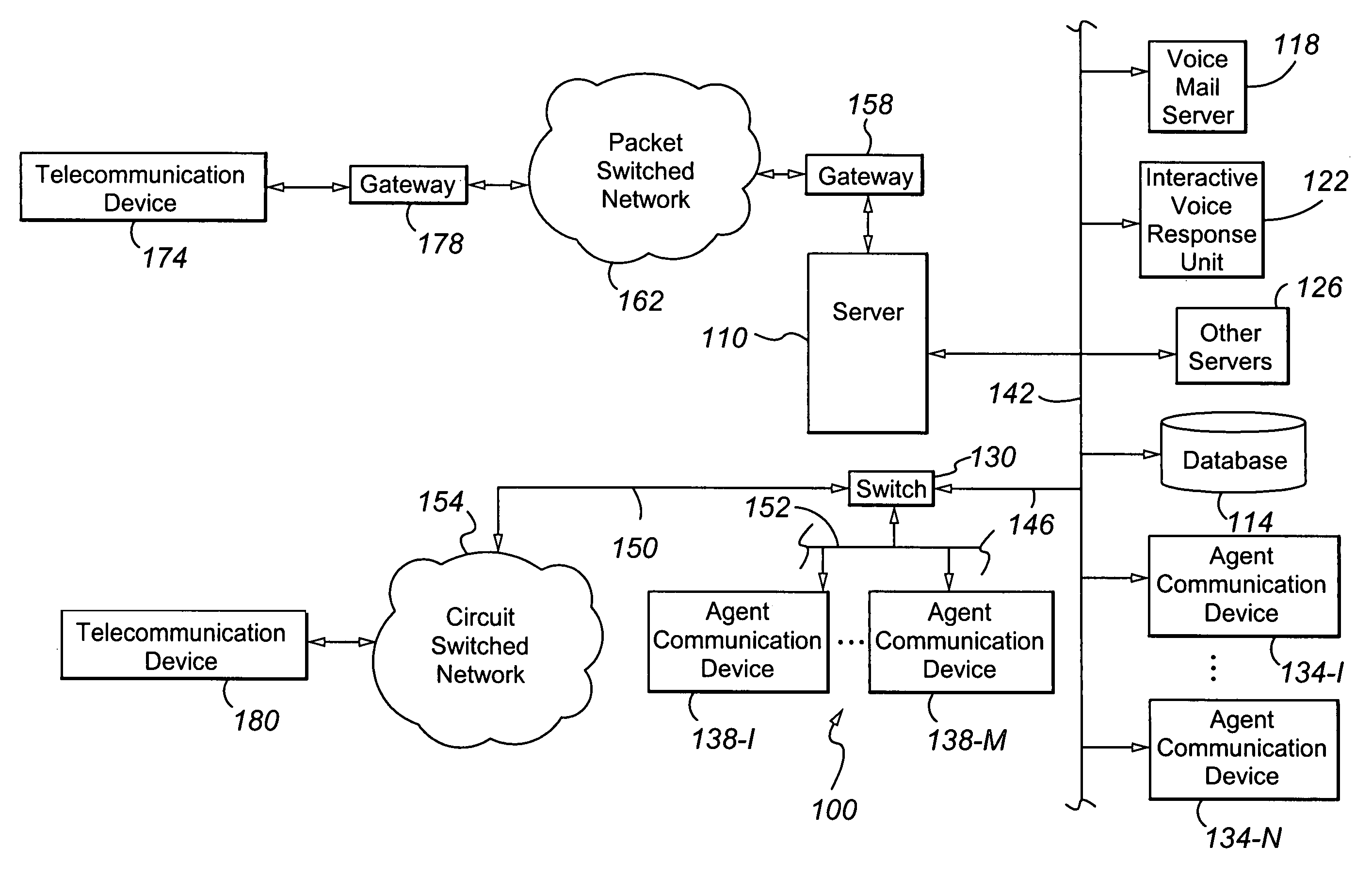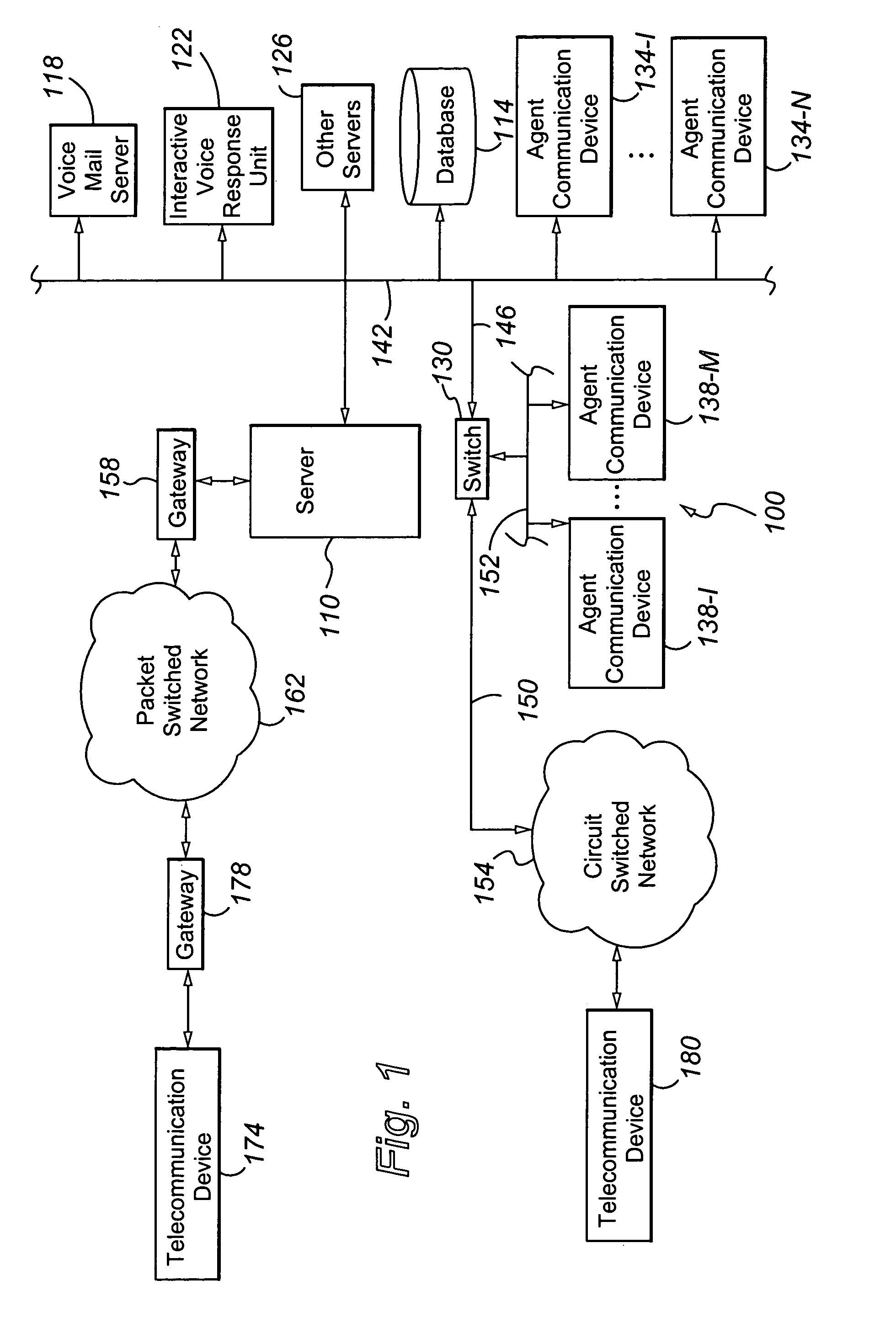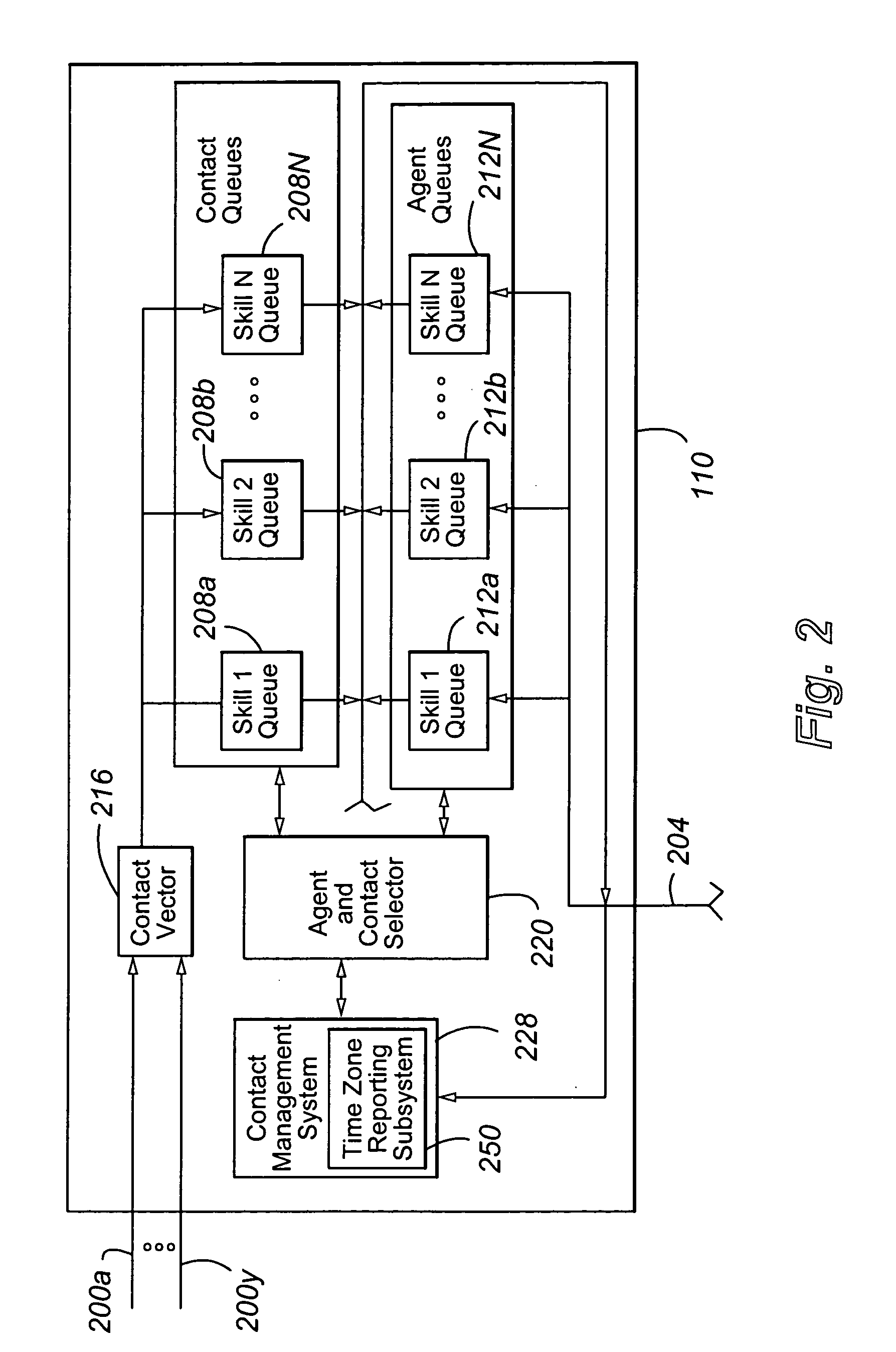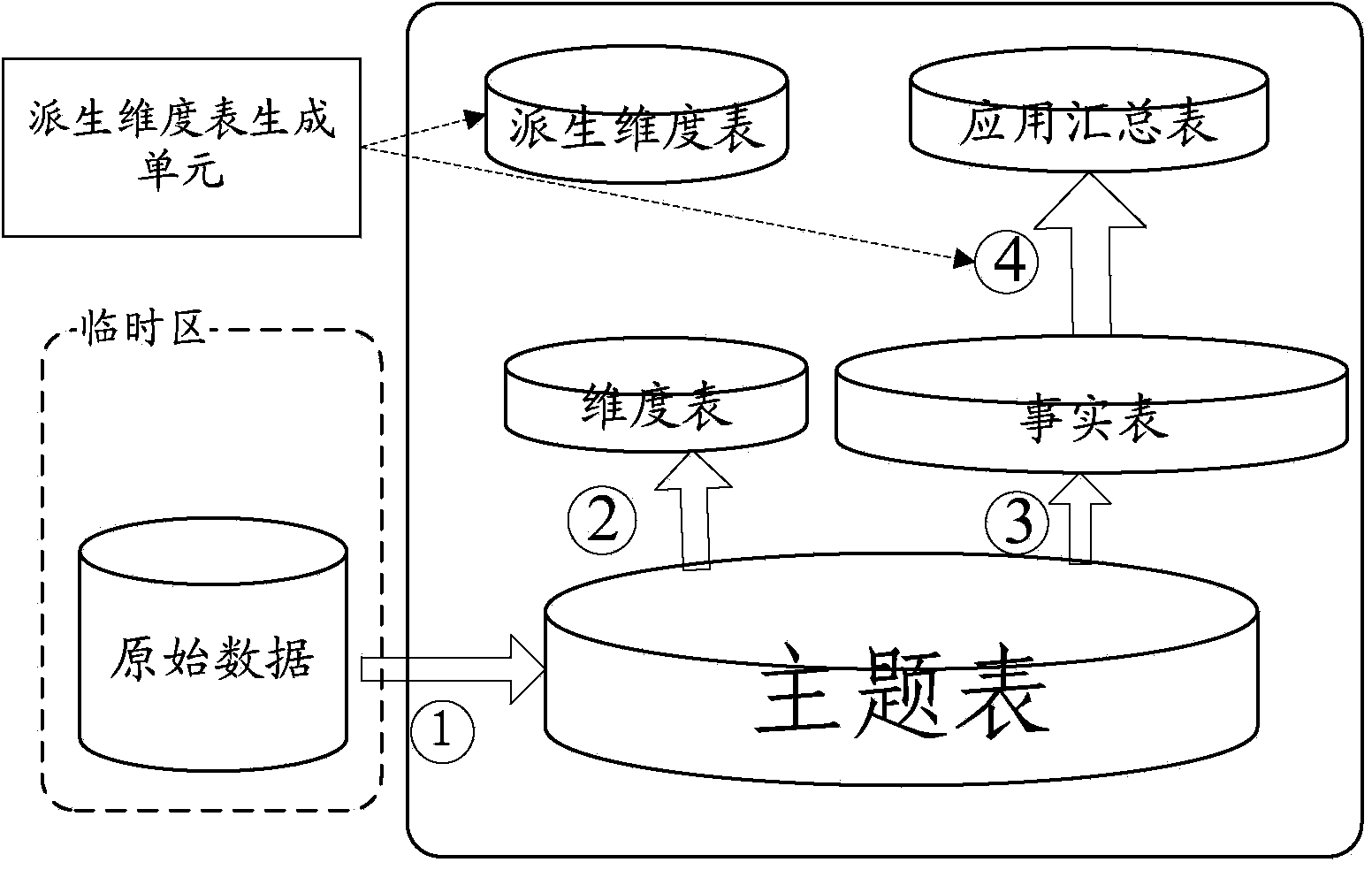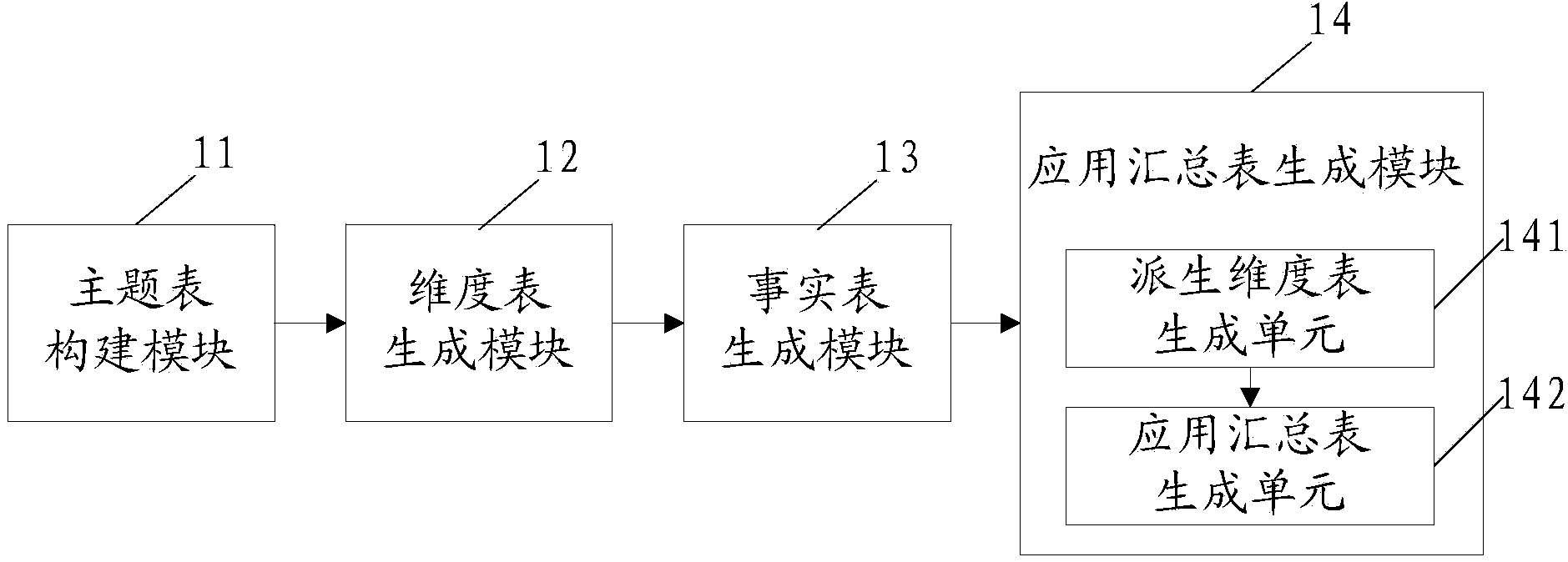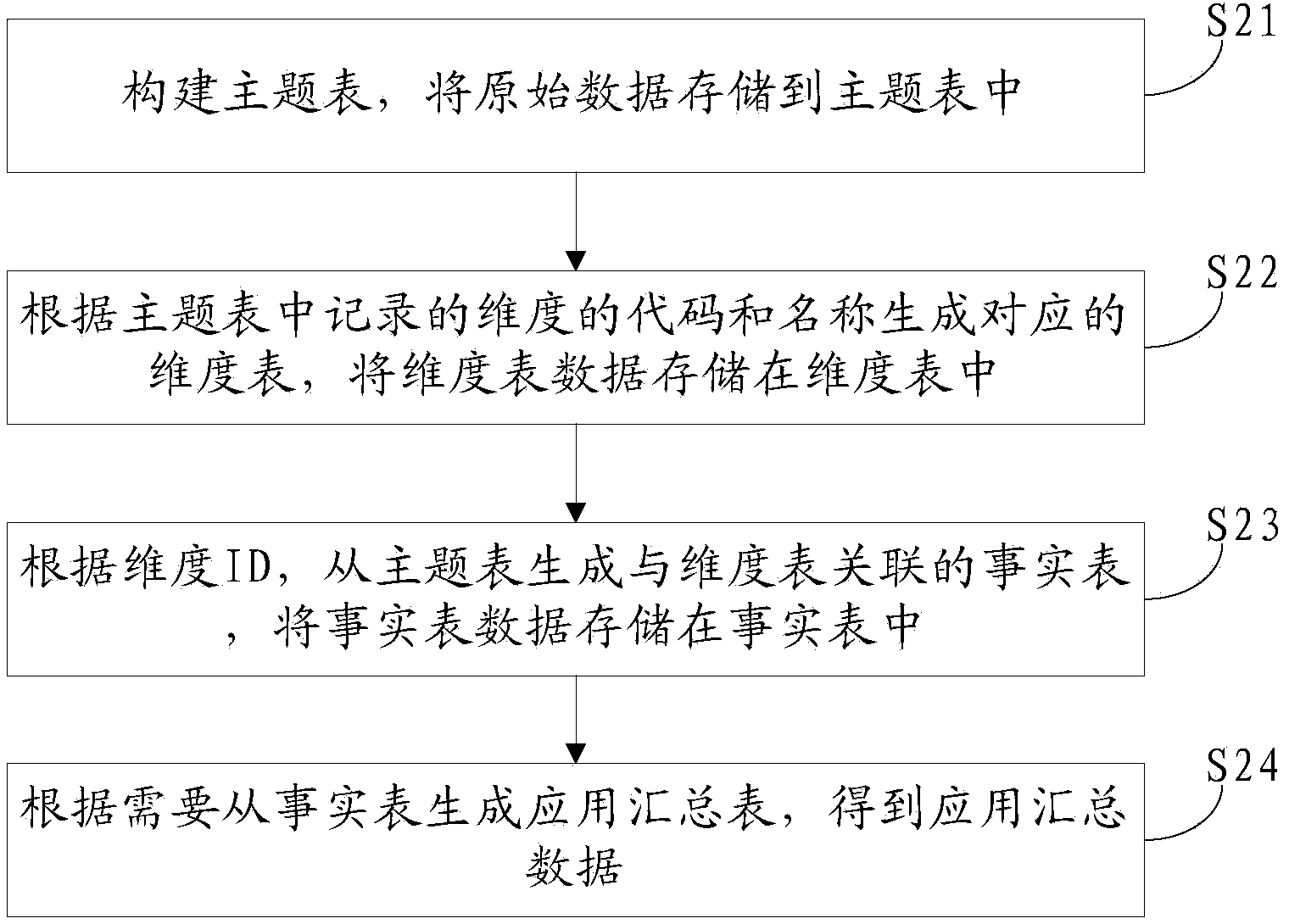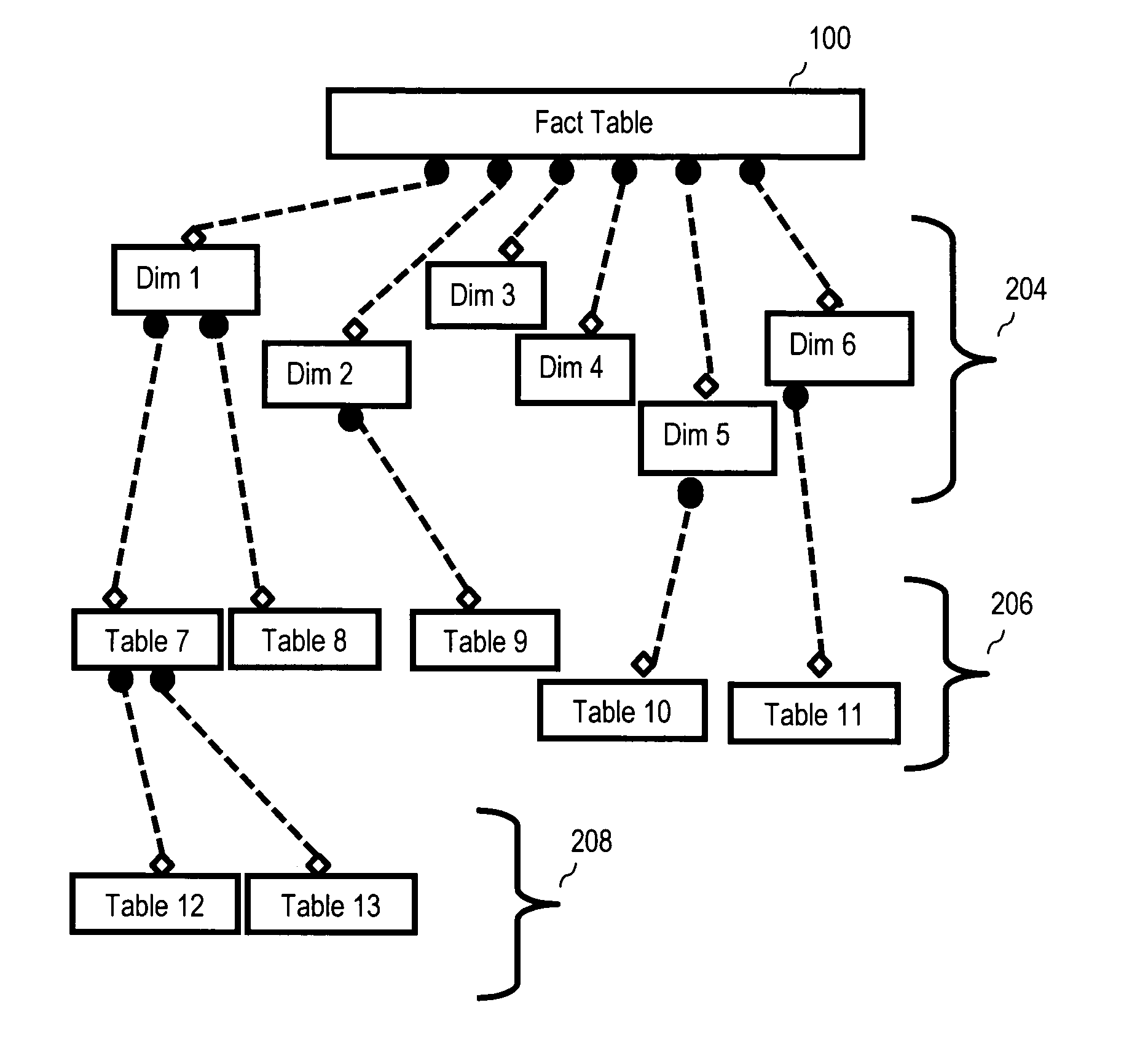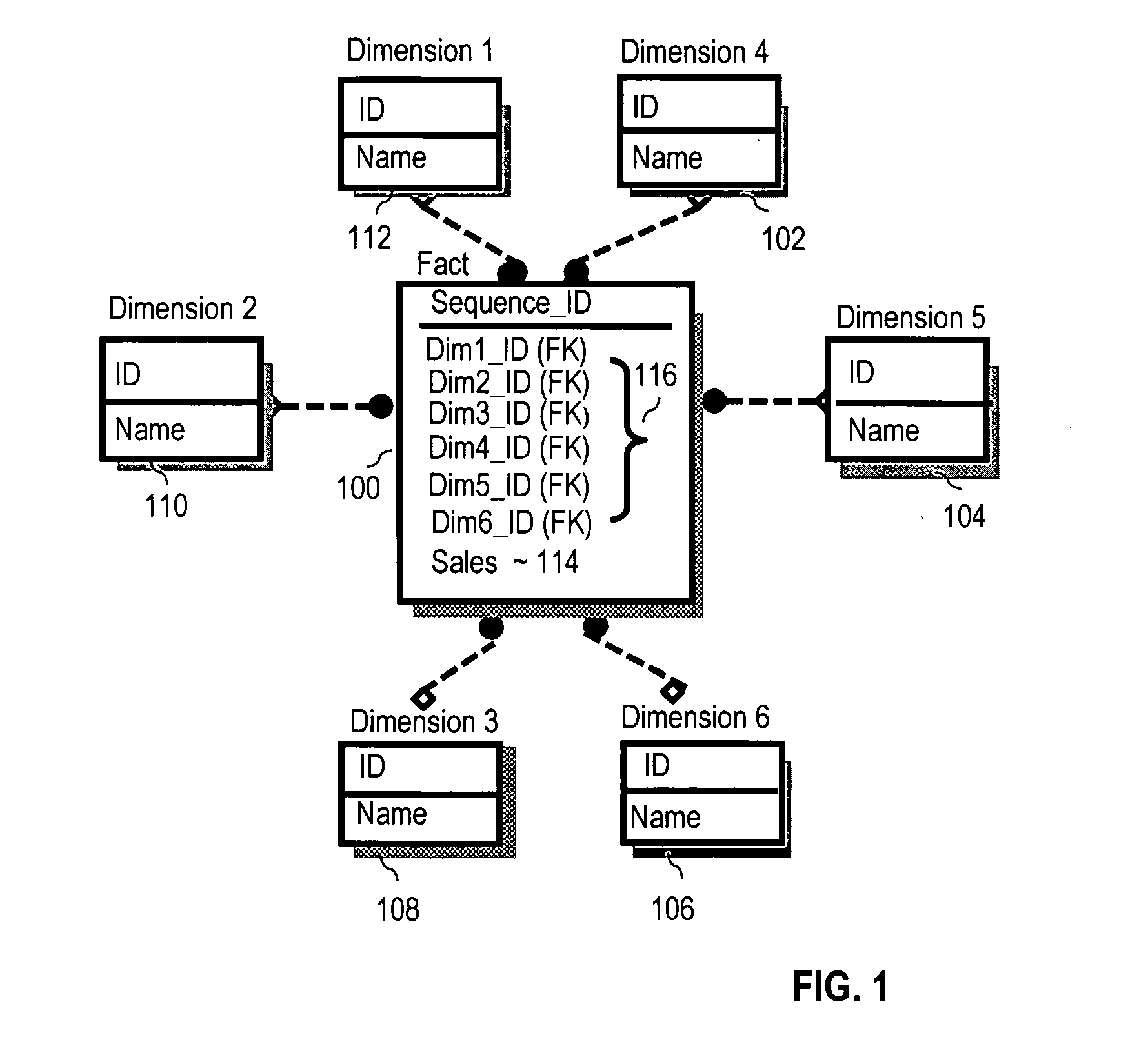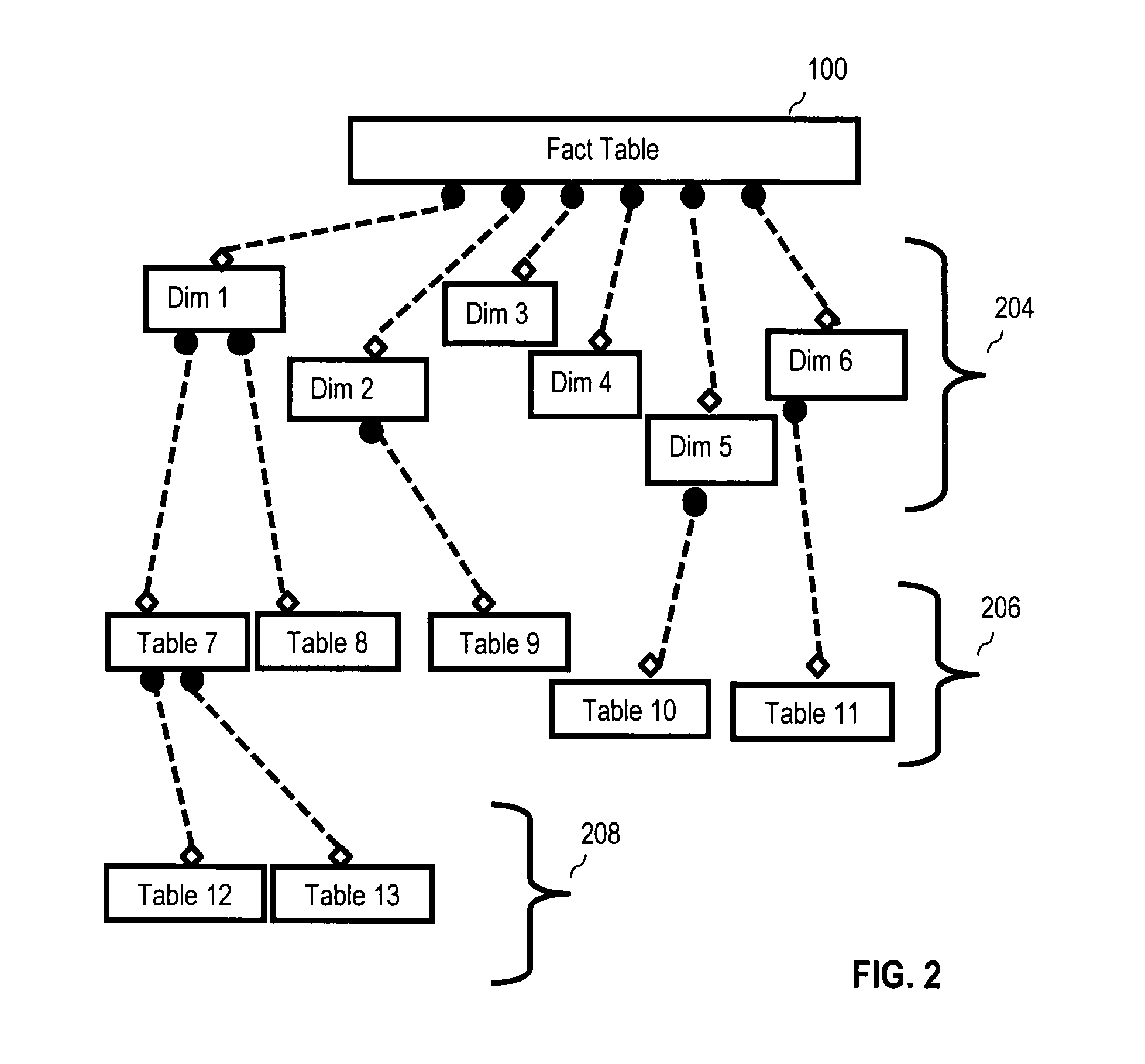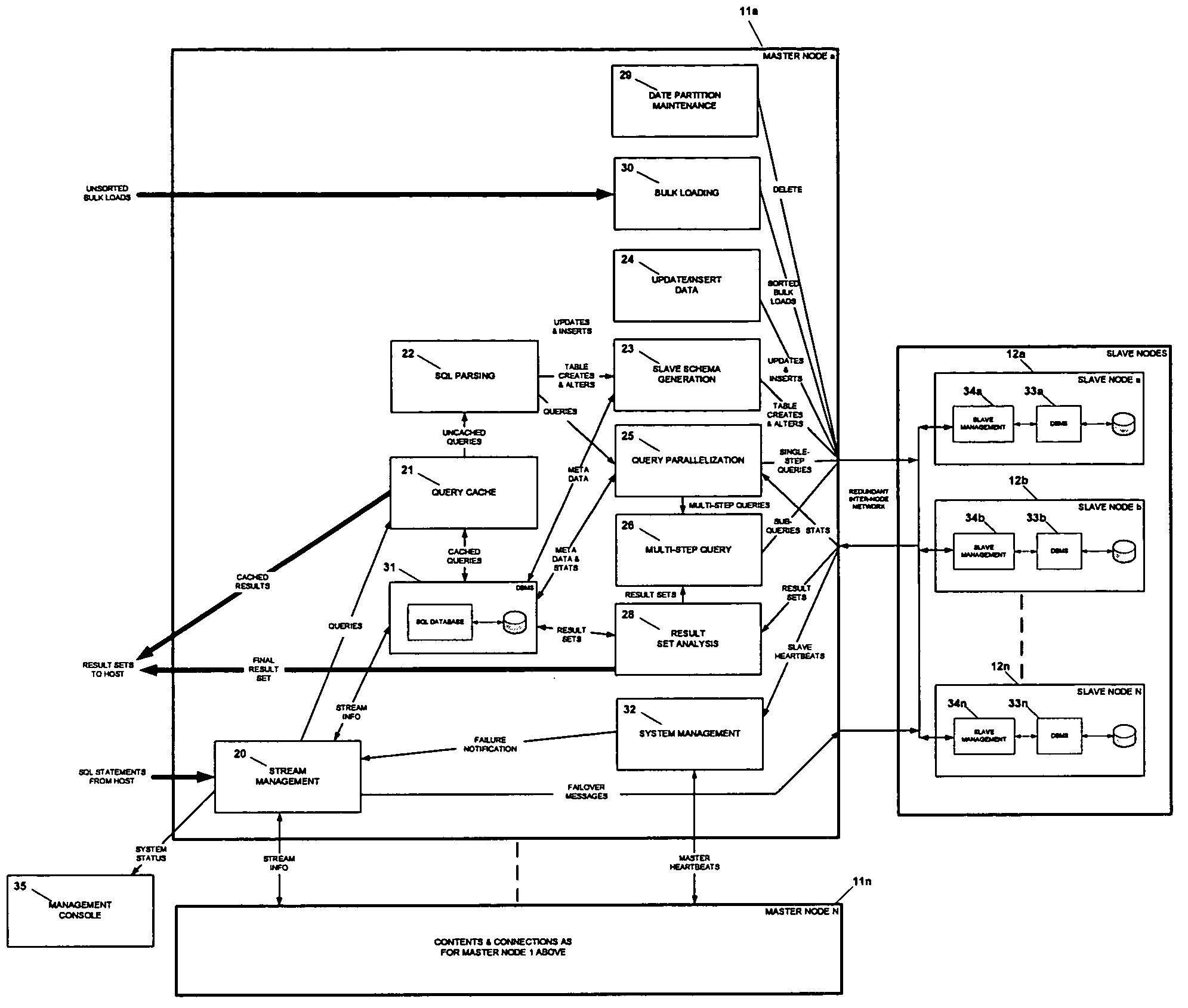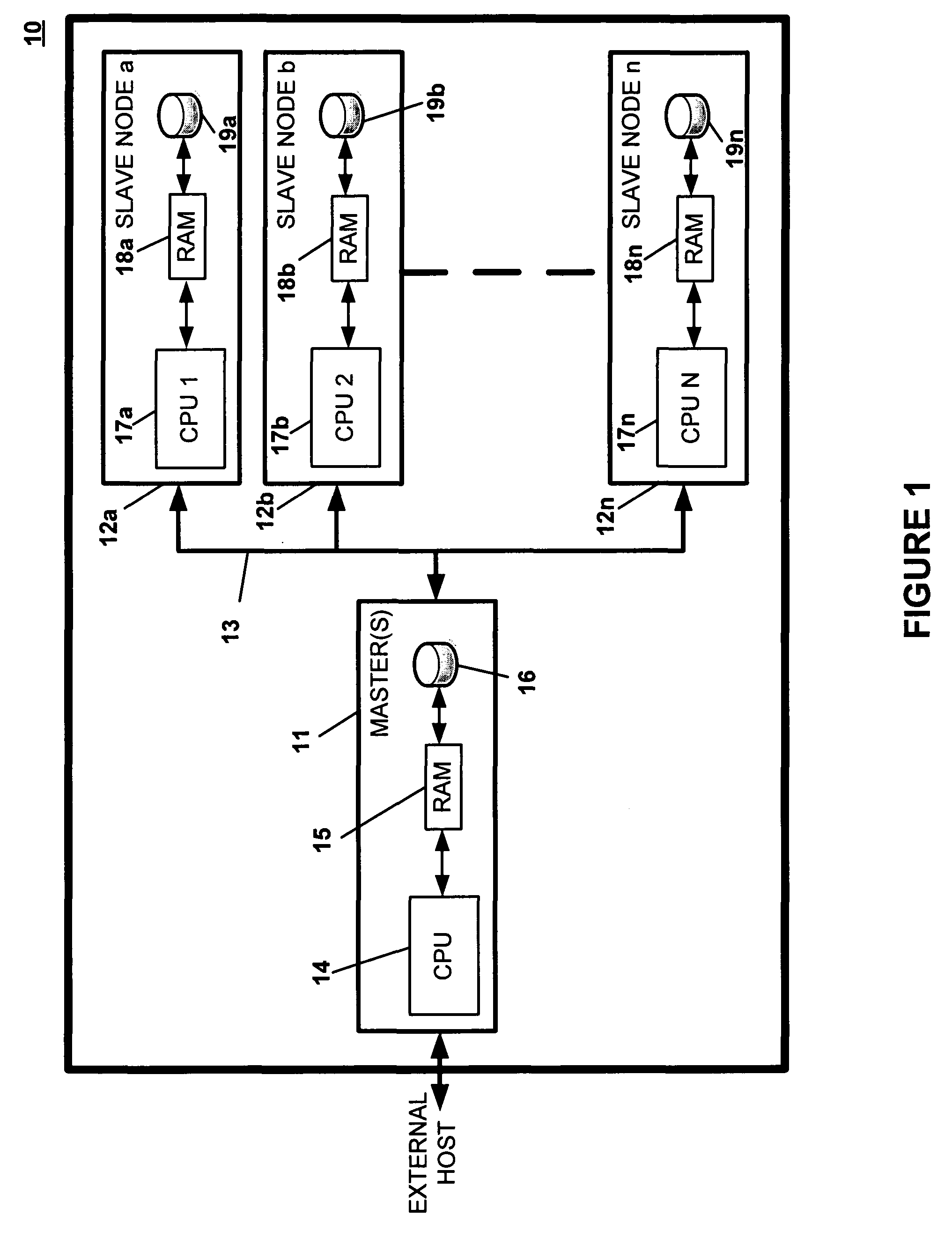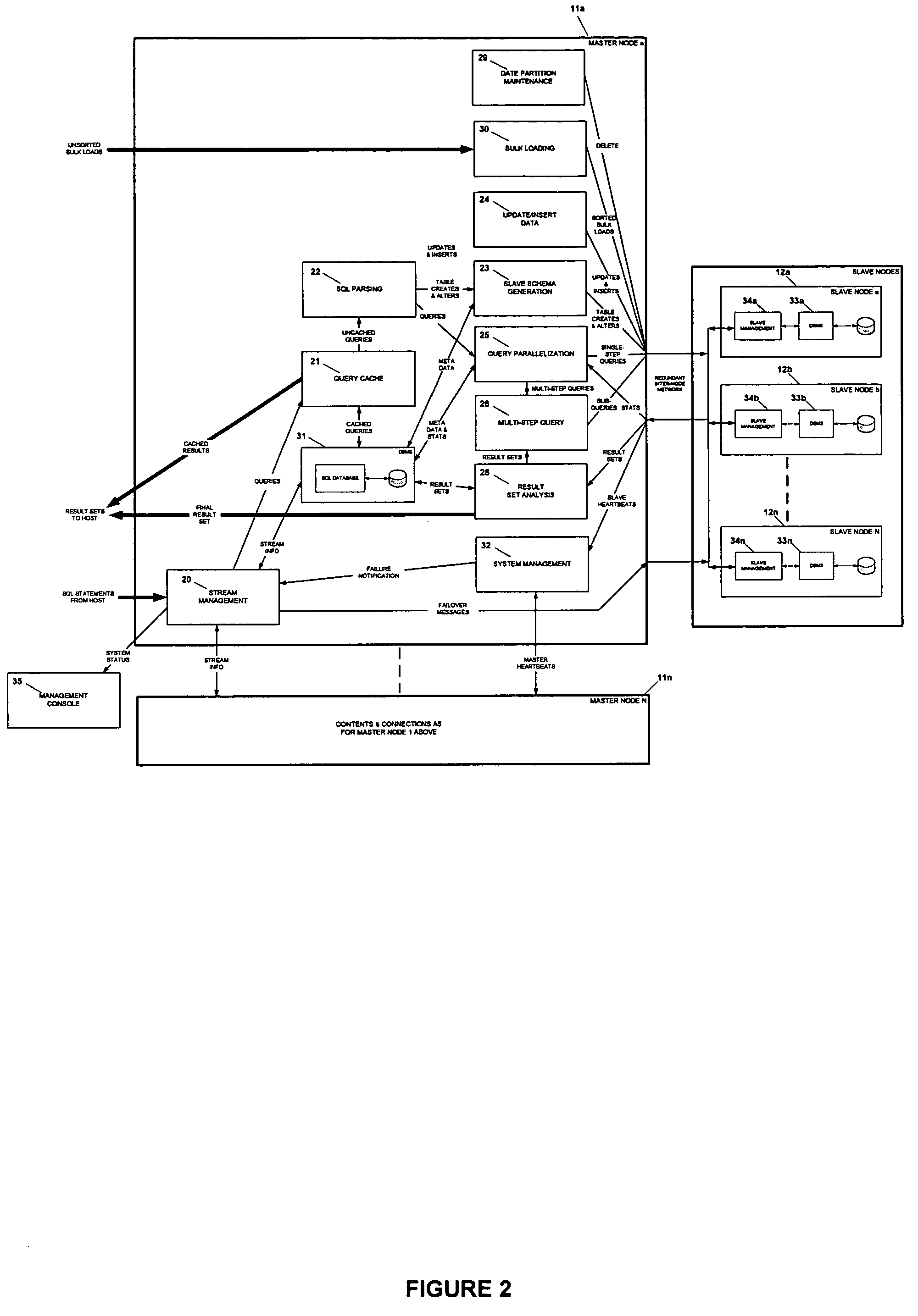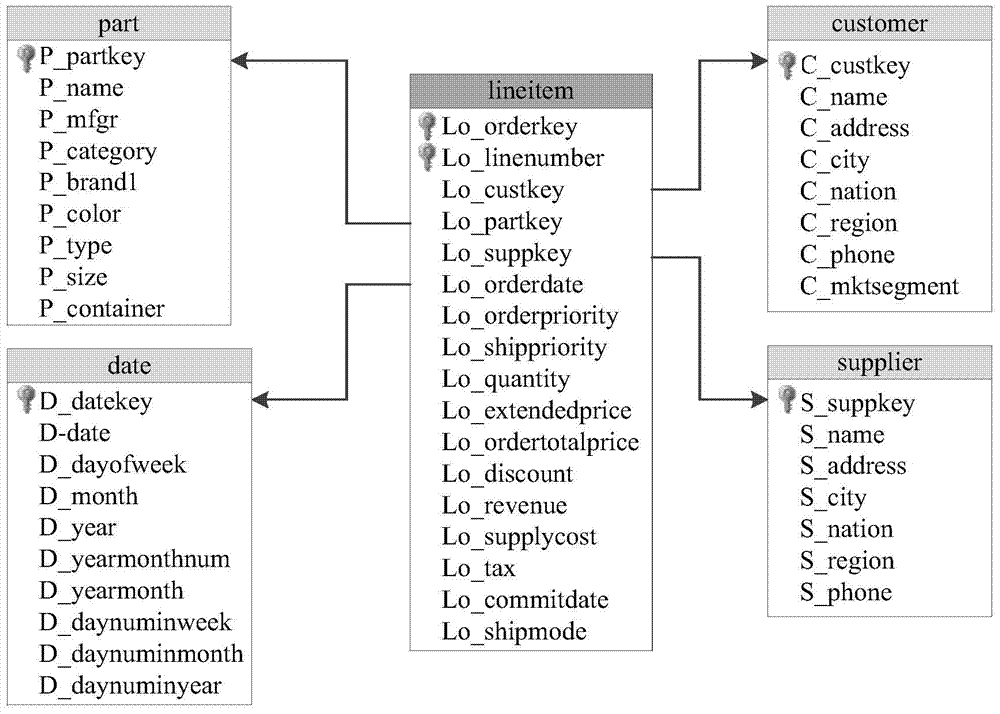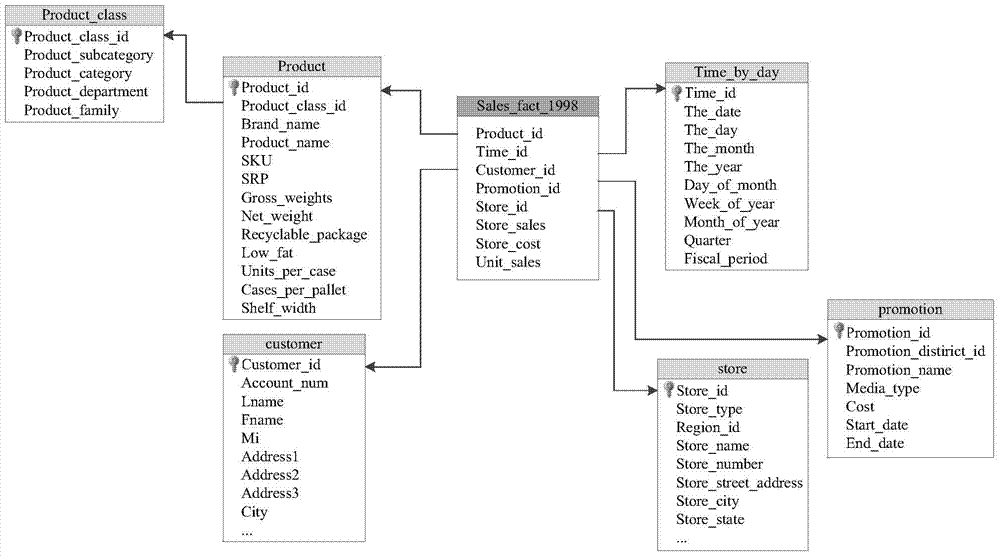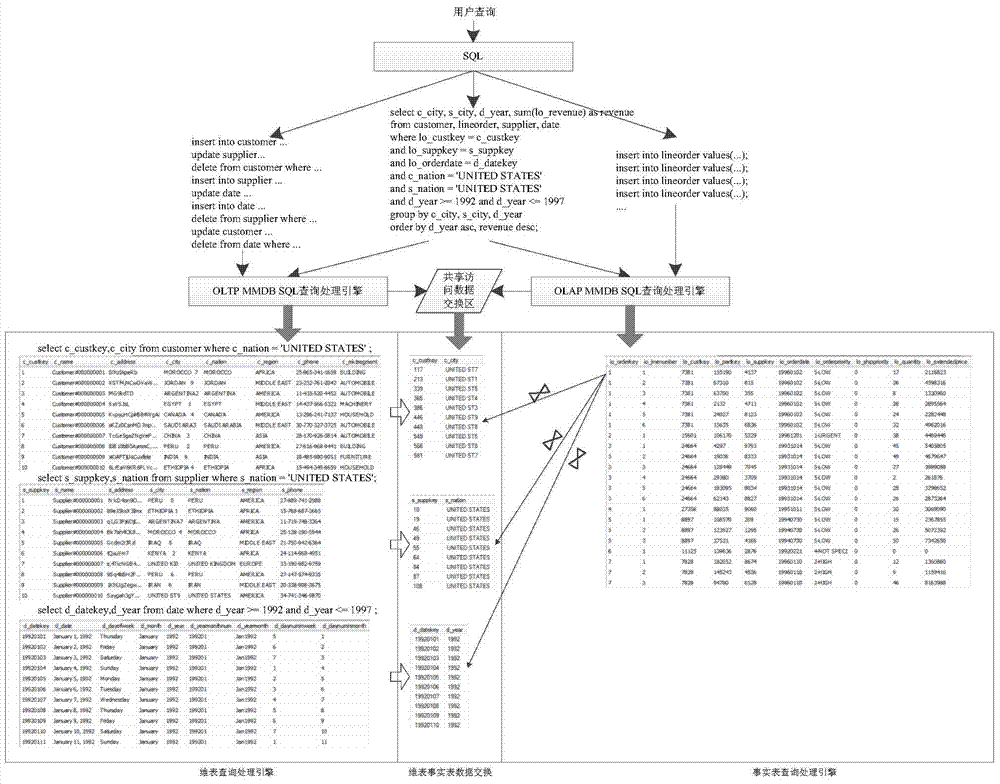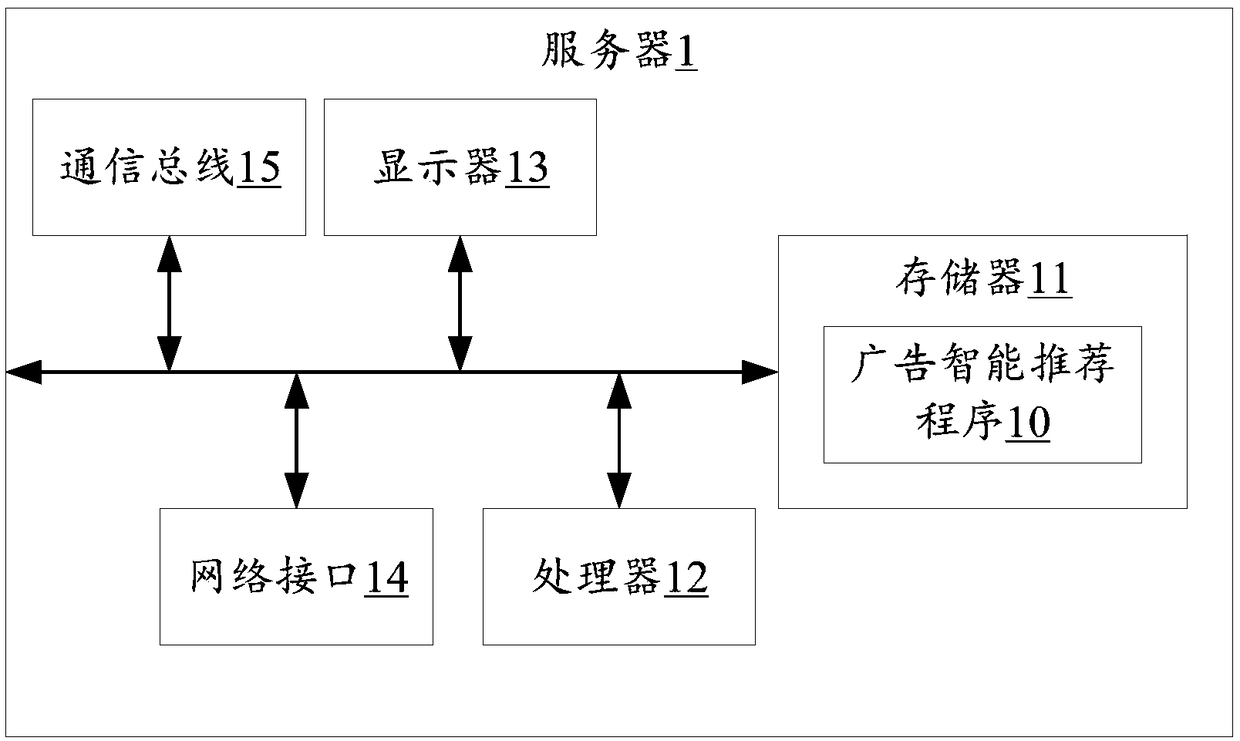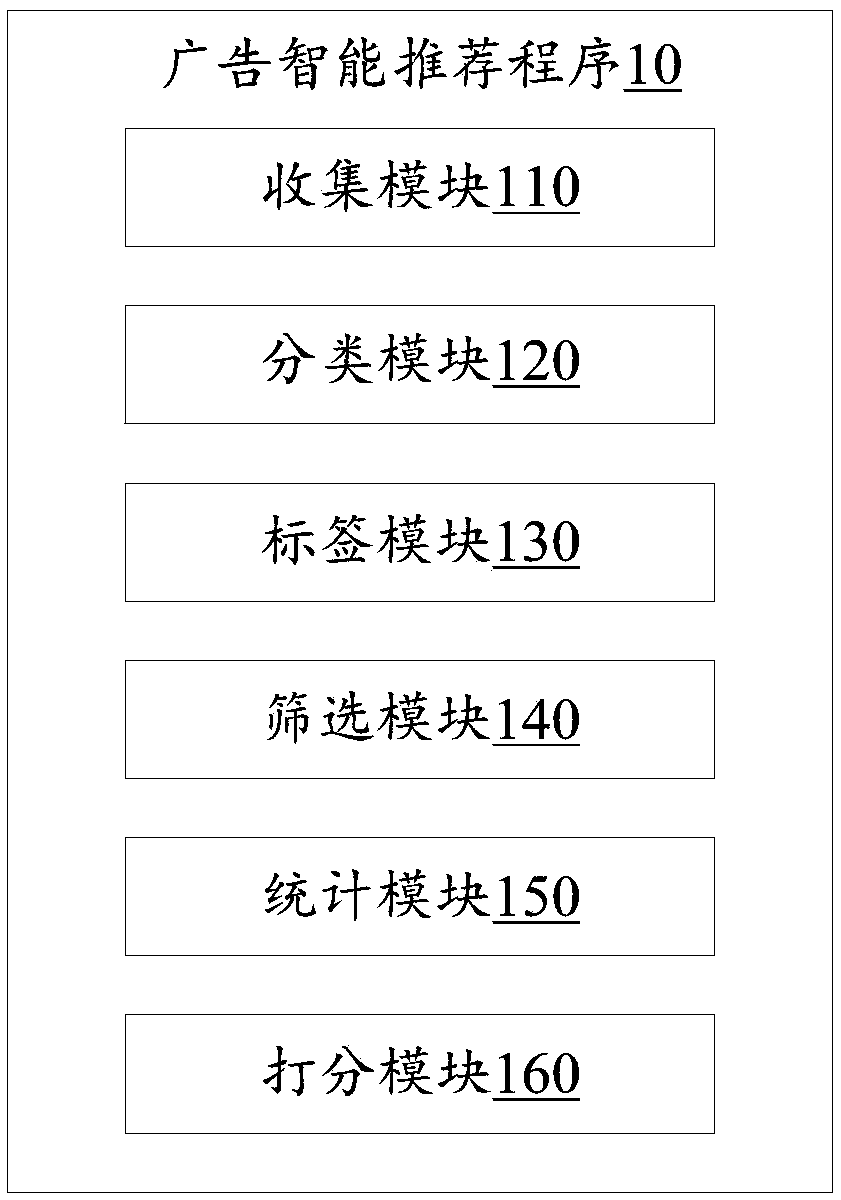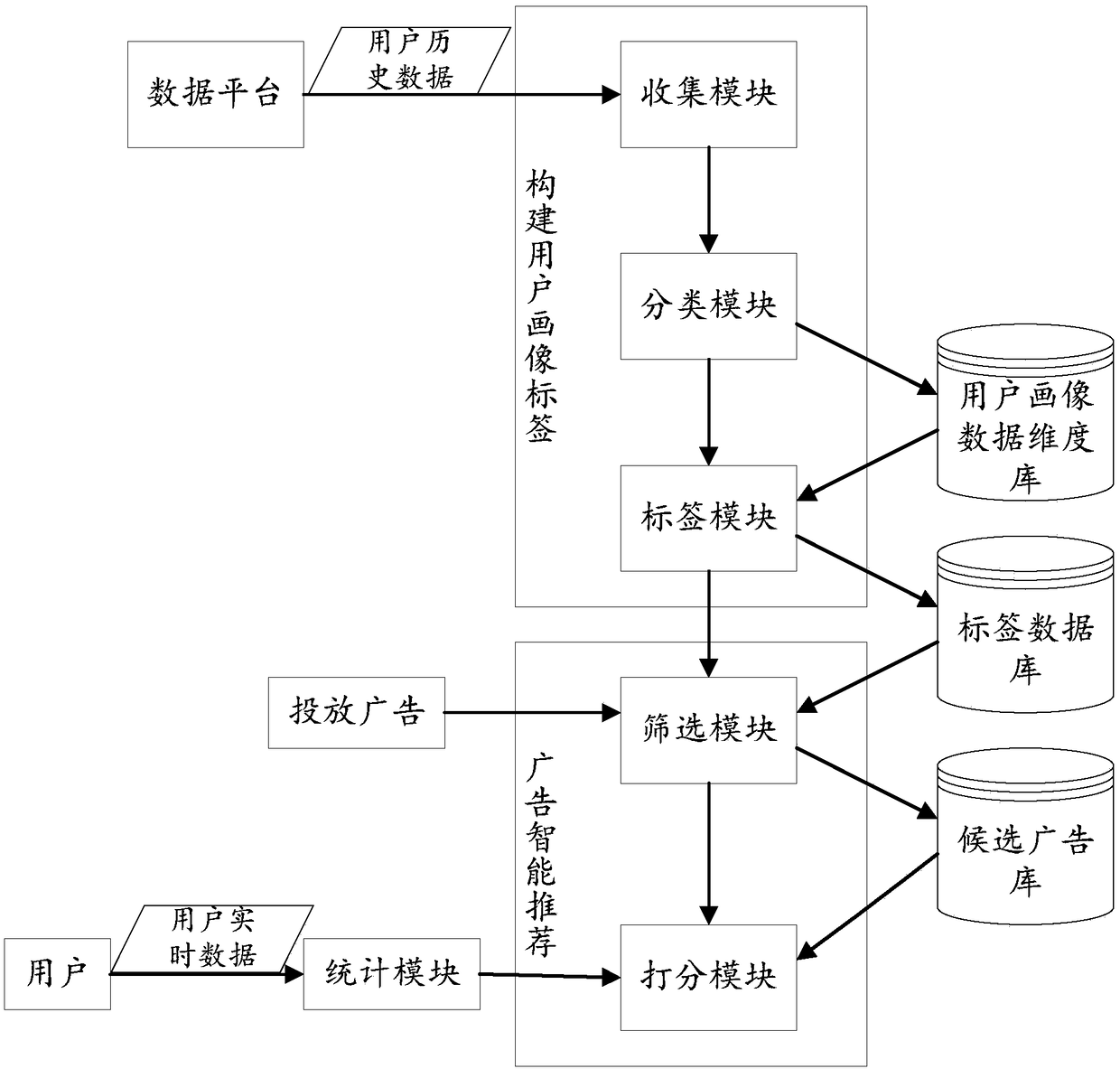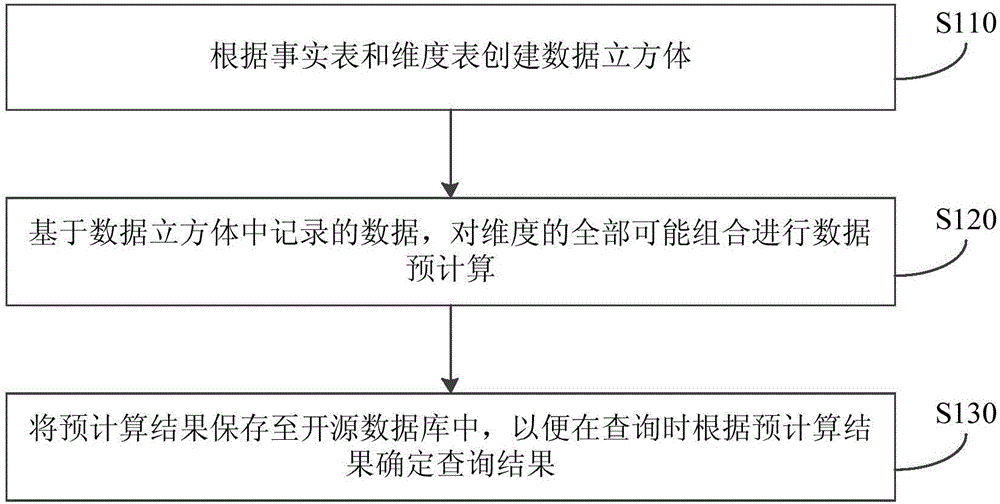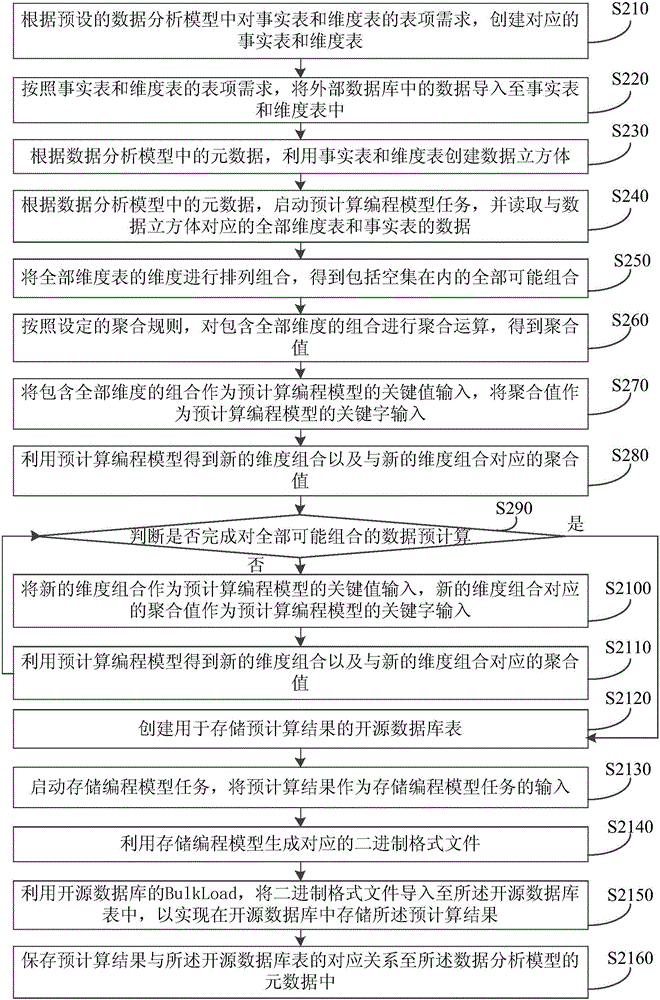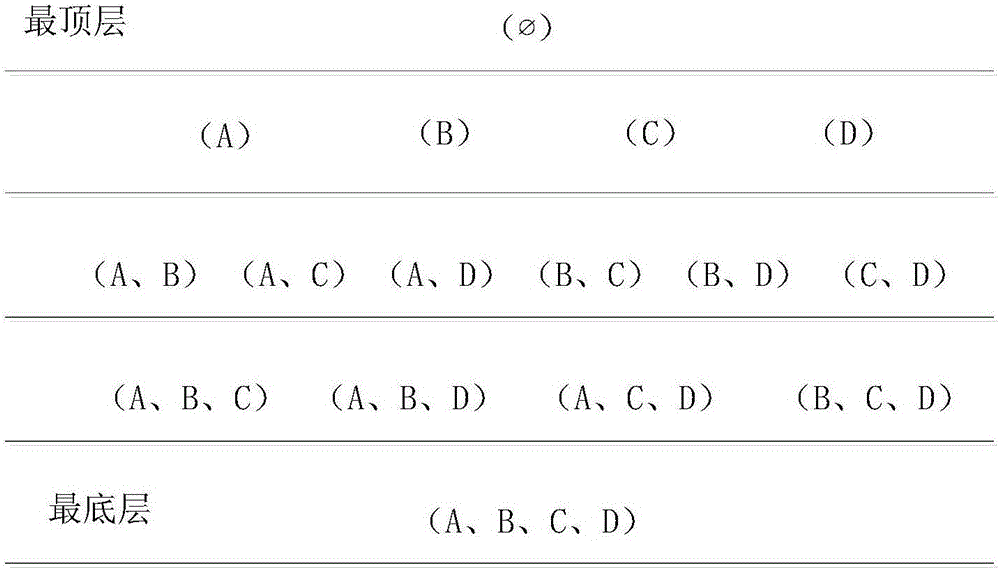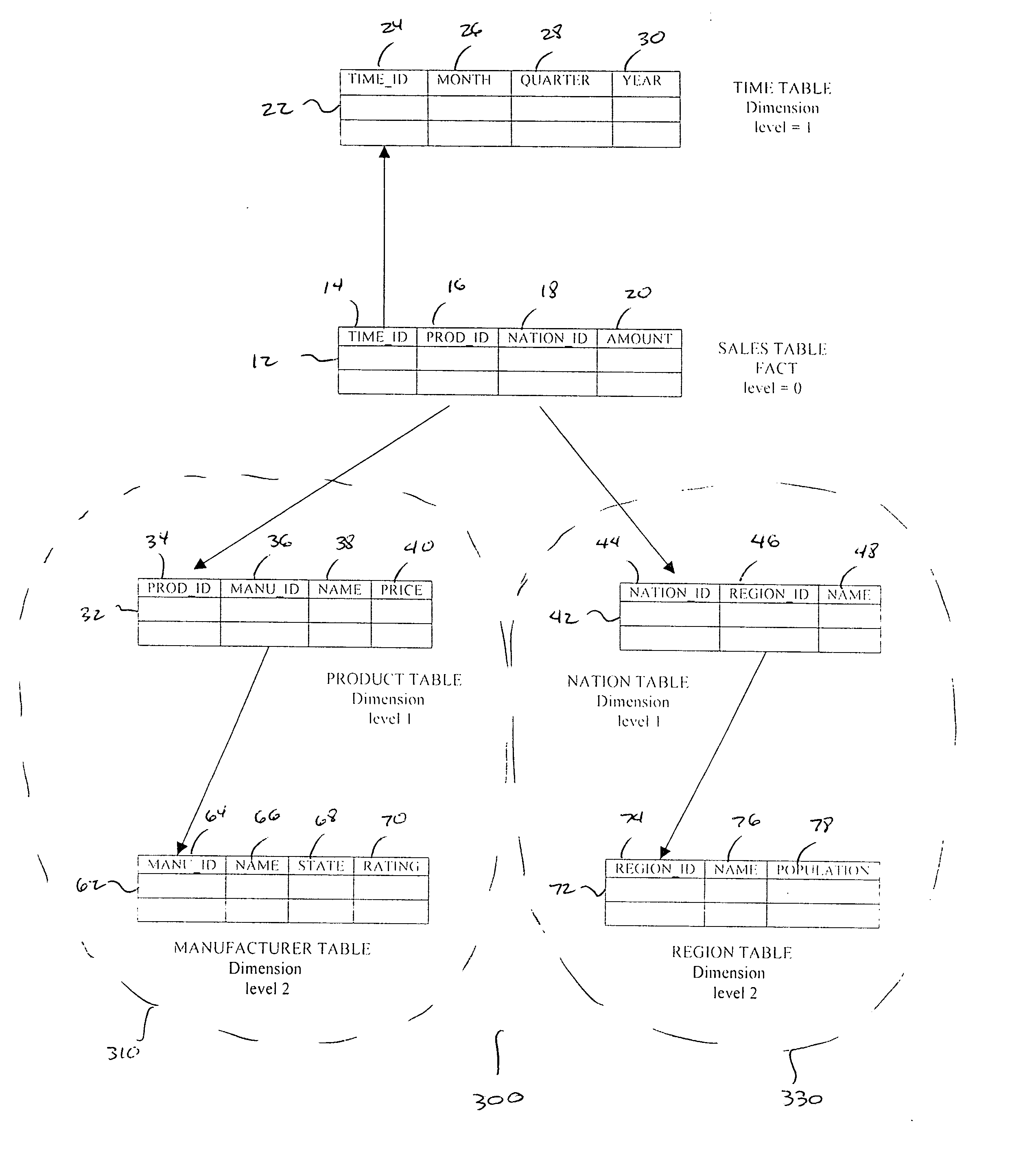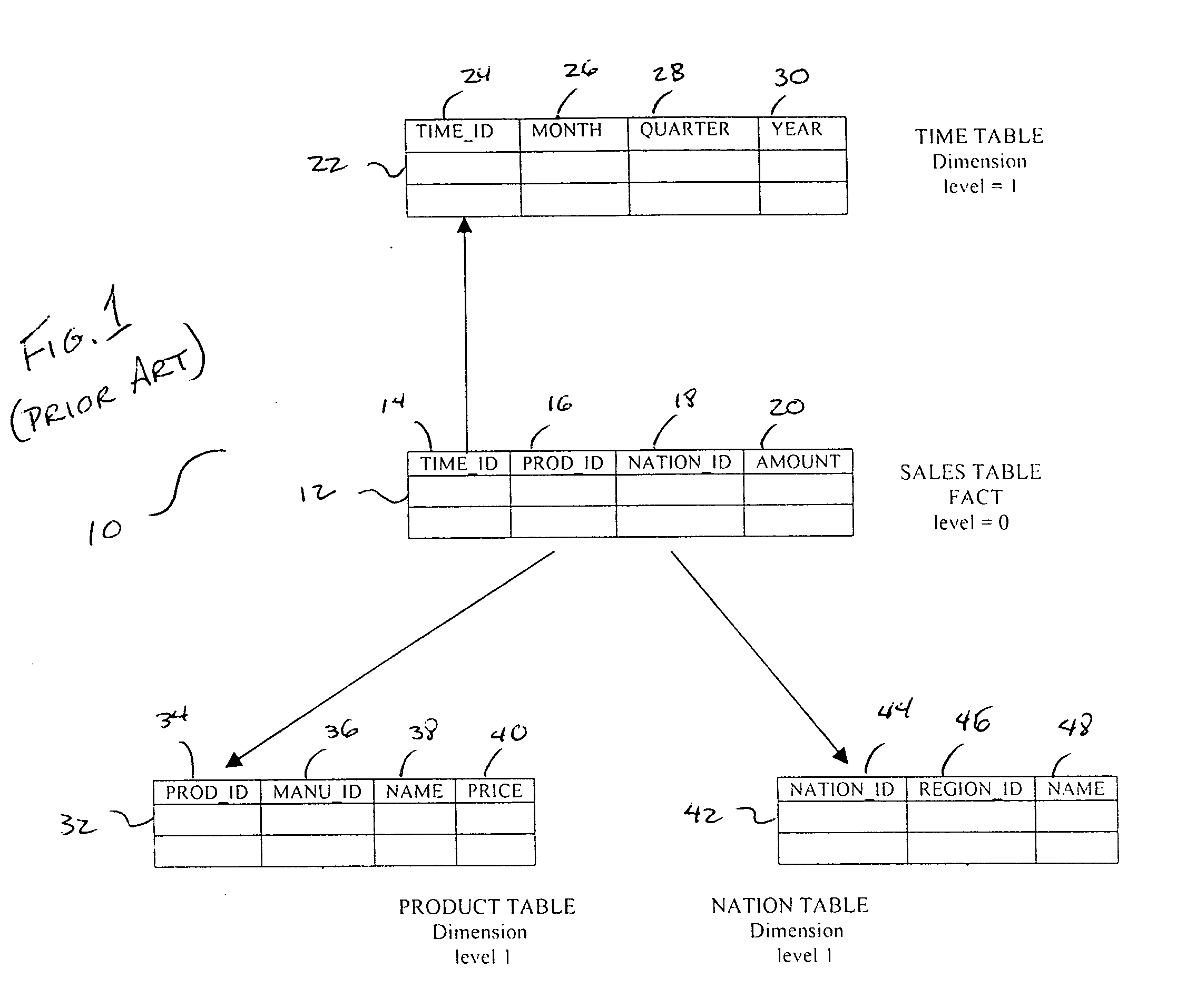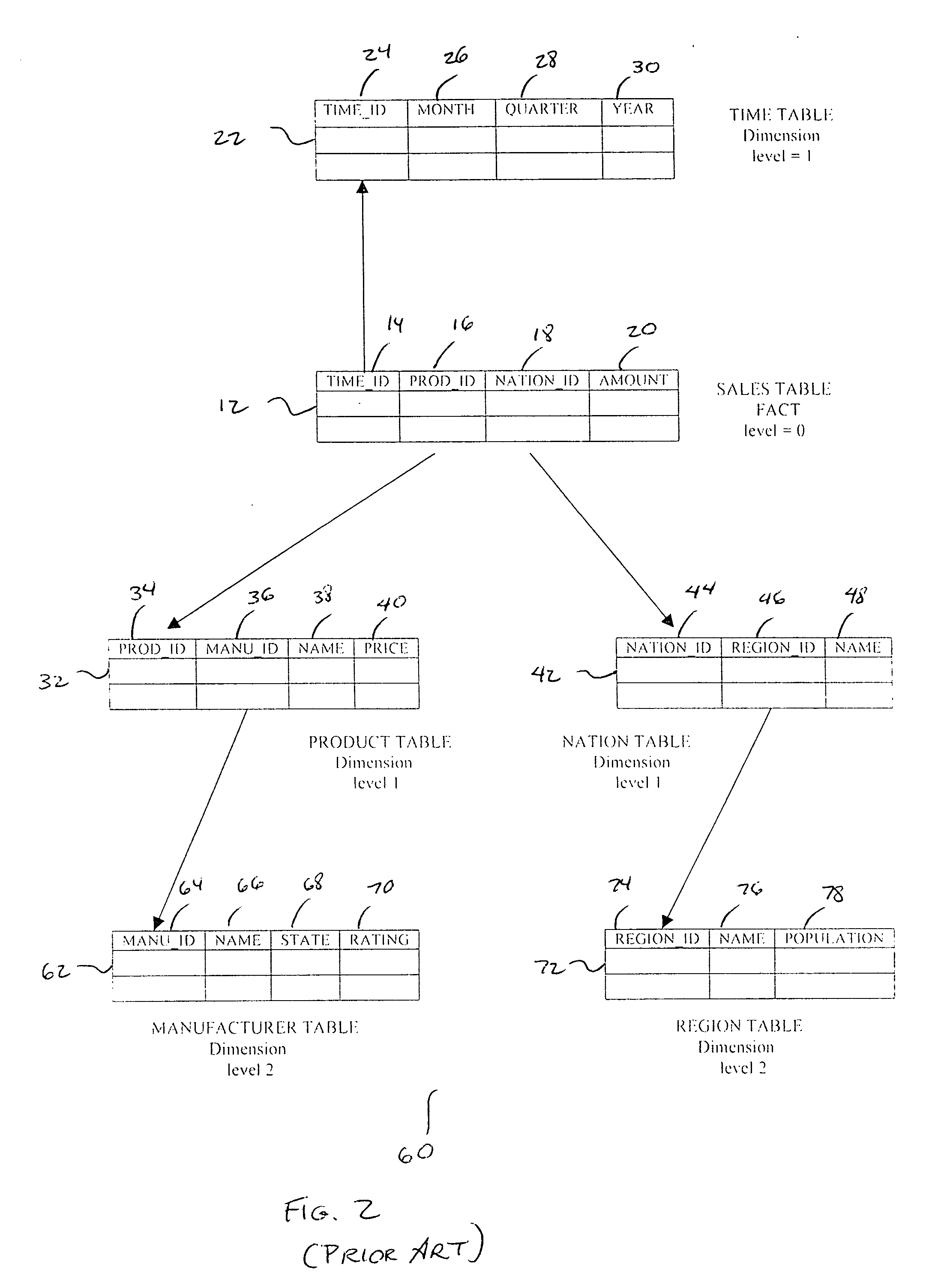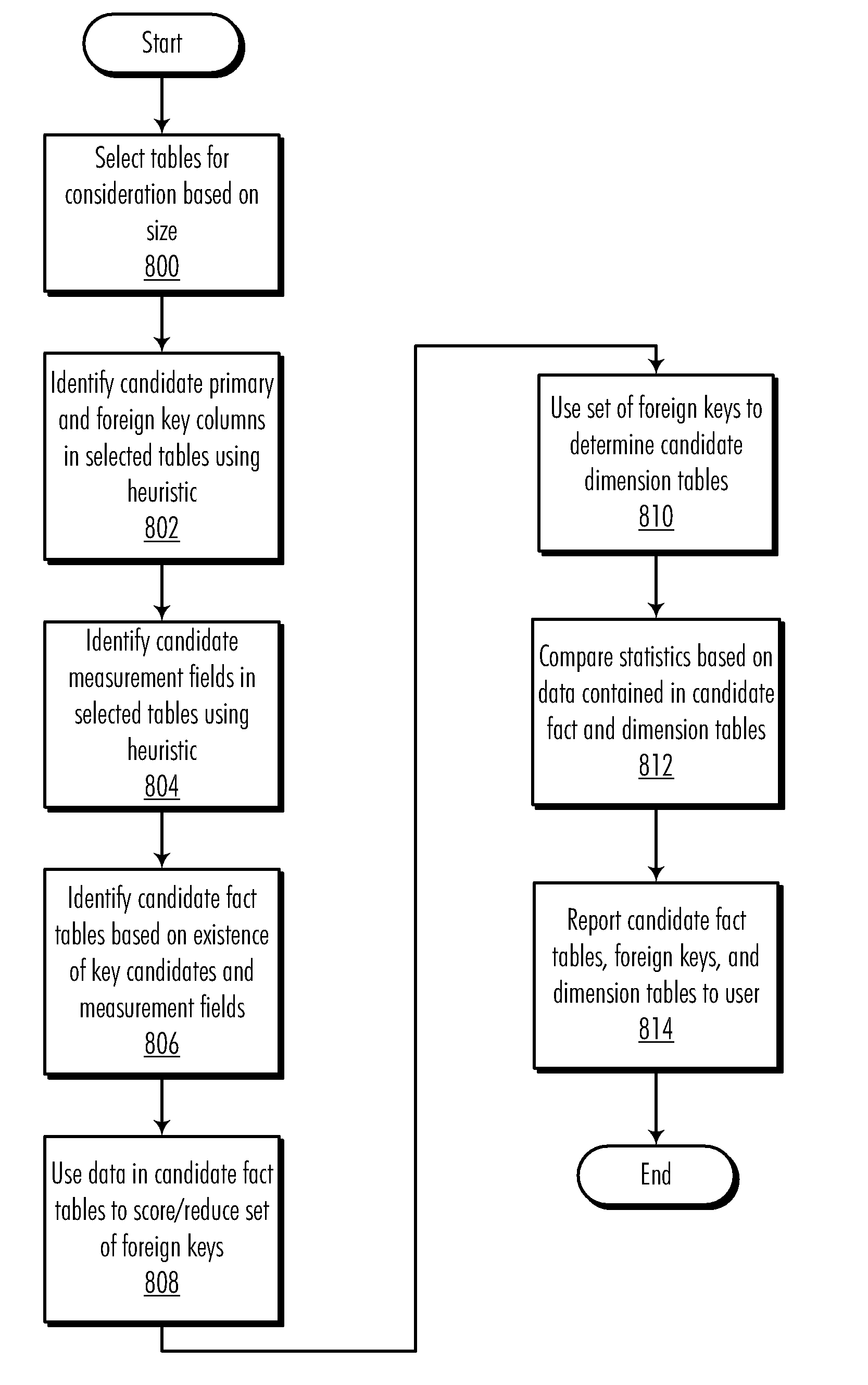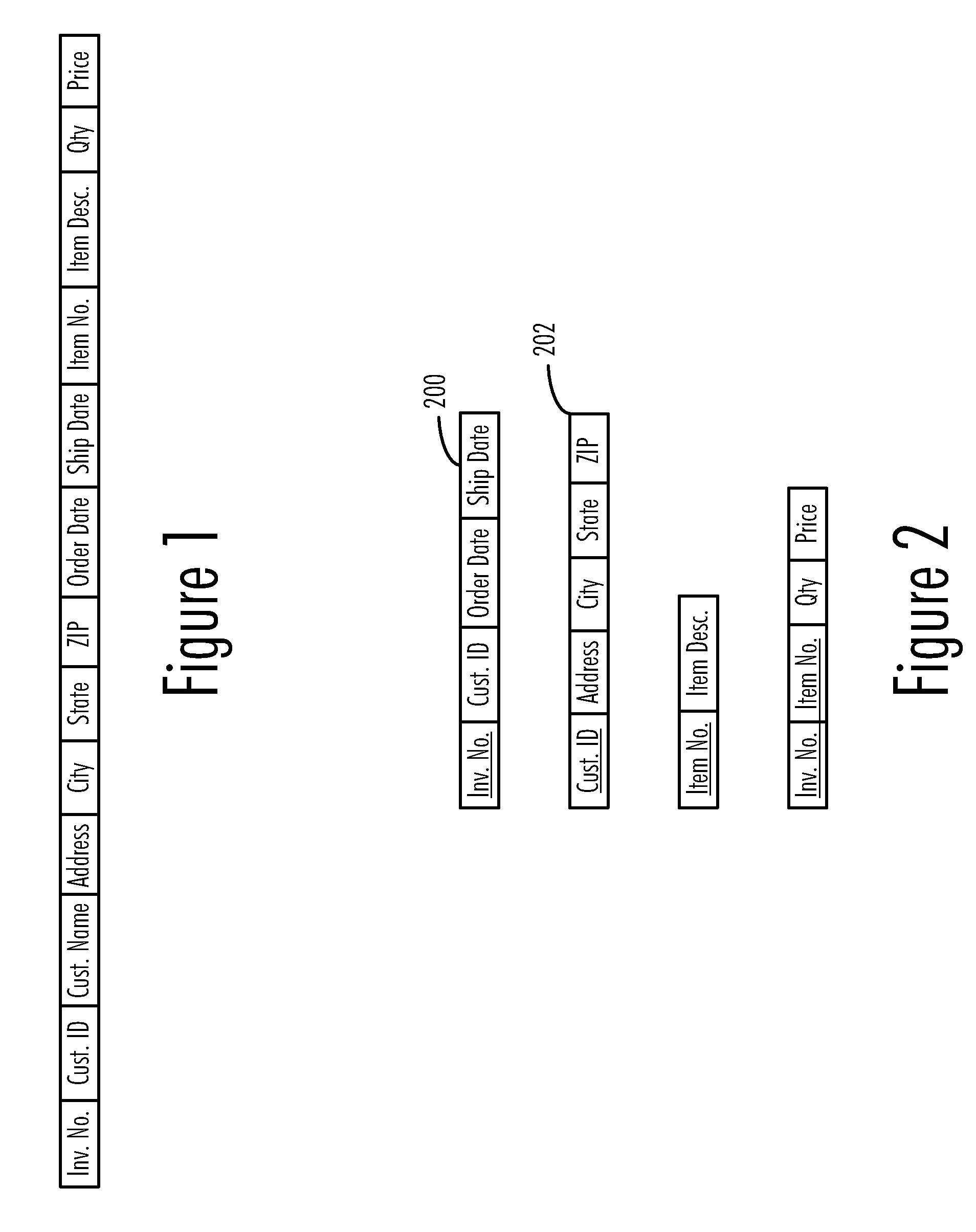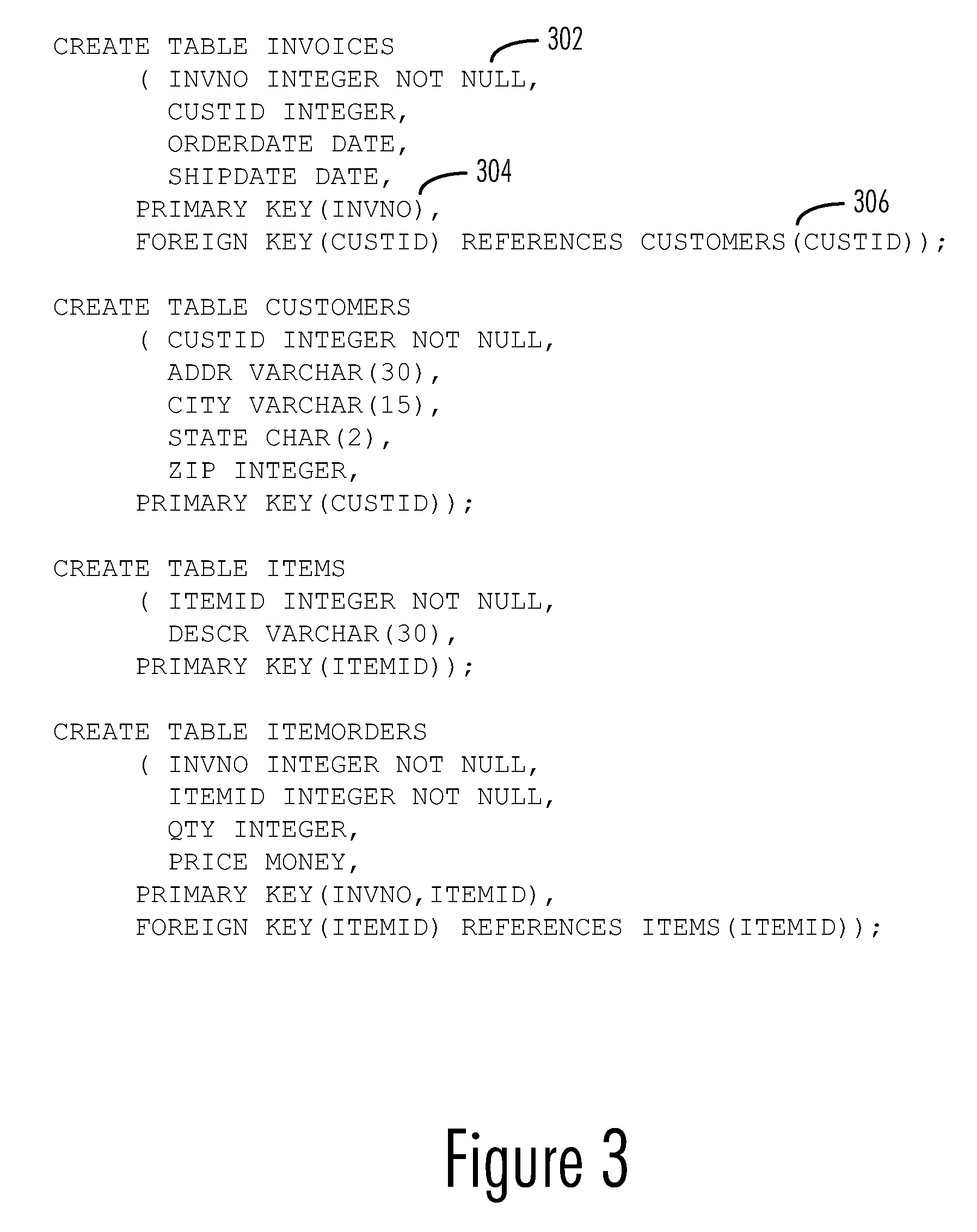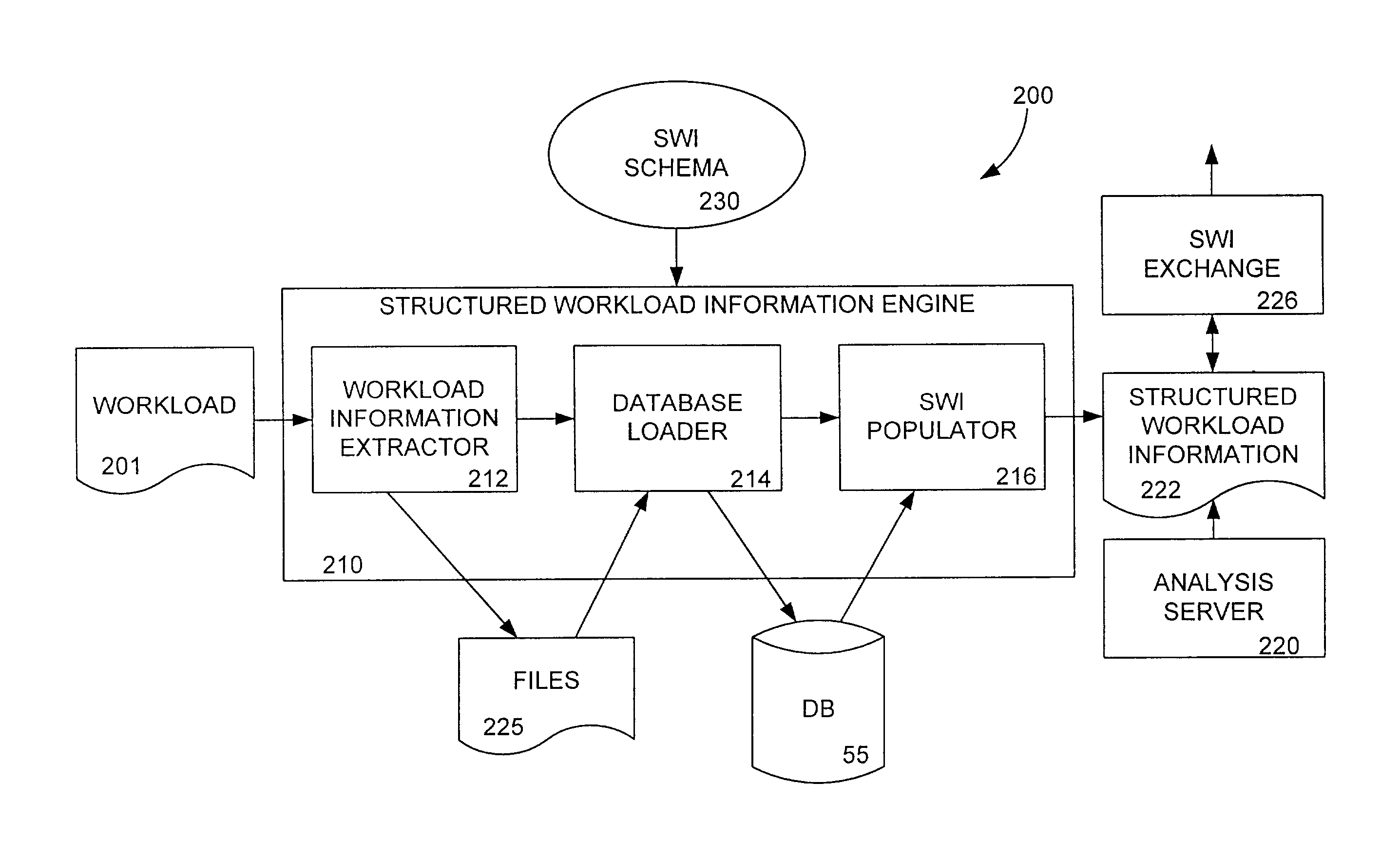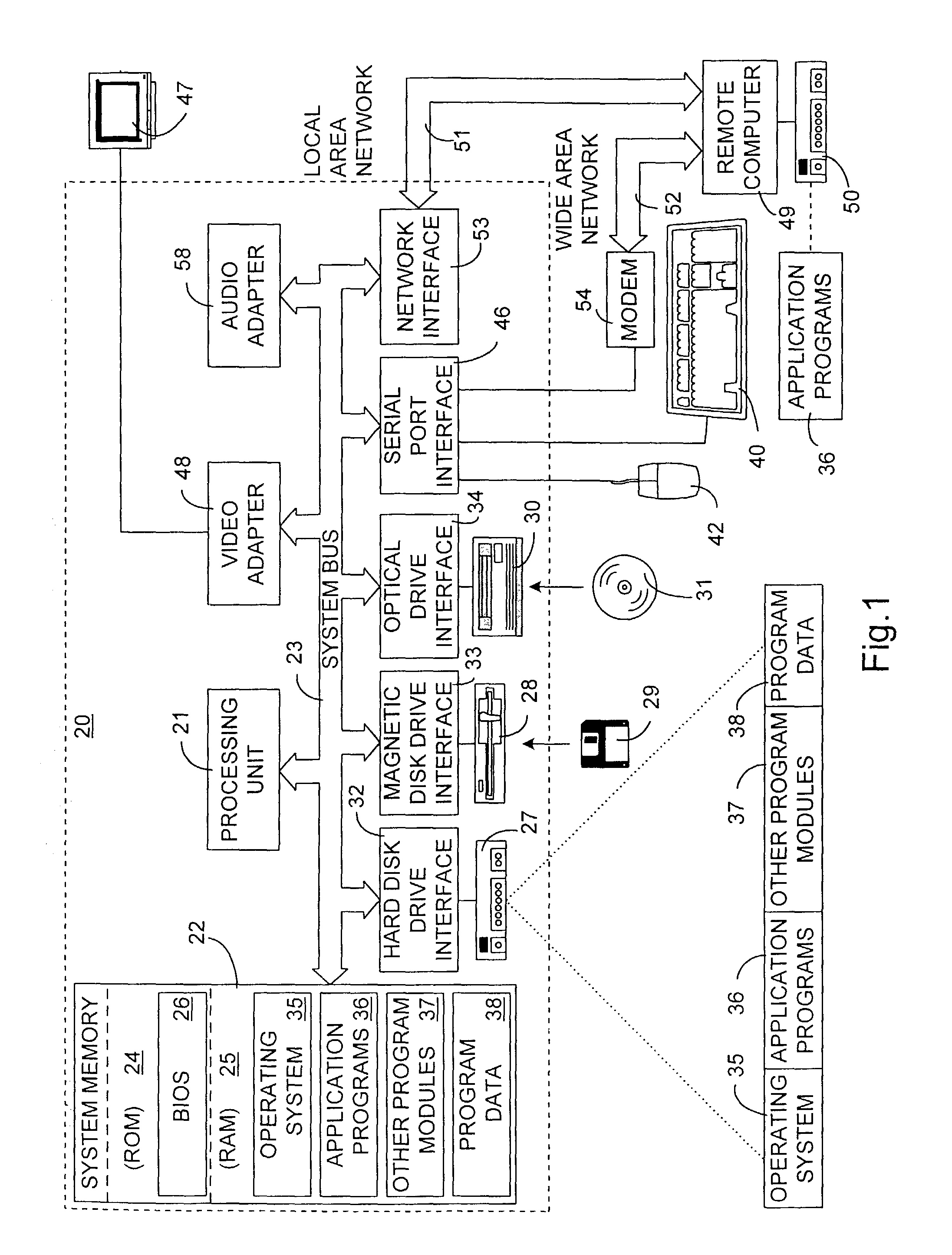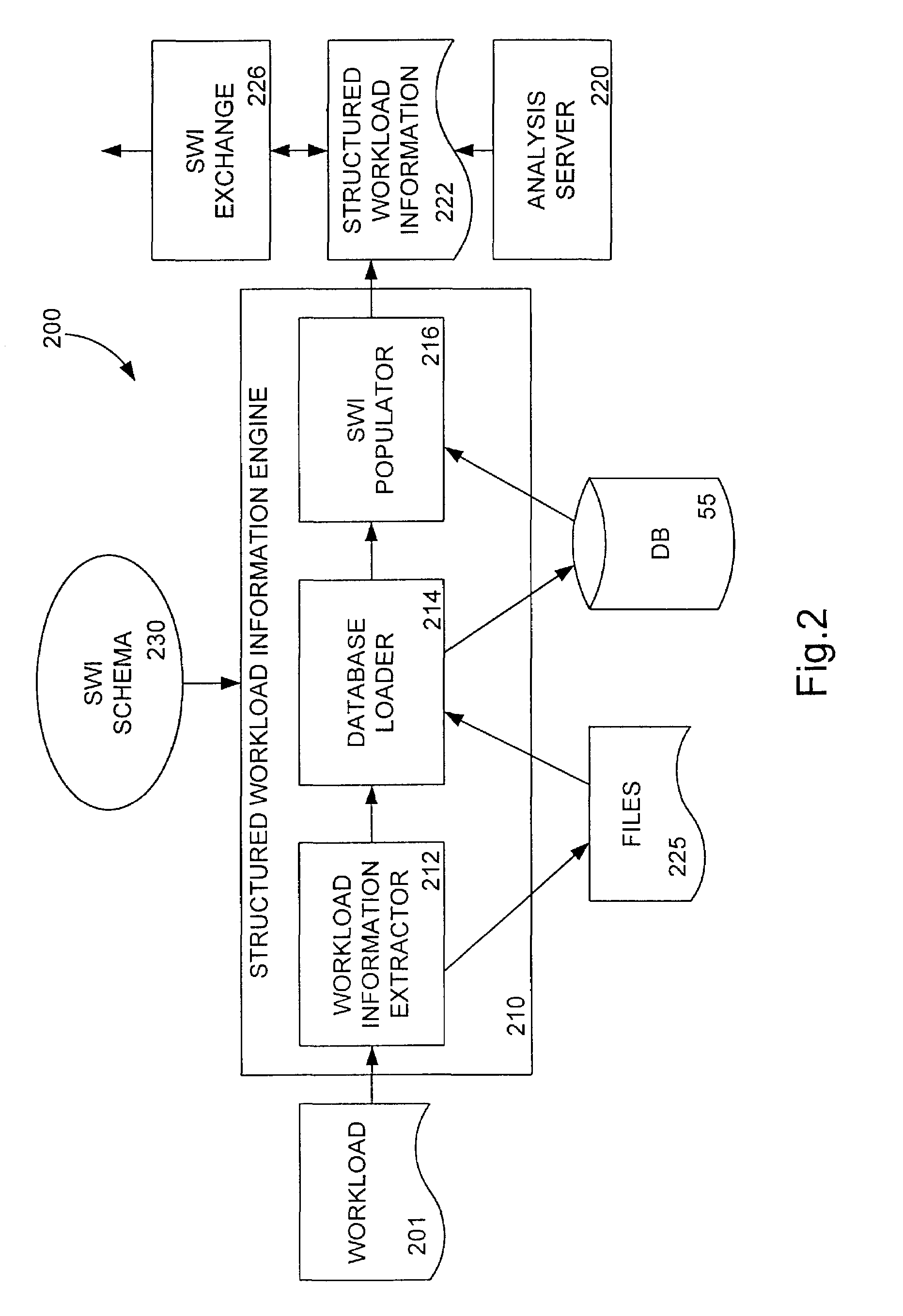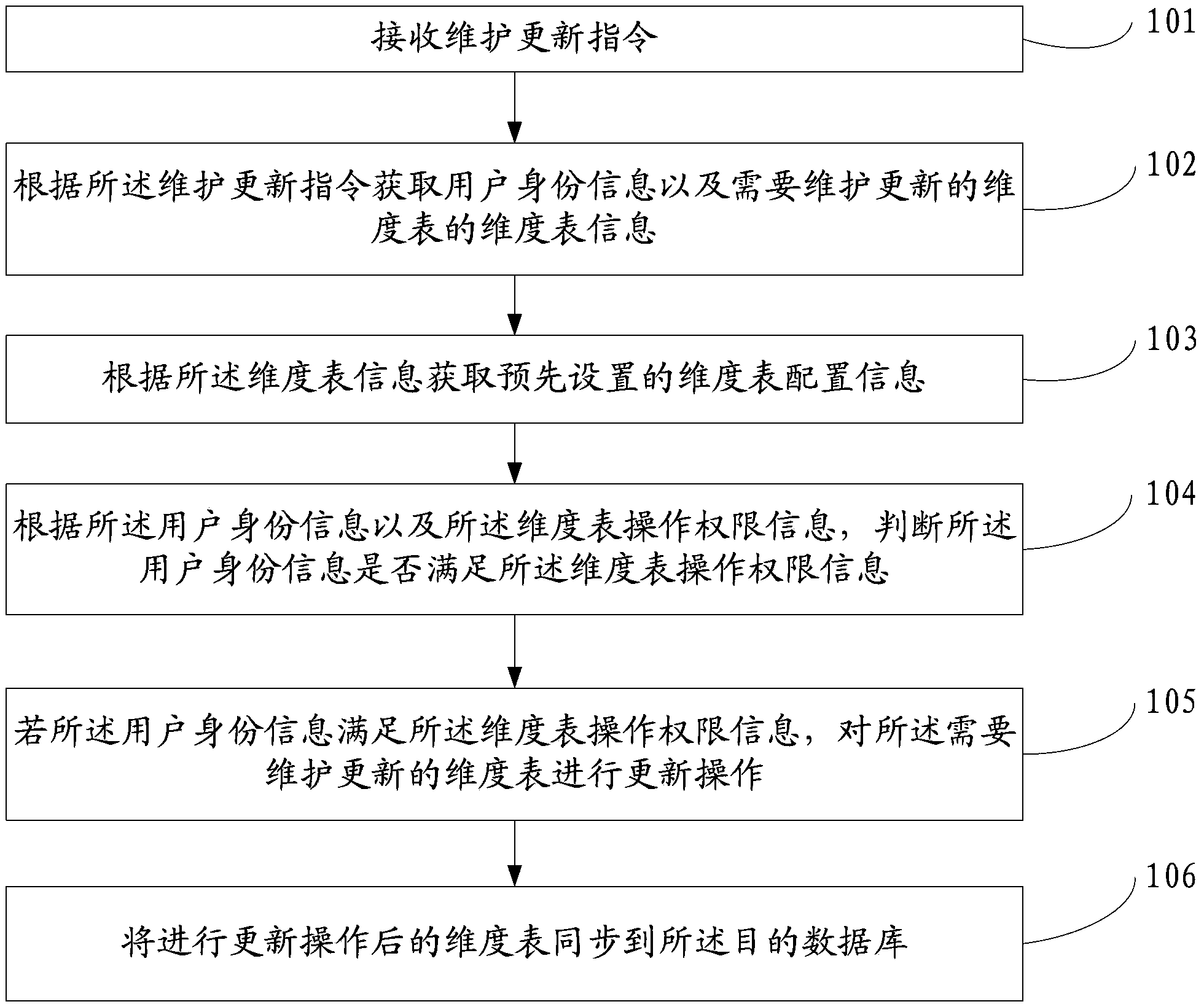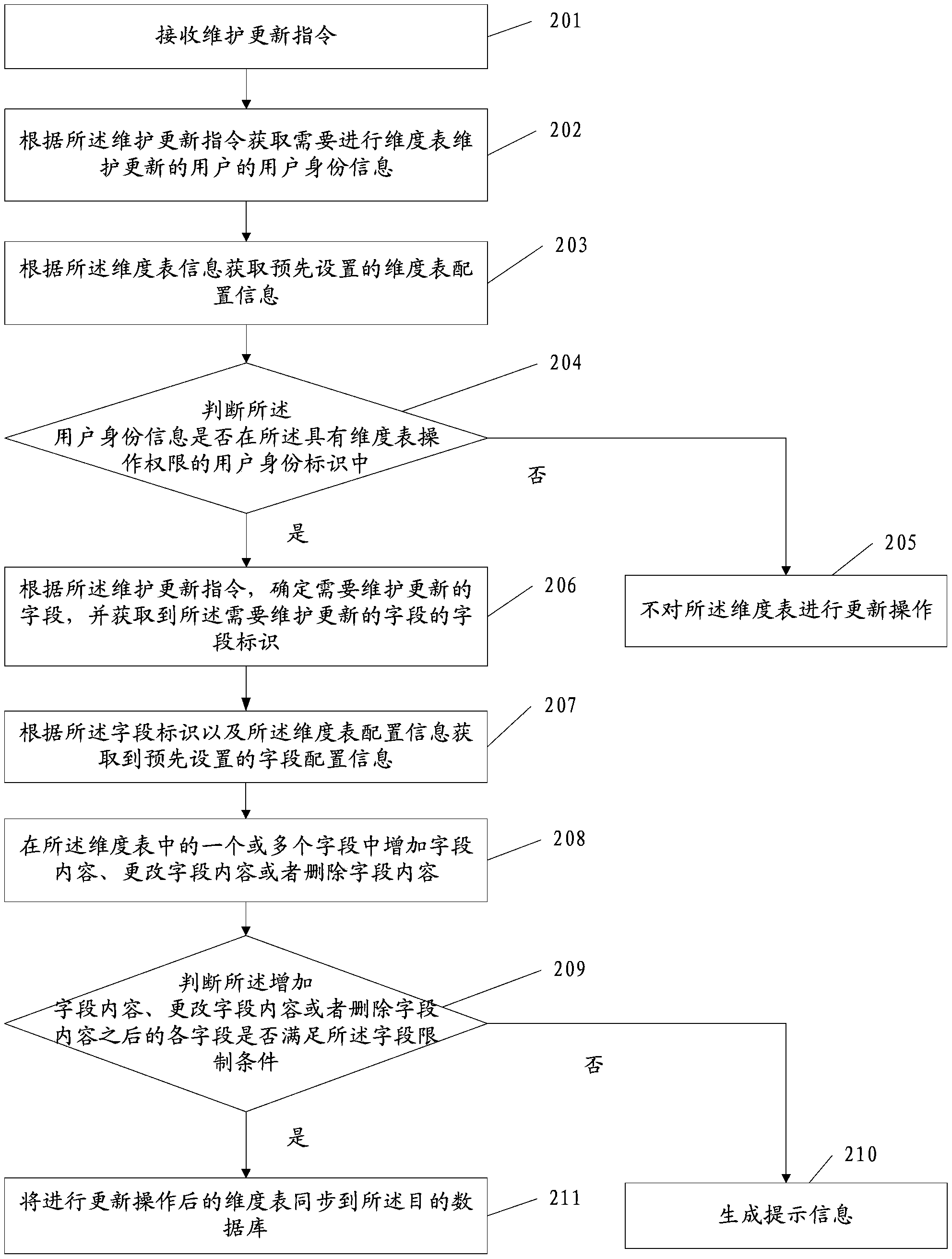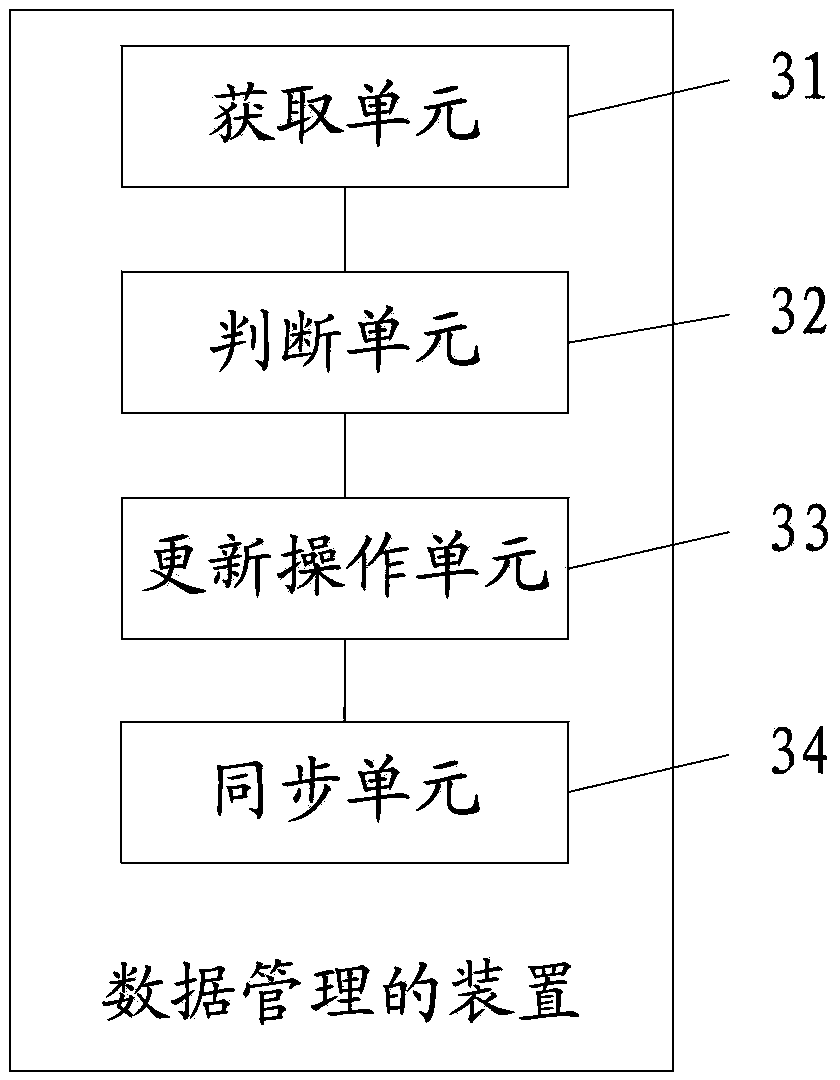Patents
Literature
337 results about "Dimension table" patented technology
Efficacy Topic
Property
Owner
Technical Advancement
Application Domain
Technology Topic
Technology Field Word
Patent Country/Region
Patent Type
Patent Status
Application Year
Inventor
In data warehousing, a dimension table is one of the set of companion tables to a fact table. The fact table contains business facts, and foreign keys which refer to candidate keys in the dimension tables. Contrary to fact tables, dimension tables contain descriptive attributes that are typically textual fields. These attributes are designed to serve two critical purposes: query constraining and/or filtering, and query result set labeling. Dimension attributes should be: Verbose Descriptive Complete Discretely valued Quality assured Dimension table rows are uniquely identified by a single key field. It is recommended that the key field be a simple integer because a key value is meaningless, used only for joining fields between the fact and dimension tables. Dimension tables often use primary keys that are also surrogate keys. Surrogate keys are often auto-generated.
Ultra-shared-nothing parallel database
ActiveUS20050187977A1Reduce processEfficient and reliableDigital data information retrievalDigital data processing detailsData miningParallel processing
An ultra-shared-nothing parallel database system includes at least one master node and multiple slave nodes. A database consisting of at least one fact table and multiple dimension tables is partitioned and distributed across the slave nodes of the database system so that queries are processed in parallel without requiring the transfer of data between the slave nodes. The fact table and a first dimension table of the database are partitioned across the slave nodes. The other dimension tables of the database are duplicated on each of the slave nodes and at least one of these other dimension tables is partitioned across the slave nodes.
Owner:MICROSOFT TECH LICENSING LLC
Method and apparatus for creating a datamart and for creating a query structure for the datamart
InactiveUS6189004B1Data processing applicationsMulti-dimensional databasesUser interfaceDimension table
A method for automatically defining a query interface for a datamart is described. The datamart includes fact and dimension tables. The method comprises accessing a schema description and a query interface description for the datamart. The schema description specifies a schema, which in turn, defines the relationships between the fact tables and dimension tables of the datamart. The query interface description specifies the fields, related to the schema description, that can be used in a query and the way in which results are to be presented to the user. The fields correspond to columns and rows in the fact tables. The schema description is used to create a first set of commands to create and populate the fact and dimension tables. Additionally, a second set of commands to create the query interface is created. Some commands of the first set of commands are executed causing the creation and population of the tables. Some commands of the second set of commands are executed causing the creation of a user interface. A query is generated using the user interface. The query is sent to the system for processing. The results of the query are presented to the user according the second set of commands.
Owner:COMDISCO
System and method for selecting rows from dimensional databases having temporal dimention
InactiveUS6233573B1Data processing applicationsDigital data information retrievalEffective timeDimension table
A system and method selects rows from a fact table in a dimensional database containing a fact table, a time dimension table and other dimension tables. The other dimension tables each contain rows containing a time invariant attribute to identify an item described by the row, an effective time attribute for the row, and other attributes. If an attribute for an item changes, a new row is added to the dimension table containing the time-invariant attribute for the item and current attributes for the item, without deleting or overwriting any existing rows for that item. Such dimension tables can be selected or used to create other tables using one or more time attributes of the dimension tables. The tables created can be selected or used to create still other tables using one or more time attributes of those tables. One or more of the resulting tables or one or more tables created from a resulting table are then joined to a table in the dimensional database or a table created from a table in the dimensional database.
Owner:AMAZON TECH INC
Data partitioning method for distributed parallel database system
ActiveCN101916261APartially completeAvoid time-consuming network transmissionDigital data information retrievalSpecial data processing applicationsData setData stream
The invention discloses a data partitioning method for a distributed parallel database system. The method comprises the following steps of: establishing a fact table and a dimension table according to the constructed distributed parallel database system; inserting records of the dimension table and the fact table on different nodes according to a partitioning rule; copying the records of the dimension table to the nodes of the fact table; and deleting and updating the data. When a data set or data stream is imported or inserted into the distributed database system in a partitioning way, the relation between tables defined by a database schema can be met on each node, particularly the primary key-foreign key restrictive condition, so the data on each node has local completeness of the data. For the query processing on the connection between the tables by using the primary key-foreign key restrictive condition, the data of each node has the local completeness on the query, so dynamic repartitioning of data between the nodes is not needed; and thus the method has the advantages of preventing time-consuming network transmission of the data, shortening the query response time and improving the query efficiency.
Owner:BORQS BEIJING +2
Mapping of an RDBMS schema onto a multidimensional data model
InactiveUS7181440B2Functional dependencyEasy to createData processing applicationsDigital computer detailsRelational modelMultidimensional data
A Relational Database Management System (RDBMS) having any arbitrary structure is translated into a multi-dimensional data model suitable for performing OLAP operations upon. If a relational table defining the relational model includes any tables with cardinality of 1,1 or 0,1, the tables are merged into a single table. If the relational table is not normalized, then normalization is performed and a relationship between the original table and the normalized table is created. If the relational table is normalized, but not by dependence between columns, such as in the dimension table in a snowflake schema, the normalization process is performed using the foreign key in order to generate the normalized table. Once the normalized table is generated, OLAP measures are derived from the normalized relational table by an automated method. In addition, OLAP dimensions are derived from the normalized relational table and the results of the OLAP measures derivation by an automated method according to the present invention. According to an aspect, it is possible to associate a member of a dimension to another member of the same or another dimension. According to another aspect, it is possible to create a new dimension of analysis, the members of which are all the different values that a scalar expression can take on. According to yet another aspect, it is possible to access the various instances of a Reporting Object as members in an OLAP dimension. According to the yet another aspect, it is possible to apply opaque filters or a combination of them to the data that underlies analysis.
Owner:BUSINESS OBJECTS SOFTWARE
System and method for automatically building an OLAP model in a relational database
ActiveUS7716167B2Efficiently and quickly and automatically createEliminate needData processing applicationsDigital data processing detailsData setRelational database
A system automatically generates OLAP metadata objects for a multidimensional analysis program such as OLAP from SQL statements without involving the database administrator, and eliminates the need for database administrators to manually perform this analysis and design. The system deconstructs a set of SQL statements into tables and aggregates metrics for measures and joins. It recognizes that the relational database structure contains both dimension tables and fact tables. Over many SQL statements, fact tables will have a large measure metric while dimension tables will have a low measure metric. Tables are linked based on large join metrics; small join metrics are ignored. The present system builds the OLAP cube model from the fact tables, dimension tables, and joins. The analysis of the SQL statements allows the system to map the hierarchies within the dimension table, and provides the system with information about attribute relationships and cubes.
Owner:GREEN MARKET SQUARE LTD
Performance of table insertion by using multiple tables or multiple threads
InactiveUS6665682B1Robust calculationImprove performanceData processing applicationsMulti-dimensional databasesRelational databaseData memory
A method, apparatus, and article of manufacture for improved performance of table insertion by using multiple tables or multiple threads. A command is executed in a computer to perform a database operation on a relational database stored on a data store connected to the computer. A multi-dimensional database is represented as a relational schema in the relational database, wherein the relational schema includes one or more base tables, related dimension tables, and a key table. Each of the base tables and the key table is accessed concurrently to perform the database operation.
Owner:IBM CORP
Multi-dimensional OLAP (On Line Analytical Processing) inquiry processing method facing column storage data warehouse
ActiveCN102663116AReduce complexityImprove performanceSpecial data processing applicationsSurrogate keyGroup operation
The invention discloses a multi-dimensional OLAP (On Line Analytical Processing) inquiry processing method facing a column storage data warehouse. In the multi-dimensional OLAP inquiry processing method, the OLAP inquiry is decomposed into a bitmap filtering operation, a grouping operation and an aggregation operation. In the bitmap filtering operation, firstly, the predication is executed on a dimension table and a predicate vector bitmap is generated; and a connection operation is converted into a direct dimension table record access operation by surrogate key address mapping so as to implement access according to the positions. In the grouping operation, the pre-generation of grouping units is carried out on fact table records which meet the filtering conditions according to grouping attributes in an SQL (Structured Query Language) command and increasing IDs (identity) are distributed. In the aggregation operation, the grouping aggregation calculation which is carried out according to a grouping item of a grouping filtering vector of a fact table is implemented by carrying out column scanning on the metric attribute of the fact table for once. According to the invention, all OLAP processing tasks can be completed only by carrying out column scanning on the fact table for once, so that the cost of repeatedly scanning is avoided.
Owner:RENMIN UNIVERSITY OF CHINA
Method and apparatus for synchronizing cache with target tables in a data warehousing system
InactiveUS6895471B1Increase speedReduce loadDatabase updatingData processing applicationsData warehouseData set
A method and apparatus for processing (transporting) data, such as in a data warehouse system. In one embodiment, the data are received from a source and compared to data in a lookup cache comprising a subset of data from a first data set (e.g., a dimension table). Instances of the data not present in a lookup cache (that is, new data) are identified. Information corresponding to these instances are generated (e.g., a unique identifier is associated with each of these instances), and the first data set is updated accordingly. The lookup cache is then updated with the new data and the unique identifiers. Accordingly, the information (data) in the lookup cache and in the first data set are in synchronization. The lookup cache does not need to be rebuilt (e.g., to update a second data set such as a fact table).
Owner:INFORMATICA CORP
Mapping of an RDBMS schema onto a multidimensional data model
InactiveUS20050015360A1Functional dependencyEasy to createData processing applicationsDigital data processing detailsSnowflake schemaRelational model
A Relational Database Management System (RDBMS) having any arbitrary structure is translated into a multi-dimensional data model suitable for performing OLAP operations upon. If a relational table defining the relational model includes any tables with cardinality of 1,1 or 0,1, the tables are merged into a single table. If the relational table is not normalized, then normalization is performed and a relationship between the original table and the normalized table is created. If the relational table is normalized, but not by dependence between columns, such as in the dimension table in a snowflake schema, the normalization process is performed using the foreign key in order to generate the normalized table. Once the normalized table is generated, OLAP measures are derived from the normalized relational table by an automated method. In addition, OLAP dimensions are derived from the normalized relational table and the results of the OLAP measures derivation by an automated method according to the present invention. According to an aspect, it is possible to associate a member of a dimension to another member of the same or another dimension. According to another aspect, it is possible to create a new dimension of analysis, the members of which are all the different values that a scalar expression can take on. According to yet another aspect, it is possible to access the various instances of a Reporting Object as members in an OLAP dimension. According to the yet another aspect, it is possible to apply opaque filters or a combination of them to the data that underlies analysis.
Owner:BUSINESS OBJECTS SOFTWARE
Task scheduling method and system
ActiveCN102981904APerfect task scheduling systemImprove scheduling efficiencyProgram initiation/switchingProgram planningResult list
The invention provides a task scheduling method and a system and aims at solving the problem of limitation of a system in task scheduling. The task scheduling method includes the following steps. Firstly, a task which is mature based on a set time are selected and designated as a postposed task. Plan performing time of a preposed task is calculated through a task scheduling reliance dimension table of the postposed task and a task sequence number of the preposed task is read from the task scheduling reliance dimension table. A performing state of the preposed task in a task scheduling operation result list is found out according to the task sequence number and the plan performing time of the preposed task. If performing is successful, the postposed task is lined up in a task queue and waits for scheduling performing. Under all circumstances, as long as a postposed task is confirmed, a preposed task can be found out and the postposed task can be performed as the preposed task is successfully performed so that the task scheduling system is modified. Scheduling time is shortened, scheduling efficiency is improved and fault rate is reduced.
Owner:ALIBABA GRP HLDG LTD
Automated latent star schema discovery tool
InactiveUS7856416B2Digital data processing detailsMulti-dimensional databasesStar schemaData processing system
A method, computer program product, and data processing system for computer-aided design of multidimensional data warehouse schemas are disclosed. A preferred embodiment of the present invention provides a software tool for identifying a latent star schema structure within an existing database. This software tool performs a heuristic analysis of the existing database schema to locate potential keys and measurement fields. Database tables within the existing schema are scored heuristically as to their suitability as fact tables based on the key candidates and measurement fields. For each fact table, other tables from the existing schema are identified as possible dimension tables. Data from the database is then used to test the suitability of the fact tables and dimension tables. The identified fact tables and their associated dimension tables are then reported to the user to reveal a basic star schema structure, which can be used as a basis for further design.
Owner:LINKEDIN
Data correlation query method and data correlation query device
ActiveCN102521416AGuaranteed scalabilityGuaranteed reusabilitySpecial data processing applicationsDatasheetExecution unit
The invention provides a data correlation query device and a data correlation query method. The data correlation query device comprises a data acquisition unit, an SQL (structured query language) execution unit, a cache number-picking formula construction unit and a cache execution unit. The data acquisition unit is used for obtaining a fundamental field of a fact table and selecting a field of a dimension table based on the fundamental field to be used as an correlation field for correlation of the fact table and the dimension table; and the SQL execution unit is used for implementing query operations through SQL statements based on the fundamental field and a datasheet with the fundamental field, and obtaining a result set; the cache number-picking formula construction unit is used for obtaining a main key value corresponding to the correlation field from the result set, and constructing a cache number-picking formula in combination with a data path with the correlation field; and the cache execution unit is used for obtaining the value of the correlation field according to the cache number-picking formula and combining the value of the correlation field and the result set to obtain final query results. The fact table and the dimension table can be associated efficiently, results can be implemented efficiently, the fatal pressure on the system caused by correlation query of the fact table and the dimension table with a large number of data can be avoided, and the efficiency can be improved.
Owner:YONYOU NETWORK TECH
Optimization of a star join operation using a bitmap index structure
InactiveUS6618729B1Data processing applicationsMulti-dimensional databasesRelational database management systemComputer science
A method, apparatus, and article of manufacture for optimizing a star join operation in relational database management systems (RDBMS). A cross-product is generated from a plurality of dimension tables referenced by the star join. The join columns of the cross-product are then hashed to create a hash-row value. Using the hash-row value, a Star Map is probed to determine whether a record exists in a fact table that corresponds to the cross-product, wherein a first portion of the hash-row value is used to select a row of the Star Map and a second portion of the hash-row value is used to select a column of the selected row of the Star Map. The fact table is accessed to perform a merge join with the cross-product when the selected column of the selected row of the Star Map indicates that the record exists in the fact table.
Owner:TERADATA US
Method of managing slowly changing dimensions
InactiveUS6847973B2Data processing applicationsMulti-dimensional databasesSlowly changing dimensionData mart
A method of managing slowly changing dimensions in a dimensional database, such as a dimensional data mart, is disclosed. The method consists of providing a dimension template for each dimension undergoing slow changes, which template assigns a behavior to each column of the dimension table. When a row of dimensional data is to be delivered to the dimension table, the table is searched for a record having the key value of the row of data to be delivered. If such a record exists and if any attributes of the row to be delivered have their values changed compared with the existing record, the table is updated according to the behavior type assigned to these attributes in the dimension template, either by overwriting the existing record with the record to be delivered or by creating a new record or records.
Owner:IBM CORP
Multi-Dimensional OLAP Query Processing Method Oriented to Column Store Data Warehouse
ActiveUS20130275365A1Improve I/O performanceReduce complexityDigital data processing detailsMulti-dimensional databasesOne passSurrogate key
A multi-dimensional OLAP query processing method oriented to a column store data warehouse is described. With this method, an OLAP query is divided into a bitmap filtering operation, a group-by operation and an aggregate operation. In the bitmap filtering operation, a predicate is first executed on a dimension table to generate a predicate vector bitmap, and a join operation is converted, through address mapping of a surrogate key, into a direct dimension table tuple access operation; in the group-by operation, a fact table tuple satisfying a filtering condition is pre-generated into a group-by unit according to a group-by attribute in an SQL command and is allocated with an increasing ID; and in the aggregate operation, group-by aggregate calculation is performed according to a group item of a fact table filtering group-by vector through one-pass column scan on a fact table measure attribute.
Owner:RENMIN UNIVERSITY OF CHINA
Method and apparatus for eliminating partitions of a database table from a join query using implicit limitations on a partition key value
InactiveUS20070027860A1Significant comprehensive benefitsAvoid overheadDigital data information retrievalSpecial data processing applicationsStar schemaTable (database)
A database facility supports database join queries in a database environment having at least one database table divided into multiple partitions based on a partition key value. The facility determines whether the values in a table joined to the partitioned table place an implicit limitation on the partition key, and eliminates from query evaluation any partitions which do not satisfy the implicit limitation. Preferably, the database uses a star schema organization, in which implicit limitations in a relatively small dimension table are used to eliminate partitions in a relatively large fact table.
Owner:IBM CORP
Techniques for transforming and loading data into a fact table in a data warehouse
ActiveUS20090281985A1Easy to transformDigital data processing detailsMulti-dimensional databasesData warehouseDimension table
Techniques for transforming records prior to loading the records into a data warehouse in an efficient manner. In one embodiment, instead of using lookup transformations, a database operation such as an outer join operation is used to transform records stored in a fact staging table to add foreign keys to the records corresponding to the dimension tables that are associated with a fact table in a data warehouse to which the records are to be loaded. Since the outer join operation is memory intensive, a determination is made as to which dimension tables from the multiple dimension tables associated with the fact table are suitable, from a performance perspective, for the outer join operation. Only those suitable dimension tables are outer joined to the fact staging table to add the foreign keys for the outer joined dimension tables to the fact staging table records. Lookup transformations may be used to add foreign keys to the fact staging table records for the non-suitable dimension tables. The transformed fact records with the foreign keys may then be loaded into the fact table in the data warehouse.
Owner:ORACLE INT CORP
Imaging analysis system and imaging analysis method of data model
ActiveCN103106188ARealize visual analysisSpecial data processing applicationsGraphicsImaging analysis
The invention provides an imaging analysis system of a data model. The imaging analysis system of the data model is used for carrying out analysis processing of data models in an online analytical processing system. The imaging analysis system of the data model comprises a model acquisition unit, a model analysis unit, an identification generation unit and a model generation unit, wherein the model acquisition unit is used for acquiring the built data model, the model analysis unit is used for analyzing a fact table, a dimension table and an incidence relation between the fact table and the dimension table according to the building mode of the data model, wherein the fact table and the dimension table correspond to the data model, and the identification generation unit is used for respectively generating pixel identifications which correspond to the fact table, the dimension table and the incidence relation, the model generation unit is used for using all pixel identifications to generate a pixel model so as to display the pixel model. The invention further provides an imaging analysis method of the data model. According to the technical scheme of the imaging analysis system of the data model and the imaging analysis method of the data model, parts of entities in the data model and incidence relations among the entities can be described, and meanwhile the imaging analysis system of the data model and the imaging analysis method of the data model also can carry out retrospect analysis of sources of data models based on an image described, and thus visualized analysis of the data models is achieved.
Owner:YONYOU NETWORK TECH
Date and time dimensions for contact center reporting in arbitrary international time zones
ActiveUS20070201311A1Small sizeVisual indicationElectric indicationTemporal informationContact center
In one embodiment, a computer readable medium is provided that includes a date time zone dimension table comprising a date key and a time zone key, the date key identifying a selected point in time relative to a selected temporal origin and the time zone key identifying one of a plurality of possible time zones, and at least one attribute, the at least one attribute describing time information for a selected date and time zone key pair.
Owner:AVAYA INC
Data processing method and data processing system
InactiveCN103853820AImprove processing efficiencyImprove efficiencySpecial data processing applicationsData processing systemOriginal data
The invention discloses a data processing method and a data processing system. The data processing method comprises the following steps: firstly, storing original data to a theme table, and recording codes and names of dimensions which need to generate a dimension table in the theme table; then, generating the corresponding dimension table according to the codes and the names, recorded in the theme table, of the dimensions; storing corresponding dimension table data to the dimension table, and generating the dimension ID of each dimension; generating a fact table related to the dimension table from the theme table according to the dimension ID of each dimension; storing corresponding fact table data into the fact table; finally, generating an application summary table from the fact table as needed to obtain application summary data, and storing to the application summary table. According to the method and the system, by adding the theme table and the application summary table in a data processing cycle, the data can be repeatedly utilized based on the theme table; through derived dimension-supported calculation, the conversion of a data analysis aperture is realize, and the data processing efficiency and the practicability of processed data are effectively improved.
Owner:北京用友政务软件股份有限公司
Populating a database using inferred dependencies
InactiveUS20050004918A1Relational databasesSpecial data processing applicationsDimension tableDatabase
Populating a database, including providing a database having a schema; inferring from the schema dependencies among a fact table and related dimension tables; and inserting, in accordance with the dependencies, rows of data into the fact table and rows of data into the dimension tables. In typical embodiments, inferring dependencies further comprises selecting from metadata describing a schema for the database expressions of dependencies and inserting the expressions of dependencies into a dependency list. In typical embodiments, wherein inserting rows of data further comprises determining whether related dimension data exists for each foreign key in each row of data inserted into the fact table and for each foreign key for which related dimension data does not exist, inserting a row of dimension data into a dimension table related to the fact table through the foreign key.
Owner:IBM CORP
Ultra-shared-nothing parallel database
ActiveUS7818349B2Improve system performanceReduce network trafficDigital data information retrievalDigital data processing detailsData miningParallel processing
An ultra-shared-nothing parallel database system includes at least one master node and multiple slave nodes. A database consisting of at least one fact table and multiple dimension tables is partitioned and distributed across the slave nodes of the database system so that queries are processed in parallel without requiring the transfer of data between the slave nodes. The fact table and a first dimension table of the database are partitioned across the slave nodes. The other dimension tables of the database are duplicated on each of the slave nodes and at least one of these other dimension tables is partitioned across the slave nodes.
Owner:MICROSOFT TECH LICENSING LLC
Memory database OLTP and OLAP concurrency query optimization method
ActiveCN103942342AIncrease the probability of concurrent access conflictsEasy to handleMulti-dimensional databasesSpecial data processing applicationsData compressionArray data structure
The invention relates to a memory database OLTP and OLAP concurrency query optimization method. The method includes the steps that (1) by means of two query processing engines, independent storage engines are adopted to a dimension table and a fact table; (2) the dimension table is updated through an embedded concurrency control mechanism of the independent storage engines, the fact table is equivalent to multiple continuous arrays in logic and maintains two dynamic data structures, namely a read record pointer and a write record pointer, the read record pointer records the position of the last record inquired through OLPA currently, and the write record pointer records the insert position of a new record; (3) an OLTP transactional queue and an OLAP transactional queue are independently executed with the read pointer and the write pointer as boundaries, the fact table adopts a column storage horizontal fragmentation model based on the fixed number of columns, N columns of storage records serve as an independent column storage container, and each column storage container adopts an independent data compression mechanism; (4) an access function on compressed data or non-compressed data is provided through access interfaces of the column storage containers when OLAP query has access to the column storage containers.
Owner:RENMIN UNIVERSITY OF CHINA
Advertising intelligent recommendation method, server and storage medium
ActiveCN108776907AAchieve advertising effectAdvertisementsEnergy efficient computingData dimensionDimension table
The present invention provides an advertising intelligent recommendation method. The method comprises the steps of: collecting historical behavior data of all the users, classifying the historical behavior data of all the users, generating a user portrait data dimension table in different dimensions, and making corresponding feature tags for the users according to a corresponding relation of different historical behavior data and the user portrait data dimension table in different dimensions; employing a preset screening rule to perform screening of an advertising to be put according to the user feature tags and an advertising preset condition, and obtaining a candidate advertising set; and finally, performing statistics of the real-time behavior data of all the users, employing a preset scoring formula to perform scoring of the candidate advertising in the candidate advertising set, performing descending sort, and giving priority to recommend the advertisings ranking higher to the users. The advertising intelligent recommendation method can recommend advertisings for the users so as to improve the advertising input accuracy. The present invention further provides an advertising intelligent recommendation device and a storage medium.
Owner:KANG JIAN INFORMATION TECH (SHENZHEN) CO LTD
Multidimensional online analytical processing (MOLAP)-based data processing method and apparatus
ActiveCN106484875ASimplify the data query processImprove query response speedMulti-dimensional databasesSpecial data processing applicationsMOLAPOpen source
The present invention discloses a multidimensional online analytical processing (MOLAP)-based data processing method and apparatus. The data processing method comprises the steps of creating a data cube according to a fact table and a dimension table; performing data pre-calculation on all possible combinations of dimensions according to data recorded in the data cube; and storing a pre-calculation result in an open-source database, so as to determine an inquire result according to the pre-calculation result in inquiry. Through adoption of the method, the existing data inquiry solution can be optimized, and non-technical staff can inquire in massive data.
Owner:GUANGZHOU SHIYUAN ELECTRONICS CO LTD
Method and system for optimizing snow flake queries
InactiveUS20050065939A1Data processing applicationsMulti-dimensional databasesStar schemaRelational database
A method and system for optimizing a query in a snow flake schema (60) within a relational database. The schema (60) includes a fact table (12) and multiple dimension tables and a plurality of dimension levels, with at least one dimension table at each level. A logical node (310) comprised of a level one child dimension table (32) and all dimension tables (62) rooted at this level one child dimension table is created based upon the cumulative selectivity calculation for all of the dimension tables at each level of the database (210). Creation of the logical node reduces a snow flake schema to a star schema, thereby mitigating search space traversal.
Owner:IBM CORP
Automated Latent Star Schema Discovery Tool
InactiveUS20090265335A1Multi-dimensional databasesSpecial data processing applicationsData processing systemStar schema
A method, computer program product, and data processing system for computer-aided design of multidimensional data warehouse schemas are disclosed. A preferred embodiment of the present invention provides a software tool for identifying a latent star schema structure within an existing database. This software tool performs a heuristic analysis of the existing database schema to locate potential keys and measurement fields. Database tables within the existing schema are scored heuristically as to their suitability as fact tables based on the key candidates and measurement fields. For each fact table, other tables from the existing schema are identified as possible dimension tables. Data from the database is then used to test the suitability of the fact tables and dimension tables. The identified fact tables and their associated dimension tables are then reported to the user to reveal a basic star schema structure, which can be used as a basis for further design.
Owner:LINKEDIN
Workload analysis tool for relational databases
ActiveUS7281013B2Improve practicalityData processing applicationsDigital data processing detailsXML schemaAnalysis data
A method for providing workload information in a structured workload information data structure format that is organized according to a workload schema to be conducive to a given end usage of the information. The structured workload information can be made accessible using standard database analytical server applications to facilitate ad-hoc querying of the structured workload information to summarize and analyze the database workload or to facilitate exchange of workload information. A structured workload information (SWI) is constructed according to a SWI schema to facilitate a desired end usage of the workload information. The query information is extracted from the workload and stored in a structured workload information (SWI) data structure according to the schema based on the desired end usage of the information such as ad hoc querying or information exchange. The query information may be stored in a relational database having query information organized as a central fact table and a collection of hierarchical dimension tables or as an OLAP cube featuring hierarchical dimensions that arrange the query information in dimensions having objects ordered as a function of granularity or the information may be stored according to an XML schema wherein units of query information are separated by XML tags that identify a type of workload information.
Owner:MICROSOFT TECH LICENSING LLC
Data management method and device
ActiveCN104252452AImprove securityDatabase updatingSpecial data processing applicationsData managementAuthorization
The embodiment of the invention discloses a data management method and device, relates to the technical field of computers, and aims to solve the problems of slow current maintenance and update processes of a dimension table and low safety. The method comprises the following steps: receiving a maintenance and update command; acquiring user identity information and dimension table information of the dimension table needing to be maintained and updated according to the maintenance and update command; acquiring preset dimension table configuration information according to the dimension table information, wherein the dimension table configuration information comprises a source database in which the dimension table is positioned, a target database of which the dimension table needs to be synchronized, and dimension table operation authorization information; judging whether the user identity information satisfies the dimension table operation authorization information or not according to the user identity information and the dimension table operation authorization information; if the user identity information satisfies the dimension table operation authorization information, updating the dimension table needing to be maintained and updated, and synchronizing the updated dimension table to the target database. The method and the device are suitable for data management of the dimension table.
Owner:TENCENT TECH (SHENZHEN) CO LTD +1
Features
- R&D
- Intellectual Property
- Life Sciences
- Materials
- Tech Scout
Why Patsnap Eureka
- Unparalleled Data Quality
- Higher Quality Content
- 60% Fewer Hallucinations
Social media
Patsnap Eureka Blog
Learn More Browse by: Latest US Patents, China's latest patents, Technical Efficacy Thesaurus, Application Domain, Technology Topic, Popular Technical Reports.
© 2025 PatSnap. All rights reserved.Legal|Privacy policy|Modern Slavery Act Transparency Statement|Sitemap|About US| Contact US: help@patsnap.com
